Empowering People
Issue 12 Winter 2022

















































































Haffmans QC Equipment In-line, At-line, Laboratory, Packaging & Monitoring • Reliable & comparable measuring results • Reduced product loss & faster reaction time • Consistent product quality • Increased process efficiency • Accurate measurement of: air, CO2, O2, N2, TPO, foam and turbidity FOODANDBEVERAGE.PENTAIR.COM Phone: +44 (0) 1905 797 280 Email: Sales.uk@pentair.com Understanding Quality. FOR LIFE.
It’s been another yo-yo of a year – politically, financially and climatically – and as we look ahead to 2023 we can but hope for more stability just over the horizon.
Whether we have yet achieved the ‘new normal’, that was much lauded this time last year as we shook off the last of the Covid restrictions, remains up for debate. But what does it all mean for independent brewers?


Business planning, at least for more than a few weeks at a time in the current climate, remains extremely difficult.
But speaking to SIBA Members recently, it always strikes me how calm you all are in the face of the myriad of challenges being thrown at you. With the alcohol duty freeze cancelled and the new draught duty rate delayed, two potential lifelines have been whipped away in the short term, and while we await more detail of Prime Minister Rishi Sunak’s plans for next
Welcome to the Winter edition of SIBA’s Independent Brewer Magazine
year, we can only hope for some more positive news for small brewers across the country.

At times like these, SIBA’s lobbying work becomes more important than ever. The recent addition of a new Public Affairs and Policy Officer, Will Lockwood (find out more about him in our Meet the Team section on page 15) to the SIBA team could not have come at a better time, and the whole team is concentrated on communicating Members’ concerns and needs to Government and the various everchanging figures within it. This can and does make a real difference. The recent campaign SIBA ran to ‘Make it 20’ helped win a change of policy that means 20 litre containers will now be included in the draught duty rate – a big victory for smaller brewers.
SIBA’s other key focus during this turbulence is to bring brewers together, not only to share updates on the ever-changing political situation, but to share with each other their experiences, ideas and successes – we should never stop learning from our community. To this end I would urge you to make attending your regional SIBA meetings a priority for 2023 – you will find all the dates on the Members’ Toolbox online – as these are invaluable forums where Members help to set the agenda for SIBA HQ. Back to this issue of the magazine, and again, this publication helps in the sharing of Members’ views and experiences so please do get in touch with me directly (contact details below) if there is something you’d like us to feature or if you have news or views you’d like to share.
On our Sustainability Focus on pages 42-47 you will find Eddie Gadd from Gadd’s Ramsgate Brewery sharing his knowledge both as a brewer and an engineer which has led to him
Society of Independent Brewers
PO Box 136, Ripon, North Yorkshire HG4 5WW
Tel: 01765 640 441
www.siba.co.uk
Email: office@siba.co.uk
installing the very first CO2 recovery system designed specifically for small brewers. The system harvests the CO2 produced in the fermentation process, liquifies it for bottling, and enables the brewery either to self-supply or sell it on to other drinks businesses. At a time when CO2 is costly and also subject to supply issues this could be a game-changer for our Members.
Elsewhere, we meet Niall Kennedy, the owner of Wee Beer Shop in Glasgow for our Meet the Retailer feature (see pages 48-53), a small retailer that is also fighting against some serious challenges.
Our Business Profile is Attic Brewery in Birmingham (see pages 34-41) which is a pioneer of the city’s craft beer scene, and we also hear from beer writer Breandán Kearney who offers his take on the influence Belgium continues to have on the UK’s brewing sector.

There are also details of SIBA’s new Homebrewing membership and awards (page 17), the launch of our 2023 SIBA Business Awards (pages 24-25), the second installment of our Brewing Apprenticeships feature (see pages 59-63), our guide to the upcoming changes to the alcohol duty system (pages 5657), and lots more.
Happy reading! And please do keep sending me your press releases, updates, news and views to caroline.nodder@siba.co.uk so that we can share your experiences, thoughts and successes in future magazines – the deadline for submissions for our Spring 2023 edition will be January 6th 2023.
Nodder Editor
Editor: Caroline Nodder (caroline.nodder@siba.co.uk)
Published by: Media Alive Limited
Produced on behalf of SIBA by: Media Alive Limited, 2nd Floor, The Red House, 119 Fore Street, Hertford, Hertfordshire SG14 1AX. T: 01992 505 810
Creative Director: Darren Kefford (darren@wearema.co.uk)
Studio Manager: Jon Hardy (jon@wearema.co.uk)
Advertising Manager: Claire Rooney (claire@wearema.co.uk)
Managing Director: Dan Rooney (dan@wearema.co.uk)
Printed by: Stephens & George Print Group Goat Mill Road, Dowlais, Merthyr Tydfil CF48 3TD
www.siba.co.uk | SIBA Independent
3
| Winter 2022
Brewer
Editor’s comment
All rights reserved. No part of this publication may be stored in a retrieval system or transmitted in any form or be any other means, electronic or mechanical, photocopying, recording or otherwise, without the prior permission of SIBA and/or Media Alive Limited. Whilst every effort is made to ensure that the information in this publication is accurate and up-to-date, neither SIBA nor Media Alive Limited take any responsibility for errors or omissions. Opinions expressed in editorial contributions to this publication are those of their respective authors and not necessarily shared either by SIBA or Media Alive Limited.
Welcome to the Winter edition of SIBA’s Independent Brewer Magazine.
Caroline
SIBA Independent Brewer Magazine





4 Winter 2022 | SIBA Independent Brewer | www.siba.co.uk
Cover
The cover for our winter edition was drawn by our Creative Director Darren Kefford and celebrates the launch of the new ‘Empowering People’ category in the SIBA Business Awards for 2023 (see pages 24-25 for more details)
News
8-15 SIBA News All the news from SIBA HQ 17 SIBA Homebrewer Membership & Awards The launch of a new SIBA membership category and dedicated awards scheme for homebrewers 24-25 SIBA Business Awards 2023 The launch of our latest Business Awards, with a new category added 72-75 SIBA Regional Beer Competitions Results from the East and North West 81-91 Brewery News The latest from our Brewing Members around the UK 95-99 Supplier News Updates from SIBA’s Supplier Associate Members
Comment
7 Chairman's Comment Richard Naisby, SIBA’s Acting National Chair, on SIBA’s focus for 2023 15 Meet the team Introducing SIBA’s new Public Affairs and Policy Officer, Will Lockwood 19 The View From Westminster Our regular political update 22-23 Homebrew In Focus Andy Parker from Elusive Brewing meets the husband and wife team at Baker’s Dozen 32-33 The Belgian Connection Breandán Kearney explores the different ways the beer scene in Belgium has influenced our home market 71 Technical Focus Brewlab’s Dr Keith Thomas on saving your energy 93 Supplier Viewpoint Insurance broker Russell Scanlan offers advice on choosing the right insurance for your business
26-31 SIBA’s SBR@20 Report Highlights from SIBA’s recent report marking the 20th anniversary of the introduction of Small Breweries’ Relief 34-41 Business Profile We meet Oli Hurlow, half of the partnership duo behind Birmingham brewery Attic 42-47 Sustainability Focus Eddie Gadd from Gadd’s Ramsgate Brewery tells us how his newly installed CO2 recovery unit is performing 48-53 Meet The Retailer A profile of SIBA Business Award finalist Wee Beer Shop in Glasgow 55 Taproom Focus Featuring Bristol's Lost & Grounded

SIBA Guide To Duty Changes Our guide to the upcoming changes being made to the alcohol duty system
Brewing Apprenticeships How can breweries benefit from the sector’s new apprenticeship programme? 65-69 Business Advice Legal, brand & marketing and consumer insight 76-79 Gold Members Premier Systems and Loughran Brewers
Gold & Silver Members Listing of our key sponsors

5 www.siba.co.uk | SIBA Independent Brewer | Winter 2022 Contents
34-41 Empowering People Issue 12 Winter 2022 48-53
Features
56-57
59-63
100
102 Contacts Key SIBA contacts

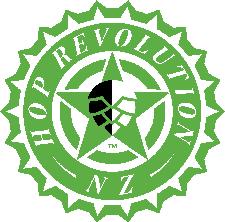
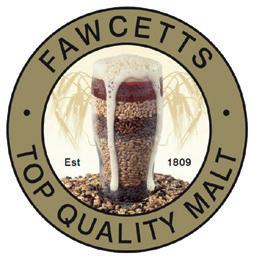








CONNECTING YOU TO THE INDUSTRY’S BEST PEOPLE & INGREDIENTS THROUGH THE WORLD’S LEADING FARMERS & SUPPLIERS ROB@BREWERSSELECT.CO.UK | JETHRO@BREWERSSELECT.CO.UK | SALES@BREWERSSELECT.CO.UK 01733 889100
For me, working collaboratively, sharing ideas and information amongst fellow brewers, is one of the core principles of SIBA and something which is integral to the success of the organisation.
Stop. Collaborate and listen…
With all the changes in Government of late it can be tempting to think that the big issues are on hold. But for the brewing sector that couldn’t be further from the truth, with far-reaching reforms to alcohol duty just one of the issues facing our sector in 2023.
The alcohol duty reforms are now set to come in as of August 2023 [see pages 56-57 for an overview of the key changes] and SIBA has been lobbying hard to ensure that the changes are as positive as possible for independent craft breweries like yours and mine. One area in which SIBA has had a huge success is in changing the treasury’s decision to limit the new draught duty relief to 40L and larger containers – under recently announced changes this relief will now apply to 20L and 30L containers also.
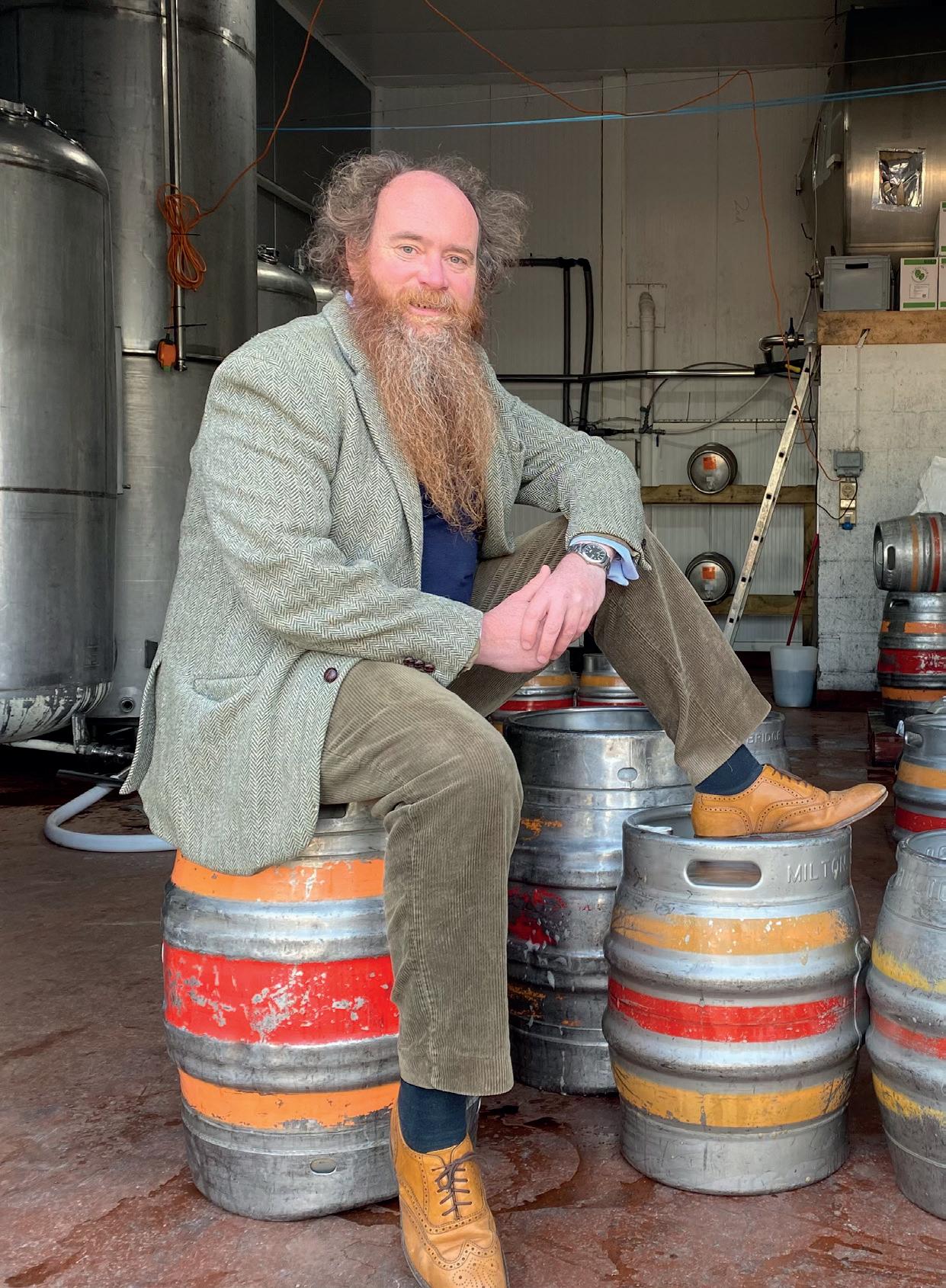
This change came as a direct result of lobbying from SIBA including a very well-attended event in Parliament, engaging with MPs on this issue and allowing them to be photographed with a keg, a bit like a recent now infamous photograph of a former Prime Minister and Chancellor at a brewery I won’t mention… Now, thanks to SIBA, the size of keg they were holding is actually eligible.
Rising energy costs continue to be a huge issue for the brewing industry, with many colleagues reporting three or even four-fold price rises which make running a viable and profitable brewing businesses extremely difficult. We’re tackling this issue on a number of fronts; firstly putting pressure on Government to
introduce measures which support highenergy consumption businesses – of which breweries are clearly one – and secondly to help brewers gain access to grants, funding and, crucially, knowledge on how we can all make our businesses more sustainable and energyefficient.

I spoke recently to Eddie Gadd of Ramsgate Brewery who has done some landmark work on CO2 recapture at his brewery and I look forward to the learnings he will be sharing with members at BeerX next year, when he delivers what I’m sure will be a very informative talk on the issue [see our Sustainability Focus on pages 42-47 for more on how this system works].
For me, working collaboratively, sharing ideas and information amongst fellow brewers, is one of the core principles of SIBA and something which is integral to the success of the organisation. It’s one of the reasons we will be introducing new changes to our regional meetings in the new year, where each meeting will have informative training sessions alongside the opportunity to meet with fellow brewers over a beer. Ensuring our regional meetings are well-attended, vibrant and engaging events that we all look forward to attending is going
to be a focus of mine and my fellow Regional Directors in the coming months – so if you have any suggestions or feedback which would help us further improve the meetings for you or your team then don’t hesitate to drop me or a member of the SIBA HQ team a line.

One event which SIBA was very proud to once again be involved with was the British Guild of Beer Writers Annual Awards, and in particular the Brewer of the Year Award 2023 which we sponsored. We served a whopping 10 different draught beers at the event in November from the SIBA bar, all of which were Overall Champions from the SIBA Independent Beer Awards National Finals at BeerX earlier this year – it’s just one of the ways in which SIBA helps to promote award-winning members and I look forward to trying the beers with the brewers themselves at the event. Cheers!
Richard Naisby Acting Chairman SIBA
7 www.siba.co.uk | SIBA Independent Brewer | Winter 2022
Chairman’s comment
Richard Naisby steps in as SIBA’s Acting National

Chair
SIBA announced in October that Roy Allkin had stepped down as Chairman with immediate effect to focus on his own business interests.
Richard Naisby, Vice Chairman, will now step in as interim Acting Chairman while a successor is sought. You can read Richard’s first comment piece as Acting Chair in this issue of the magazine on page 7.
Francis Patton, Chair of SIBA’s Executive Board, thanked Roy for his work as Chair saying: “Roy has been an invaluable asset to SIBA in recent years and I hope he will be in a position again in the future to lend his expertise to the organisation."
Big Bog Brewing takes home North West's top beer award
Big Bog Brewing Co has taken home the Overall Champion Cask Beer Award at the SIBA North West Independent Beer Awards 2022, which took place at the Bolton Beer Festival.

Their Gold-winning beer ‘Peat Bog Porter’ wowed judges with "superb balance and drinkability for such a full-flavoured dark beer".
The Overall Silver award winner was Hophurst Brewery APA and Bronze went to Coach House Brewing Hundpowder Mild - all of which went into the final judging having won best in their category.
Rich Midgley forms part of the two-man team at microbrewery Big Bog Brewing, and was onhand to accept the award: "Really surprised to win, there's only two of us that brew and we're really proud of this beer. It's really subtle and drinkable with a good dry finish, we like it and we're just pleased that the judges did too!"
The awards took place ahead of the Bolton Beer Festival at the University of Bolton Stadium, which continued over the weekend. The SIBA Independent Beer Awards are run by and for brewers and are judged by fellow brewers from elsewhere in the UK, as well other representatives from the industry and expert beer judges –making these the much coveted ‘brewers’ choice’ awards in the North West.
North West Independent Beer Awards winners will now go on to the National Finals at the BeerX UK event in Liverpool in March 2022.
Hosting the awards on behalf of SIBA was Buster Grant, Chair of SIBA’s Competitions Committee who said: “The quality of beers at the awards this year were really top-draw and we gave out more Gold medals than ever before, so to be named overall Champion is a huge, huge achievement - very well done to Big Bog and of course all of our other winners.”
For the full list of winners see pages 74-75
Rural England Prosperity Fund
The Government has launched the Rural England Prosperity Fund. This provides capital grant funding for small scale business in rural areas to help improve productivity and strengthen rural economies. There is a total of up to £110 million available for the financial years 23/24 and 24/25 and local authorities will decide how to spend their allocations.
New and existing rural businesses will be able to apply for capital funding for small scale investment, community-centred and circular or social economy projects. This might be to: develop new products and facilities that will be of wider benefit to the local economy. This could be buying equipment for food processing or packaging machinery such as brewing equipment, modernising existing equipment for increased energy efficiency or increased productivity through automation.
You can read more about the rural England prosperity fund here: www.gov.uk/government/publications/rural-england-prosperity-fundprospectus/rural-england-prosperity-fund-prospectus
The SIBA Annual Survey 2022/23 has been launched
The SIBA Annual Survey is a vital resource for us in planning our activities. It also forms the key basis of the SIBA Craft Beer Report launched at BeerX.
This year we have revamped the survey so there are fewer questions to reduce the time it takes to complete.
All SIBA Member Breweries who complete the survey and submit their production figures when requested to do so by the Toolbox no later than 28 February 2023 will be eligible for a prize draw to win a £500 credit voucher with the Supplier Associate of your choice. The winner will be announced at BeerX.
To complete the survey you will need some information including your sales data, pricing information and employee details.
The closing date for entries is strictly Friday 13 January 2023 to provide enough time for the proper analysis of the data ahead of the production of the Craft Beer Report 2023.
To complete the survey please visit: www.surveymonkey. co.uk/r/SIBA2022-23. If you have any questions please email the membership team via membership@siba.co.uk
8 Winter 2022 | SIBA Independent Brewer | www.siba.co.uk SIBA news comment
SIBA has appointed former Black Sheep Chairman Andy Slee as its new Chief Executive, bringing a wealth of industry knowledge and experience to the role.
Speaking as the appointment was announced, Andy Slee said: “I am of the passionate belief that small independent breweries are a force for good in the communities they serve - they are the vibrant heart that helps bring people together.
“SIBA represents a huge breadth of independent British brewers. Our job is to help create an environment in which all can thrive in what are very challenging times, and ensure that local beer is a vibrant and growing
part of the British beer landscape. That can only be achieved by helping small independent breweries to thrive. I look forward to working with the SIBA team and all its members to do just that.”
With leadership experience at famed independent brewery Black Sheep, as a NonExecutive Director at Titanic Brewery, as well as prior positions at Coca Cola, Punch Taverns and Bass, Andy brings with him a breadth of top-level lobbying, commercial and membership experience to the role – as well as a personal passion for local independent beer.
Chairman of the SIBA Board, Richard Naisby, welcomed Andy’s appointment, saying: “Andy’s knowledge and passion for the independent
SIBA welcomes new Homebrewer members
Budding brewers now have their chance to join SIBA as the organisation has extended its membership to include Homebrewer Members.
Homebrewer membership is open to all amateur brewers across the UK who want to improve their brewing skills. On offer is entry to SIBA’s brand new Homebrew Beer Awards, judged by professional brewers at the UK’s biggest beer and brewing trade event – BeerX - as well as regular online ‘Ask the Brewer’ sessions, giving homebrewers the opportunity to hone their skills.
As well as the awards, Homebrewer Members will receive a quarterly brewing magazine with a dedicated homebrew section edited by Andy Parker of Elusive Brewing and access
to SIBA’s brewing tools and advice as well as access to regional and national SIBA events and beer competition judging.
SIBA Head of Public Affairs Barry Watts said: “I started as a homebrewer and know how important it is to get access to information and professional advice to improve how I brew. Having SIBA involved means we can help homebrewers get to the next level as well as offering support for those looking to become professional brewers themselves.
“Our new Homebrewer membership offers a fantastic combination of resources, competitions, advice and support with entry to SIBA’s brand new Homebrew Beer Awards and BeerX on offer.”
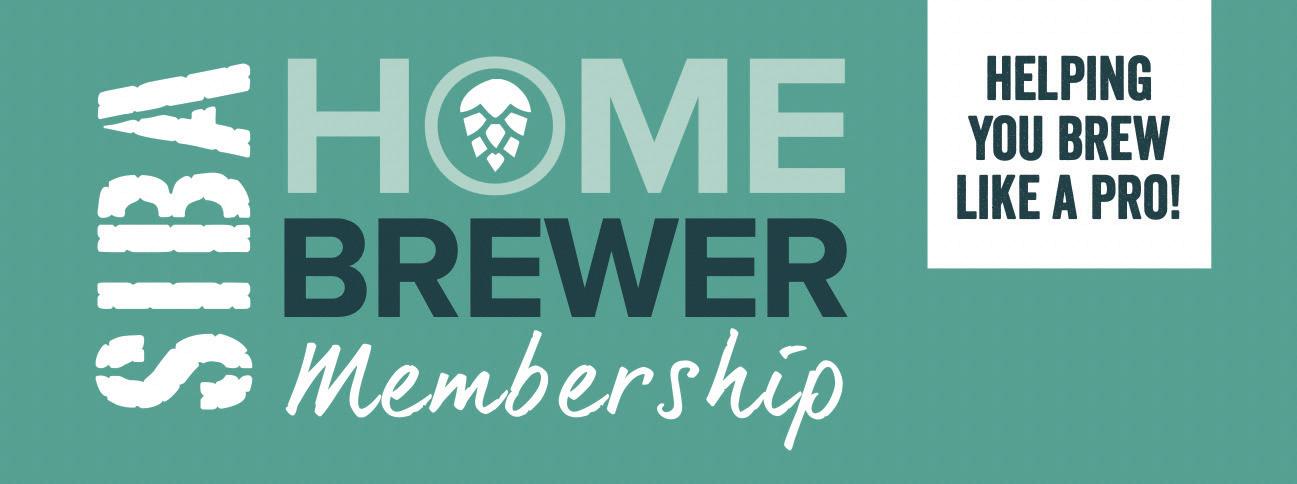
brewing sector is absolutely evident and I am certain he is the right man to drive forward SIBA in 2023. I look forward to working with him as he delivers a bright and progressive future for the organisation.”
Andy Slee will begin as SIBA Chief Executive on the 1st of January 2023, leading the organisation into the new year.

Andy Parker from Elusive Brewing said: “Homebrewing is a great way to learn about the process, improve your abilities and brew some excellent beers at home. For me as a homebrewer before starting Elusive, I used to knock on doors and chat to brewers to learn about their processes and a scheme like this would have been invaluable at the time.
The SIBA homebrewer membership helps to provide direct access to brewers, suppliers, advice and expertise which are key if you’re looking to improve as a homebrewer.”
This comes as SIBA has extended its membership to include International Brewers and plans to launch a new Bottleshop membership offering advice, guidance and Government lobbying support.
For the first time ever, homebrewers can compete in the SIBA National Homebrew Beer Awards and have the chance to see their beer professionally brewed at an award-winning brewery.
Free to enter for SIBA Homebrewer Members, the competition is now open for registration and will be judged by professional brewers at BeerX – the UK’s biggest beer and brewing trade event in March 2023.
For more information on SIBA Homebrewer membership and awards see page 17 in this magazine or visit www.siba.co.uk/homebrewer
9 www.siba.co.uk | SIBA Independent Brewer | Winter 2022 SIBA news
SIBA appoints Andy Slee as Chief Executive as he bids to ‘create an environment in which independent breweries of all sizes can thrive’
New nationwide homebrew competition to be judged by professionals at UK’s biggest brewing event


10 Winter 2022 | SIBA Independent Brewer | www.siba.co.uk
SIBA campaign success as draught beer duty rate extended
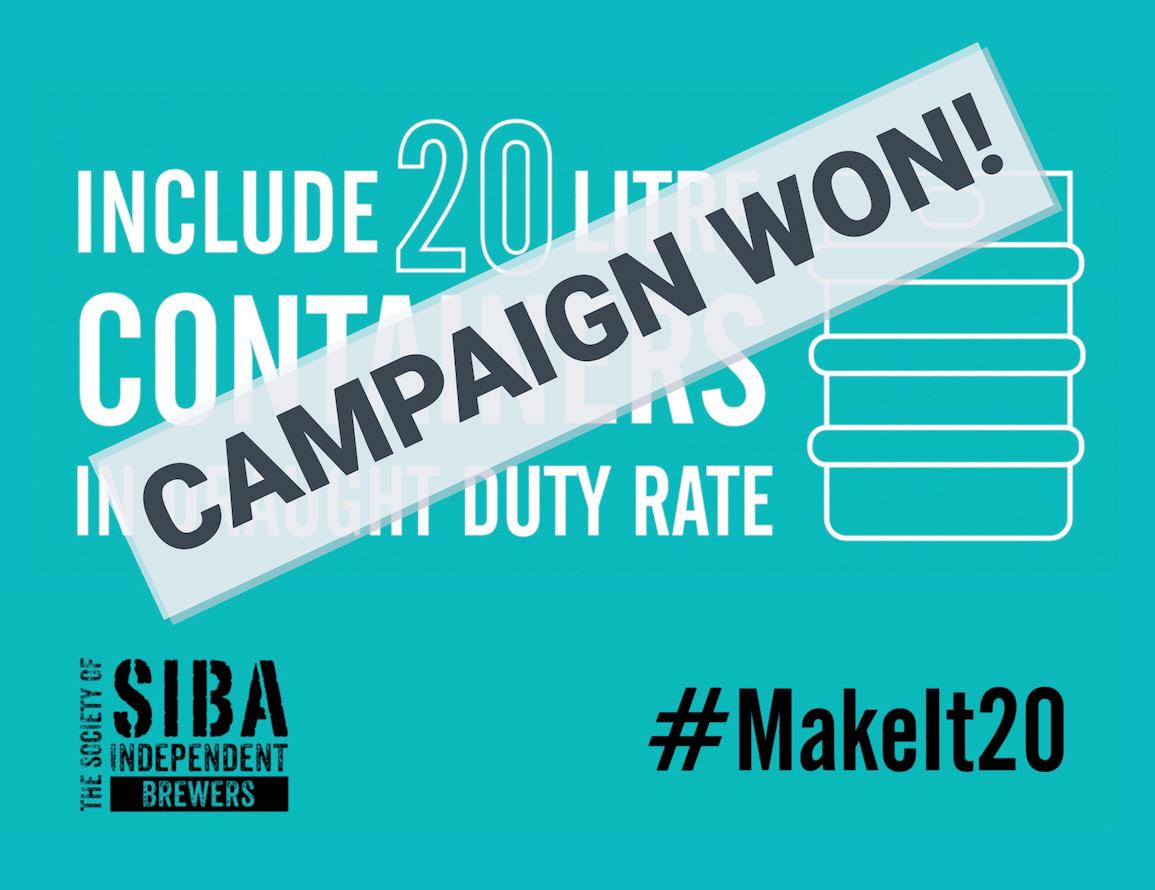
In a statement welcoming the news that the Government has extended the new preferential draught duty rate to include 20L containers as well as those over 30L, then-SIBA Chairman Roy Allkin said: “Small independent brewers will be cheering the announcement that the Government has listened to our concerns and included the 20 and 30 litre containers used by independent brewers in the new draught duty. Our Make it 20 campaign received cross-party support and the change will have a huge impact on the ability of small brewers to benefit from the duty discount.
“Delaying the introduction of the draught duty rate until next summer, as opposed to February as originally planned, will however come as a disappointment to many small brewers who have already factored these changes into their business plans for next year. Combining the successful Small Breweries’ Relief, which is 20 years old this year, with Small Producer Relief is very complex and there will inevitably be winners and losers, especially hitting those brewers making innovative stronger products like Imperial Stouts above 8.5% ABV. We look forward to working with the Exchequer Secretary and Chancellor to get the details right on these changes and ensure that we continue to have a vibrant, dynamic small brewing sector fit for the future.”
SIBA responds to the Scottish Government’s Emergency Budget Review
Responding to the publication of the Scottish Government’s Emergency Budget Review and the announcement on the Scottish Deposit Return Scheme, SIBA Scotland Director Jamie Delap said: “Scotland’s small independent brewers are currently operating on a knife edge trying to survive the combined impacts of energy bill increases and a cost of living crisis. They haven’t yet been able to build the resilience they need to recover from the impacts of the Covid 19 pandemic.
“Small breweries are therefore rightly concerned about the impending Deposit Return Scheme coming next year which they do not have the economic resources or capacity to prepare for or deliver.
“It is therefore encouraging that the Scottish Government has recognised some of the issues facing the scheme in the Emergency Budget Review and have indicated a willingness to amend the online takeback element which currently would prevent any small producer from selling online in Scotland next year.
“However, we would urge the Scottish Government to look again at the requirements for small producers which, as currently designed, are threatening business closures and jobs in Scotland and will lead to reductions in choice and an increase in price. Many small breweries have already told us they will have to stop selling beer in cans and bottles in Scotland because of the multi million pound costs of the scheme to small producers.”
SIBA reacts to scrapping of Alcohol Duty Freeze in emergency statement
SIBA’s then-Chairman Roy Allkin issued a statement in response to the news that the alcohol duty freeze announced by then-Chancellor Kwasi Kwarteng was being scrapped: “The emergency statement by the Chancellor undoes many of the positive measures announced in the mini budget only a few weeks ago, including a welcome freeze in alcohol duty from February next year. Small independent brewers will now have to wait a further few weeks to understand what this means for them, as the shakeup of the overarching alcohol duty system is still expected to go ahead. Again this is creating more uncertainty for small brewers who are facing an extremely challenging trading environment dominated by energy spikes, price increases and a cost of living crisis.
“The Treasury also intends to conduct a review of energy support from next April including incentivising energy efficiency. Small brewers previously called for support through grants to move to Net Zero and improve their energy efficiency through new technology and we hope that the Chancellor will consider this as part of his review."
Invite international breweries you know to join SIBA
SIBA’s International Membership is now live and we would like to encourage all members to reach out to any international breweries you know or have perhaps collaborated with to join as a SIBA International Member.
As a member they get entry into the SIBA International Beer Awards and free entry to BeerX, as well as the opportunity to network with fellow brewers and a range of other membership benefits. Find out more and share information with your contacts here: www.siba.co.uk/international
11
| SIBA Independent Brewer | Winter 2022 SIBA news
www.siba.co.uk






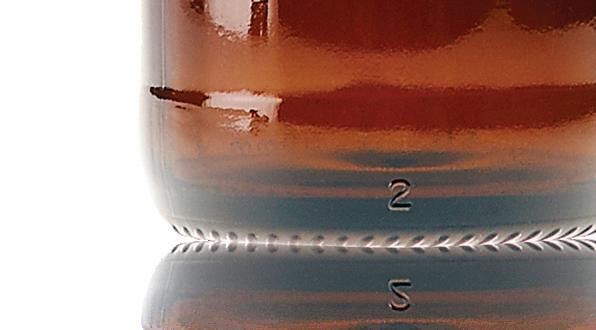


12 KEEP IT REAL with our STANDARD BOTTLES NO PLASTIC LINER PROTECTS FROM UV RAYS KEEPS BEER COOLER FOR LONGER PURE TASTE OF BEER - NOTHING ELSE NATURAL, SUSTAINABLE RAW INGREDIENTS CONTAINS UP TO 65% RECYCLED MATERIALS 100% ENDLESSLY RECYCLABLE QUALITY PACKAGING FOR QUALITY BEER Beatson Clark has a wide range of glass bottles in a variety of shapes and sizes to suit products from beers and real ales, to lagers and ciders. Our standard range can be embossed with your logo or strapline to enhance your branding from only 150k units. BENEFITS OF GLASS INCLUDE: CROWNS CROWNS CROWNS PRINTED
Baker’s Dozen wins best craft keg beer in SIBA East Independent Beer Awards
Baker's Dozen Brewing Co, a husband-and-wife microbrewery in Ketton, Rutland, has taken home the Overall Gold in the SIBA East Independent Keg Beer Awards, beating brewers from across the East of England.
The brewery’s 'Undertow' Session IPA is hazy and full flavoured beer, styled after American New England IPAs but at a more sessionable strength of 4.8% ABV. The beer was named best in class for the Pales Ales before going on to be named the Overall Champion in the final round judging, which sees all of the category winners go head-to-head. All of the winners from the awards will now go on to battle it out at the National finals in Liverpool next year.
The prestigious awards, held at the Legra Tap & Kitchen in Leigh-onSea, were judged by brewers and beer experts and seen very much as the brewers’ choice awards in the industry. All of the beers involved in the competition were also available as part of an 'Independent Beer Awards Tap Takeover' at the Legra Tap and other select venues across Leighon-Sea - giving local beer lovers the chance to taste this years' winners.
Dean and Gill Baker from Baker's Dozen Brewing Co were both on hand to accept their award, with Gill commenting: “We're just shocked and delighted to win, I'm actually shaking! We're over the moon and really didn't expect this."
Leigh-on-Sea Brewery named best in East of England
Leigh-on-Sea Brewery has taken home the overall Gold at the SIBA East Independent Beer Awards, beating brewers from across the East of England, stretching from North Lincolnshire down to Essex and Hertfordshire, as well Norfolk, Suffolk, Cambridgeshire and Bedfordshire.


It was Leigh-on-Sea’s ‘SS9’ – a hefty 9% ABV Imperial Stout with deep flavours of coffee and chocolate – that wowed the expert judges and was named the Overall Champion of the Cask. All of the category winners from the awards will now go on to battle it out at the National finals at BeerX in Liverpool next year.
The awards were held at Elgood’s Brewery in Wisbech prior to their beer festival.
Ian Rydings, Owner and Head Brewer at Leigh-on-Sea Brewery, accepted the award saying: “It’s always been a quality beer but it’s never done as well as this before, it’s amazing to win. It’s just so full of flavour, full of chocolate and coffee flavour that all comes from
Dean added: "What we love about this beer is that while it is hazy and aromatic like you would expect from a New England IPA or Pale Ale, it also has a really good undertow of bitterness - hence the name!"
Commenting on the win was SIBA Head of Comms Neil Walker, who presented the awards: “The quality of beer now available on keg is incredible in the East, with some superb craft lagers, pales ales, IPAs and many international styles now being brewed across the region. The quality of beer in the competition was genuinely excellent and judges had a very tough job separating winners from a very high quality pack. Huge congratulations to all of our Gold award breweries and in particular Dean and Gill from Baker's Dozen who were very deserving winners of the SIBA East Independent Beer Awards Overall Goldgood luck in the national finals!"
Read more about Baker's Dozen in our Homebrew in Focus feature on pages 22-23.


the specialty roasted malts we use, there’s absolutely no additions – it’s a pure stout.”

Commenting on the competition was SIBA Competitions Committee Chair Buster Grant, who presented the awards: “It was great to be back in Wisbech to judge these superb awards and the quality of entries this year was higher than ever. Huge congratulations to all of the winners and in particular Leigh-On-Sea who were named the ‘best of the best’ as Overall Gold Champions, with what is a really special beer.”
For a full list of winners from the event see pages 72-73.
13 www.siba.co.uk | SIBA Independent Brewer | Winter 2022 SIBA news
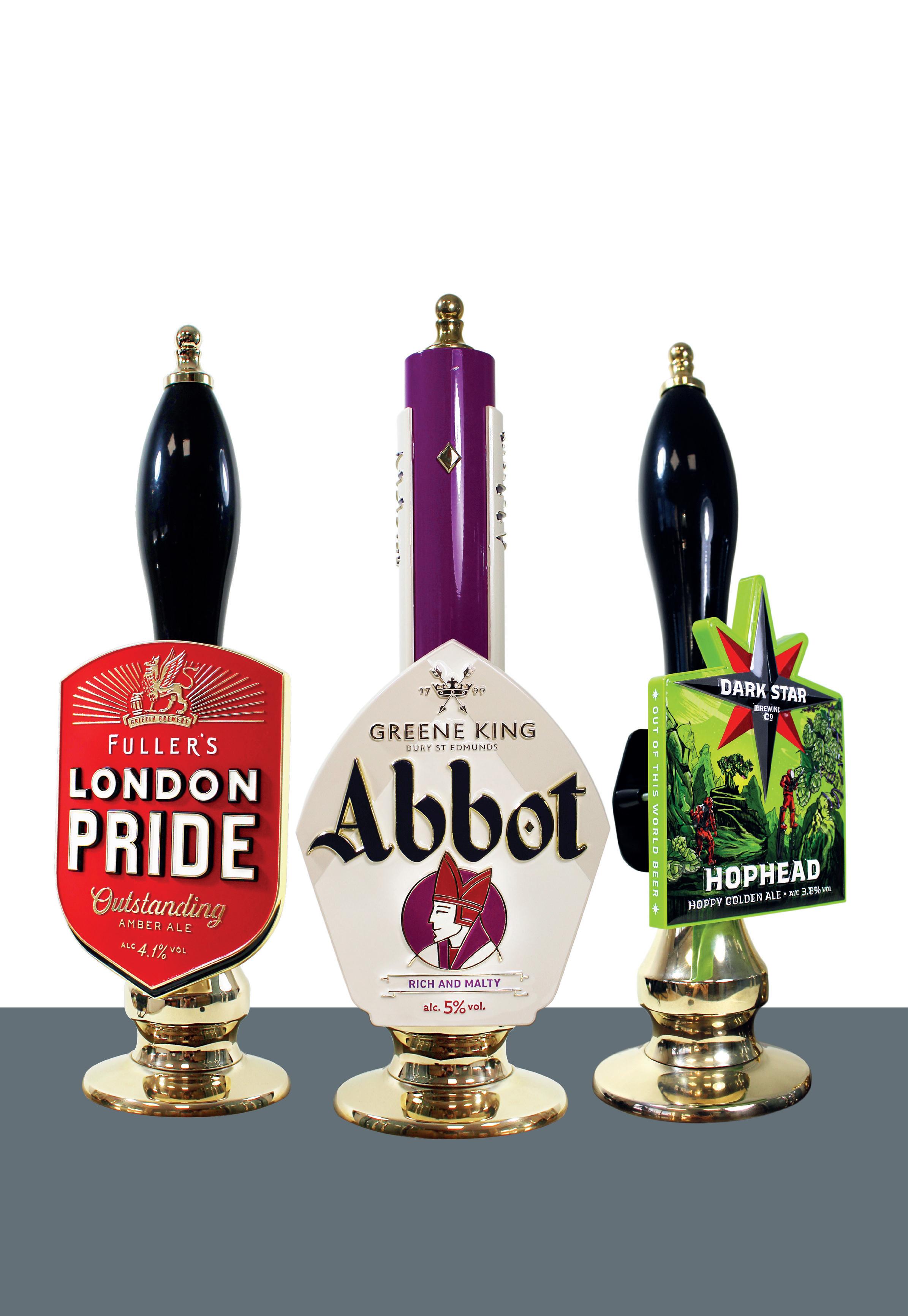
New SIBA report reveals how landmark Government policy led to UK brewing boom
SIBA published a special report in September to mark the 20-year anniversary of the introduction of Small Breweries’ Relief.

The report revealed the huge impact the policy has had on UK brewing, including the boom in small breweries and a huge increase in the number of different beer styles being brewed.
The ‘SBR @ 20’ report was published by SIBA, which lobbied successfully for the policy some two decades ago.
Small Breweries Relief was introduced by the then Chancellor Gordon Brown with the aim of allowing small breweries to pay a lower rate of duty on the beer they brewed in order to be able to compete with National and Global beer producers. The sliding-scale policy meant the smallest brewers received a 50% rate relief, with the relief gradually reducing depending on the size of the brewery.
Under changes announced last year, Small Breweries’ Relief will be replaced by a new ‘Small Producer Relief’ which will, alongside beer, include other drinks from small producers such as cider. The changes are due to come in from August 2023, but SIBA has raised concerns over various elements of the new system, including the unfair advantage given to cider.
“Massive amounts of thinking has gone into restructuring the whole alcohol duty regime, simplifying it and ‘making the basis of alcohol taxation more economically rational, with fewer distortions and arbitrary distinctions’, yet the massive cider producers will continue to pay half the alcohol duty that brewers do, and now the distortion is in plain sight, glaringly obvious,” said Eddie Gadd, MD of Ramsgate Brewery and long-time campaigner for small brewers.
Read highlights of the SBR@20 report on pages 26-31
How long have you worked for SIBA and what did you do before?
I have worked for SIBA since April 2022, before this I worked for MPs and in the Civil Service.
What does your job role with SIBA involve?
I assist Barry with our Public Affairs and Policy work. This means I speak with politicians regarding issues facing the industry like Deposit Return Schemes and Alcohol Duty and also work on policy initiatives. I have been working on our public affairs presence in Wales recently and have had meetings with around a quarter of the Members of the Senedd discussing DRS. What, in your view, is SIBA’s key purpose?
SIBA’s key purpose is to deliver for its members and make sure they get the most out of membership. For me that means ensuring their voices are heard in the corridors of power.
What made you want to come and work within the independent brewing sector?
I started my early career as a chef in fine dining restaurants across North Yorkshire and have always been interested in beer pairings. From this I started a blog about food and beer, suggesting pairings and reviewing beers. It’s an industry I have been interested in getting into since I left university. I even had an interview offered by SIBA in 2015, but I had just got my first job in Parliament and had to turn it down.

What are you most looking forward to in your role in the coming year?
I am very much looking forward to meeting more members and learning even more about the industry. I am also looking forward to pushing our agenda further in Wales.
What has most surprised you about SIBA since you joined?
The effectiveness of SIBA’s public affairs. Having worked in politics for a long time I know how hard it is to affect change, but this is something SIBA does very well.
What issues can you help SIBA members with and how should they contact you?
I am willing to help SIBA members with any issues they have, if they need briefings, help with setting up meetings with their local MP or just any queries in general I am always happy to help. The best way to get in touch is via e-mail on will.lockwood@siba.co.uk
What do you like to do outside work?
I love to cook, my kitchen is full of kitchen gadgets, which drives my wife crazy. I love travelling and going for walks in the beautiful Peak District where I live!
What is your favourite beer and where would you most like to drink it?
At the moment I am very much into sour beer, so a beautiful sour beer on a sunny beach in Crete sounds lovely on this rainy October morning!
15 www.siba.co.uk | SIBA Independent Brewer | Winter 2022 SIBA news
Meet the Team Name: Will Lockwood Job Title: SIBA Public Affairs and Policy Officer Contact email: will.lockwood@siba.co.uk

- Determination of alcohol, density, extract, and further quality parameters - Optional
and
your
- Easiest
beer, wine, and spirits in
production
- Full
COMPLETE BEVERAGE ANALYSIS IN ONE MEASURING CYCLE FROM RAW MATERIAL TO FINISHED PRODUCT Get in touch: www.anton-paar.com
measurement of turbidity, color,
pH value, based on
needs
analysis of
various
stages
compliance with standard reference methods
SIBA Homebrewer Membership
Are you a homebrewer wanting to improve your brewing skills? Then join as a SIBA Homebrewer Member today. SIBA Homebrewer Membership gives you access to brewing advice, information and a wide range of member benefits such as discounted brewing supplies, networking opportunities with fellow amateur and professional brewers, beer judging training, and free entry to the UK’s biggest beer and brewing event – BeerX UK.
Membership benefits include
• Quarterly brewing magazine with a dedicated home brew recipe section (see pages 22-23)
• Entry into BeerX – the UK’s biggest brewing event
• Regular online ‘Ask the Brewer’ sessions for technical Q&A and advice

• Access to SIBA’s ‘Member Toolbox’ offering business and brewing tools and advice on going pro
• Attend regional and national SIBA events, judge at SIBA beer competitions and come along to social gatherings
• NEW! Opportunity to judge SIBA’s Bottle & Can Independent Beer Awards remotely (via Zoom, December 2022) – judging professionally brewed beers from across the UK with other experienced beer judges. All beers (1 to 2 cases) posted out to Homebrewer Members for judging free of charge.
• NEW! Entry into SIBA’s National Homebrew Beer Awards taking place at BeerX (see details below)
SIBA launches Homebrew Beer Awardsset to take place at BeerX 2023

For the first time ever, homebrewers can compete in the SIBA National Homebrew Beer Awards and have the chance to see their beer professionally brewed at an award-winning brewery. Free to enter for SIBA Homebrewer Members, the competition opened for registration in November and will be judged by professional brewers at BeerX – the UK’s biggest beer and brewing trade event in March 2023. This year we have partnered exclusively with Yakima Chief Hops to provide Homebrewer Members with their new experimental hop HBC 586 which has been described as “a large medley of fruit flavours…mango, guava, lychee, citrus with herbal notes”. Entrants are challenged to brew the best single hop pale ale which showcases the full potential of this exciting new hop variety.
“Giving homebrewers access to one of Yakima Chief’s latest experimental hop varieties gives them the opportunity to push the boundaries of hopforward brewing while being directly involved with Yakima Chief’s Elite Trials programme,” said Robbie Harrigan, Home Brew Sales Manager for Yakima Chief in Europe. “Professional brewers have only recently had access to this incredible new hop, and we can’t wait to see what homebrewers create with it.”
The homebrewer who sees their beer named the Overall Champion in the SIBA Homebrew Beer Awards will have the opportunity to help scaleup their recipe for production at Quantock Brewery in the South West. This multi-award winning craft brewery is increasingly known for its hop forward beers such as its unique “Obsessed With” single hop range.
Quantock Director Cheryl Ford said: “We started as every homebrewer did experimenting in our garage and now we’ve had the chance to develop and expand our own independent brewery making beers enjoyed around the country. It’s great to see that SIBA has expanded to include homebrewers who are the future of our industry and we can’t wait to invite the winner to join us here for a day of brewing.”
For more information on SIBA Homebrewer membership or to join please visit www.siba.co.uk/homebrewer/.
17 www.siba.co.uk | SIBA Independent Brewer | Winter 2022 Homebrewer Membership & Awards
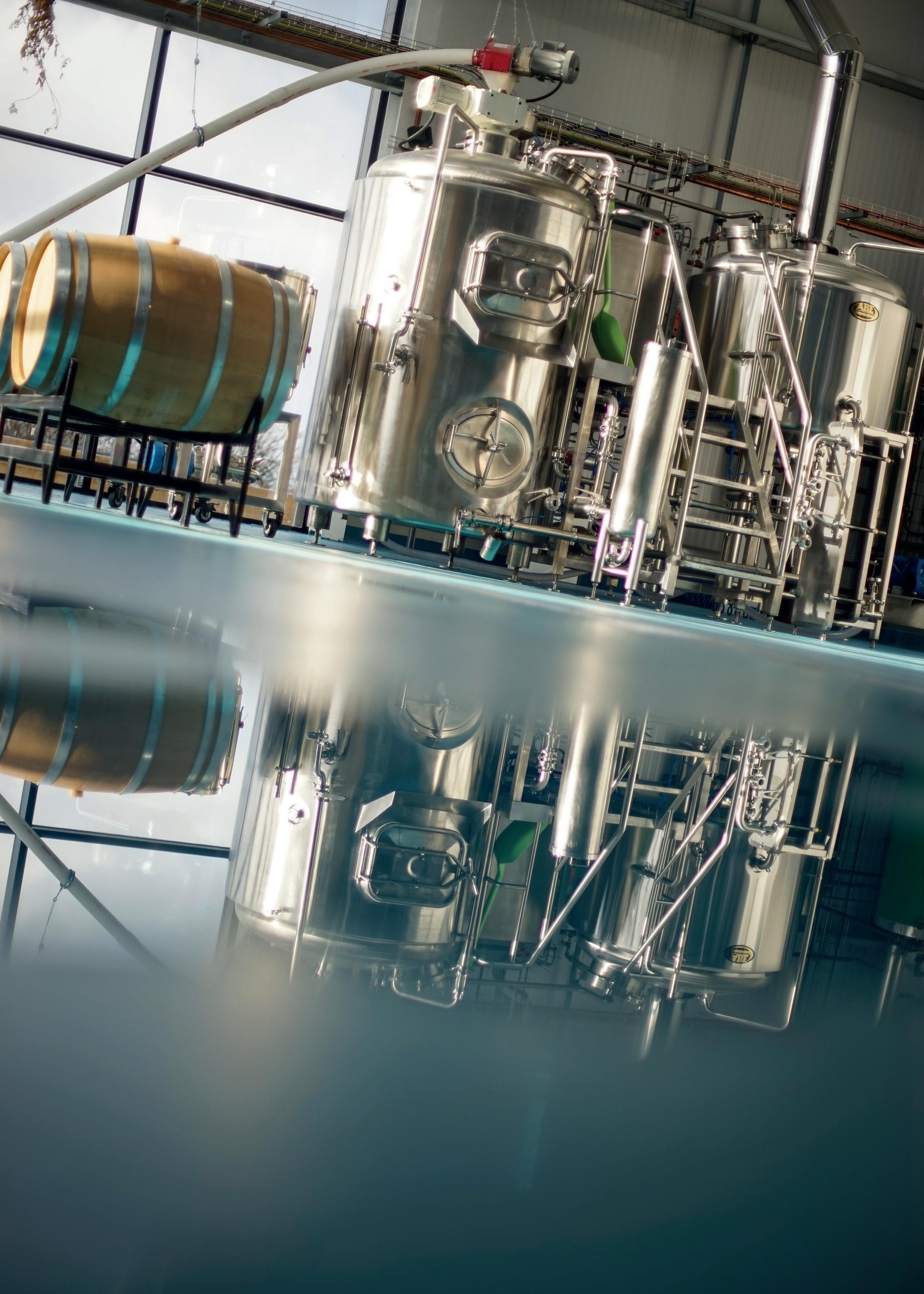










est 1984 or call 01404 892100 See us at EQUIPMENT SERVICE SUPPORT sales@vigoltd.com vigoltd.com @VigoLtd Equipping the Nation’s Drink Producers Bottle fillers & labellers Brewhouses, tanks/chilling Craft canning lines Keg washers & fillers Engineering Support Carefully chosen equipment from renowned manufacturers. Back-up, maintenance & repair by our team of multi-skilled Vigo engineers.
The view from Westminster

It’s all change again in Parliament as the shambolic Mini-Budget announcements in September led to another Prime Minister and a new set of Ministers. SIBA has spent the last few months getting to know the new Ministerial crop and now faces having to start again with a brand new team. By my count we are now on our eighth Exchequer Secretary since the Government began the review of Small Breweries’ Relief (SBR) in 2018 and yet this issue has not yet been completely resolved.
As it currently stands there’s two big issues coming your way in August next year which breweries need to start preparing for. The first is the complete overhaul of the alcohol duty system which sees SBR become part of a souped-up Small Producer Relief. The second is the Scottish Deposit Return Scheme which impacts all small pack sales in Scotland.

Alcohol duty system
The Government finally published its update on the alcohol duty changes in September which included significant wins for SIBA and small independent brewers. The fundamental redesign, which will now be introduced in August next year, will transform the alcohol duty system. You can read my guide to the changes in this copy of the SIBA magazine (see pages 56-57) or see the detailed briefings available online on the Toolbox.
Amongst the changes there was success for our Make It 20 campaign, with the Government including 20L and 30L containers in the new draught duty relief – the 5% reduction in duty for beer placed in kegs and casks. Alongside that, the Government is intending to expand the farmgate exemption to include small breweries and has accepted SIBA’s view on the average ABV to set the new tapers. SIBA is also pushing
SIBA continues to lobby for changes and we’ve had a great deal of engagement with the Minister with three meetings in only a couple of months.
for transitional relief so that breweries don’t have to recalculate duty twice (or potentially three times if they don’t freeze duty) next year. One issue that has arisen in the latest version of the changes is its impact on growlers and crowlers. Currently as drafted it would mean that a pub cannot ‘repackage’ beer into takeaway containers, which would negatively impact community pubs alongside taprooms and brewery shops. This is something that SIBA and others are working with the Government to address and hopefully find a solution.
Scottish DRS
In Scotland, the Government continues to plod along with the Deposit Return Scheme – which sees a deposit added to each can and bottle sold. If you sell into Scotland, even online or via a bottleshop’s webshop, you’ll have to register and pay fees to cover the costs. The window to register opens in December and closes at the end of February. If you are not registered before 1 March you will not be allowed to sell cans and bottles in Scotland so it’s very important that you take the time to register. SIBA continues to lobby for changes and we’ve had a great deal of engagement with the Minister with three meetings in only a couple of months. They’ve listened to our concerns about the online takeback service which we’re now expecting to be reconsidered. Hopefully we’ll get some positive movement on small producers as well.
Get your beer into Parliament

A great way to engage with your MP is to have your beer poured in Parliament. You can have your cask ale chosen as the guest ale for the Strangers’ Bar. It’s a great opportunity to come down to Parliament, have some photos taken to send to the local press and lobby your local MP for changes. We can be there to support you all the way, including on the day in Parliament if you wish. If you decide you want to request your beer be served in the Strangers’ bar, please either e-mail will.lockwood@siba.co.uk or your local MP who will be able to assist you.
Barry Watts is Head of Public Affairs and Policy at SIBA. He covers political relations and policy for SIBA members. He can be contacted at barry.watts@siba. co.uk or 07977837804.
19 www.siba.co.uk | SIBA Independent Brewer | Winter 2022
view from Westminster
The


Caught by the Undertow
Elusive Brewing’s Andy Parker, who was recently named Brewer of the Year by the Guild of British Beer Writers, meets one half of the husband and wife team behind Baker’s Dozen brewery, Dean Baker, to find out more about the origins of his New England IPA, Undertow…
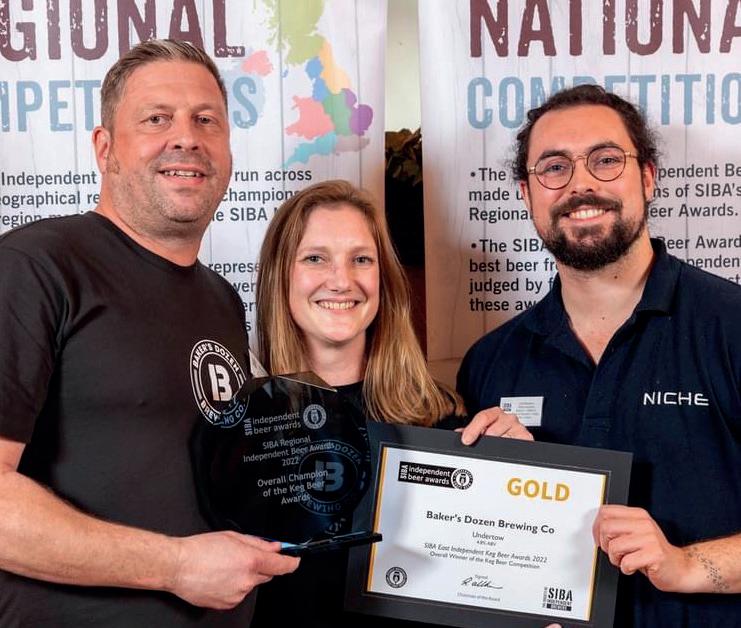

22 Winter 2022 | SIBA Independent Brewer | www.siba.co.uk
in focus
Homebrew
A visit to New Hampshire for a friend’s wedding in 2013 started a love affair with New England IPAs for husband and wife team Dean and Jill Baker, two years before Baker’s Dozen would brew their first commercial beers.
Dean recalls the moment fondly: “Being the diligent planner that I am, I started looking around for breweries during our stay in Boston and came across a new start-up brewery called Trillium that had been going for just a couple of months. When we arrived at the brewery, they didn't have a licence to drink on the premises and were only doing growler fills, but there were a few bars just down the road where we could try their beers. On the 23rd of August 2013 I tried my first New England IPAs. I forget the name of the bar but remember trying Congress Street and Fort Point. They were thick and murky in appearance with an incredible aroma. Both fresh and amazingly fruity on the palate with a fairly low level of bitterness.”
Trillium has since gained a reputation for brewing some of the world’s best examples of the New England IPA style and the brewery’s beers are highly sought after. However, like the origins of this now ubiquitous style, the story of how Baker’s Dozen came into being started much earlier. “My parents used to run pubs, so I grew up in the trade and have always loved cask beer,” explains Dean. “I cut my teeth in and around Nottingham on Home Ales Bitter. And in 2005 Jill and I took on our own pub in Stamford (The Jolly Brewer) where cask beer was our focus. In wanting to run the best business that we could, we sought to educate ourselves, staff and customers as much as possible about the products that we were serving them, and that's probably the beginning of our story.” Around the same time, John Kimmich of The Alchemist Brewery in Waterbury (Vermont) was developing his recipe for Heady Topper – widely recognised as the origin of the New England IPA style. This thirst for knowledge about the product they were serving at the Jolly Brewer inevitably lead Dean towards learning to brew: “I was quite keen to learn more about the brewing process and how different styles were produced and that's when it all started to get out of hand! In early 2012 I went on a brewing course at Brewlab in Sunderland, then bought a 50 litre brew kit. Several brews later and we were planning on either spending all our savings on buying a house or a load of stainless steel, hard work and sleepless nights. We still don't own a house!”
Baker’s Dozen moved into its commercial brewing premises in 2015 and, inspired by those early encounters with the New England styles, has gone on to win several regional awards including overall winner in the 2022 SIBA East Keg Competition with New England Pale Ale, Undertow.


“To my mind, those early examples I tried had a little more bitterness than the New England style beers that we see in our bars and bottle shops nowadays,” Dean reflects, “So when we looked to brew our first commercial example we wanted to look back to our first experience of the style and add that little extra dimension to the beer, that for my taste is often missingan undertow of bitterness.”
So when we looked to brew our first commercial example we wanted to look back to our first experience of the style and add that little extra dimension to the beer, that for my taste is often missing.
The New England style is characterised by its juicy, citrus and floral hop notes, with a heavy emphasis on aroma. They are hazy in appearance and generally have a much lower bitterness than other sub-categories of the IPA style. They are known for having a full, smooth mouthfeel. In constructing the recipe for Undertow, Dean focused on that aspect: “The grist is fairly simple, but makes sure there's plenty of body for that full mouthfeel. A decent whack of Carapils ensures there's plenty of dextrins to cling on to those hop compounds and the Golden Naked Oats give a creamy silky finish.”
To layer the citrus notes, the beer is fermented with a New England yeast strain, which is pitched at 18C and allowed to free-rise to 19C. Dry hops are added during active fermentation, when the beer reaches 1.020. This serves two purposes, as Dean explains: “This has the added benefit of both utilising biotransformation of hop compounds as well as allowing us to carbonate the beer naturally using the spunding valve.”
After dry hopping, the beer is left at 19C for one day before being allowed to naturally rise to 22C for a diacetyl rest before being cold crashed and packaged.
23 www.siba.co.uk | SIBA Independent Brewer | Winter 2022
Homebrew in focus OG: 1047 FG: 1010 ABV 4.8% Grain Bill: Simpsons Low Colour Golden Promise 4kg (80%) Simpsons Golden Naked Oats 500g (10%) Weyermann Carapils 500g (10%) Hops: 13g Citra 15 mins 13g Nelson Sauvin 15 mins 25g Citra 3 mins 25g Nelson Sauvin 3 mins 37g Citra F/O 37g Nelson Sauvin F/O Dry Hop (@ 1020) 62g Citra 62g Nelson Sauvin Baker's Dozen Brewing Co. Undertow
WINNER best craft keg beer East of England
SIBA Business Awards 2023
As part of the launch of the SIBA Business Awards 2023, SIBA has revealed a new “Empowering People" Award which seeks to highlight the best breweries in the UK to work for.

The award aims to celebrate independent craft breweries which go above and beyond for the members of their team; empowering staff to achieve more in their professional career, introducing initiatives and incentives which create a positive working environment, or providing benefits or support mechanisms which encourage a happier healthier life for employees.
“The brewing sector is an incredibly hands-on and collaborative industry and the wellbeing of employees is at the forefront of all successful brewing businesses. This new award seeks to highlight the breweries in the UK who are not only supporting their staff but helping them to have a happier, more successful working life,” said Neil Walker, SIBA head of Comms.
The SIBA Business Awards seek to congratulate excellence in the brewing industry across a variety of categories, from pump clip, can and bottle design, to efforts taken by brewers to make their business more sustainable, innovative or successful, as well as naming the UK’s best pubs, bars and retailers of craft beer from independent breweries.
Christian Barden, UK & Europe CEO of Konvoy, which is sponsoring the new Empowering People Award as well as the overall Brewery Business of the Year award for 2023, said: “I’m really proud to be supporting SIBA’s new award for Empowering People. Having been part of and built businesses across various organisations and continents it’s always empowered people that are encouraged to dream and work together with mutual trust and respect that create long term success stories. It’s so easily forgotten when the pressure is on but that’s actually when it matters most.
“High performing teams are always about smiling faces and great results, and that’s the environment we’ll keep building at Konvoy. It all comes down to empowerment at every level, which is what my leaders create for me too. I look forward to seeing the great entries from breweries across the UK that are striving to do the same.”
The new categories introduced last year for the “UK’s Best Independent Craft Beer Retailer – Online”, “UK’s Best Independent Craft Brewery Webshop” and “Community Engagement” will also return for the 2023 Awards following huge interest from the industry.
“The SIBA Business Awards have evolved in response to changing consumer habits over recent years, as more people look to purchase beer online or discover their local brewery taproom. Independent craft breweries are embedded in their local communities and these awards highlight the businesses doing it better than anyone else in the UK.” Neil added.
The SIBA Business Awards 2023 are judged by a panel of industry experts and presented at the UK’s biggest beer and brewing event – BeerX UK in Liverpool, March 2023.
For more information about the awards or to find out how to enter visit www.siba.co.uk/businessawards
Official Category Criteria

Marketing Implementation
For all aspects of effective marketing and communication strategy, including general or specific campaigns, promotions, PR, social media activity, product launches etc.
Entries must stand out from the crowd for marketing initiative, effective communication, a PR opportunity seized, or imagination and creativity deployed in the increasingly competitive virtual world of social networking.
Sustainable Business
For taking the ethics of environmental awareness and sustainable business operation way beyond the norm, with either a single innovative initiative or a holistic strategy for sustainability.
Entries must show how measures implemented in the brewery, such as production processes, energy economies, recycling and packaging, are minimising environmental impact to the benefit of both brewery and community.
Community Engagement
This award highlights breweries who have shown an outstanding commitment to engaging with their local community, supporting local initiatives, or raising money for charitable causes through events and fundraisers.
Entrants should demonstrate how the brewery is integrated into and supports the local community; either through a single successful initiative or a range of activities which engage local people.
Individual Design
For a single design of bottle, can or pump clip that clearly stands out, gains point-of-sale market advantage and ultimately drives the purchase of a brewery product.
Strong traditional designs are welcome, but entries are also sought for contemporary and original artwork that puts a brewery’s beers at the forefront of the evolution of point-of-sale as an essential marketing tool.
Multiple entries from a brewery are welcome, but should be entered separately and any entries which contain a range of designs within a ‘concept’ or ‘brand’ should be entered into the Total Concept Design Category below.
24 Winter 2022 | SIBA Independent Brewer | www.siba.co.uk
SIBA Business Awards 2023
Concept Design
For the design concept behind a range of beers from a brewery, or a brewery’s entire branding and design strategy. Entries must provide details of all aspects of the design concept and how it creates a distinct market identity, setting the brand apart in an intensely competitive field.
Business Innovation
For breweries that have shown true innovation in their business. This could be anything from a bold export operation getting beer in to the hands of new consumers or an internal innovation which has improved efficiency or profitability. This broad category should be entered by any brewery who believe they have done something innovative within the industry.
Commercial Achievement
The commercial achievement award should be entered by breweries that have experienced commercial success in one or all areas of their business. Whether it is a brewery starting from scratch or an established brewer expanding their reach, the commercial achievement award aims to highlight the most business savvy from our industry.
UK’s Best Independent Craft Brewery Taproom
For Taprooms which are located within, or in very close proximity to, working independent craft breweries.
Judges will be looking for an extraordinary commitment to serving the best quality and range of independent craft beers (including cask, keg, bottles or cans) in a welcoming and attractive environment.
This award is specifically for Brewery Taprooms and not for ‘Brewery Tap’ pubs or off-site ‘Taprooms’ not located within or near to the owner brewery. If you are a brewery with an off-site Taproom or Brewery Tap pub then you can enter this into the relevant Best Independent Craft Beer Bar or Pub category.
UK’s Best Independent Craft Brewery Webshop
This new award names the UK’s best independent craft brewery webshop. Entries should demonstrate how the brewery webshop offers a positive user experience, intuitive and attractive design, and of course excellent customer service.
This award is open only to webshops run by independent craft breweries on their own website, and is not for online retailers (for this see retailer category below).
UK’s Best Independent Craft Beer Retailer – Multiple
UK’s Best Independent Craft Beer Bar or Pub – City
For pubs or bars which have shown an extraordinary commitment to serving the best quality and range of independent craft beers (including cask, keg, bottle or can). This award is specifically for pubs or bars located in urban, city, town centre, or suburban locations across the UK.
UK’s Best Independent Craft Beer Bar or Pub – Rural
For pubs or bars which have shown an extraordinary commitment to serving the best quality and range of independent craft beers (including cask, keg, bottle or can). This award is specifically for pubs or bars located in rural, village, or isolated locations across the UK.
Best Independent Craft Beer Promotion
This award is for breweries, contentproducers, agencies or other businesses within the beer industry who have shown innovation and success in promoting beer to either consumer or trade audiences.
Empowering People
This award highlights independent craft breweries who go above and beyond for the members of their team; empowering people to achieve more in their professional career, introducing initiatives and incentives which create a positive working environment, making efforts to promote diversity and inclusivity, or providing benefits or support mechanisms which encourage a happier healthier life for employees.
This award seeks to congratulate breweries who put their team well-being at the heart of their business.
For independent retailers selling beer from multiple locations. Entrants can be specialist craft beer shops, or businesses which have recently shown a commitment to promoting independent craft beer, but must be an independent business with fewer than 10 outlets.
UK’s Best Independent Craft Beer Retailer – Single
For independent retailers selling beer from a single location. Entrants can be specialist craft beer shops, or businesses which have recently shown a commitment to promoting independent craft beer, but must be an independent business trading from a single location.
UK’s Best Independent Craft Beer Retailer – Online
For independent retailers based in the UK selling beer online. Entrants can be specialist craft beer retailers, or online retailers which have recently shown a commitment to promoting independent craft beer, but must be an independent business.
(Please note this award is not for brewery webshops, which have their own separate award above).
This award is looking for the UK's best beer festivals, video or audio beer content, tutored beer tastings, hosted beer events (in-person or online), or other promotions of beer via apps, point of sale, or any other means which have the aim of promoting independent craft beer in the UK.
Supplier Associate of the Year
This award seeks to highlight the UK’s best SIBA Supplier Associate and is SIBA Brewing Member nominated.
From brewing ingredient suppliers and brewery fabricators, to business consultants and agencies, The Supplier Associate of the Year is a company which has shown a real understanding of brewery needs and actively supported independent craft brewing businesses throughout the year.
SIBA Brewery Business of the Year
This judges’ choice award is the top prize at the SIBA Business Awards and is presented to the brewery who have, across a variety of areas, shown themselves to be running an outstanding brewing business which sets themselves apart from the competition.
25 www.siba.co.uk | SIBA Independent Brewer | Winter 2022 SIBA Business Awards 2023
NEW ! Cover Story
People Issue 12 Winter 2022
Empowering
SBR @20
Highlights from SIBA’S SBR 20th anniversary report
It has been 20 years since the introduction of Small Breweries’ Relief (SBR), and to mark this momentous anniversary SIBA produced a report on the background to this industry-changing piece of legislation and how it has shaped the evolution of the UK’s craft beer scene since. Here we bring you some of the highlights from the report, but to read it in full go to: www.siba.co.uk/wp-content/uploads/2022/10/SBR@20-Report-2022.pdf


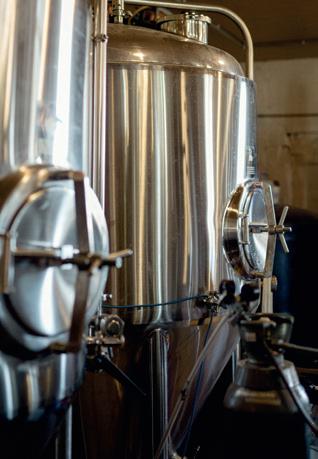

How the campaign for SBR began
This SBR report celebrates 20 years of a revolutionary beer duty system but the story of Sliding Scale (SS) which became Progressive Beer Duty and was renamed Small Breweries’ Relief, starts over 20 years before its introduction. In fact, SS was the main reason SIBA was formed by the “father” of micro brewing, Peter Austin, and a handful of compatriots.
Through the 80s the concept of a progressive beer system developed mainly as a result of us responding to the probing of MPs. From “it's great idea” through “how much will it cost and who will have it?” This showed the need to create a workable system. However, our naïve attempts did have one effect: it was recognised as a concept in the Monopolies investigation into “The Supply of Beer” in 1989 which resulted in the industry shattering “Beer Orders”. These frustratingly did not include our dream. But what would a scheme look like? We needed to find a structure so I started looking and thinking. The start was the EU laws surrounding the coming of the single market in 1993. We were intimately involved in the creation of the laws surrounding the calculation of beer duty and with those consultations we built a trust with HM Customs and Excise. In fact, we agreed a duty structure which was quite contrary to that which the national brewers wanted. It was a major step to changing the balance of power in the industry.
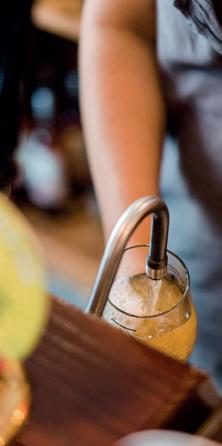
These discussions lead me to realise that any type of scheme would have to reflect the parameters allowed within EU law. These were written in such a way to allow great flexibility so I set about trying to devise a scheme suitable for the UK which would naturally benefit the little guys! After many months of fruitless thinking I had the “Eureka” moment: there was one thing that the EU laws did not prevent: they did not prevent breweries being given a base discount even if they were very much bigger. So, I had the concept. It was then a matter of maths, fiddling around with production levels and percentage discounts. With a solid scheme we would be able to see the real cost and have a workable system to present to government.
So, why was PBD so important? Well, I started my brewery in 1982 and it was so very difficult to sell beer then. Why? Well, first of all the idea of small local breweries was in its infancy and so there was little palpable demand from the customer so no pressure on a licensee to stock an unknown beer. More important though was the simple fact that every new account opened was descended on by beer reps who basically had all the discounting powers available to keep us new brewers out of the market which was dominated by the tied house system. This severely limited where we could sell beer: for years we were chasing our tails just to survive and facing monthly beer duty bills which we would have to fund ourselves as it was a production tax and not a sales tax. Indeed those days were pre-credit cards so everything had to be cash! In that time so many people started up and failed as the dice were loaded against them. I used to say, I went bust several times but had
a hopeless accountant who never noticed much less told me!
We failed to get a progressive beer system in place through the 90s despite constant campaigning as the Conservative governments and especially their MPs received huge funding from the beer industry: this is detailed in Lord Young's 1990 autobiography.
But in May 1997 the political landscape changed with the coming of a new Labour government with whom we had been discussing PBD whilst they were in Opposition. They were great if frustrating years and many contributed along the way who need mention of but you have the bones of the campaign. We still had to wait for another three years until we learnt that the concept had been accepted and a further two before we could celebrate its introduction. Let the revolution continue!
Dave Roberts is a former SIBA Chairman

26 Winter 2022 | SIBA Independent Brewer | www.siba.co.uk SBR@20
RELIEF: 20TH ANNIVERSARY SBR @20
SMALL BREWERIES’
The need for SBR
The acute problems that faced small brewers were brought home to me in 2002 when Martin Kemp, who ran the Pitfield Brewery in North London, told me he was closing the plant. The cause was not one that faced bigger brewers: his van had broken down, he couldn’t afford to repair it and as a result couldn’t deliver to pubs.
The loss of Pitfield would have been a disaster. Back in 1987, when it was run by Martin with his partner Rob Jones, it had won the Champion Beer of Britain top award with its Dark Star ale. It put not just Pitfield but the whole of the small brewers section in the spotlight and proved that minnows could brew just as good beer as regional and national producers.
Around the same time, when I went to Nottingham to write a piece about the Castle Rock Brewery, managing director Colin Wilde greeted me in his office and said: “I’ll just sign this cheque to HMRC and then we can chat.” I looked over his shoulder and winced at the eye-watering amount of money he was signing away.
“Is that a year’s duty?” I asked. Colin laughed. “You must be joking – that’s one month’s.” He agreed he had to make and sell a lot of beer before he could start to make a profit.
And then came the momentous announcement in 2002 from Chancellor Gordon Brown that he was introducing Progressive Beer Duty that would give small brewers a much-needed tax break: “It will mean cheap beer in time for the World Cup!” he said to cheers from all sides of the Commons. It was a typical piece of politicians’ hyperbole but nevertheless it did mark a breakthrough for small independent brewers. It was the culmination
of their long campaign for a duty scheme that would recognise how they struggled to survive in a beer market dominated by big brewers and their famous “economies of scale”.
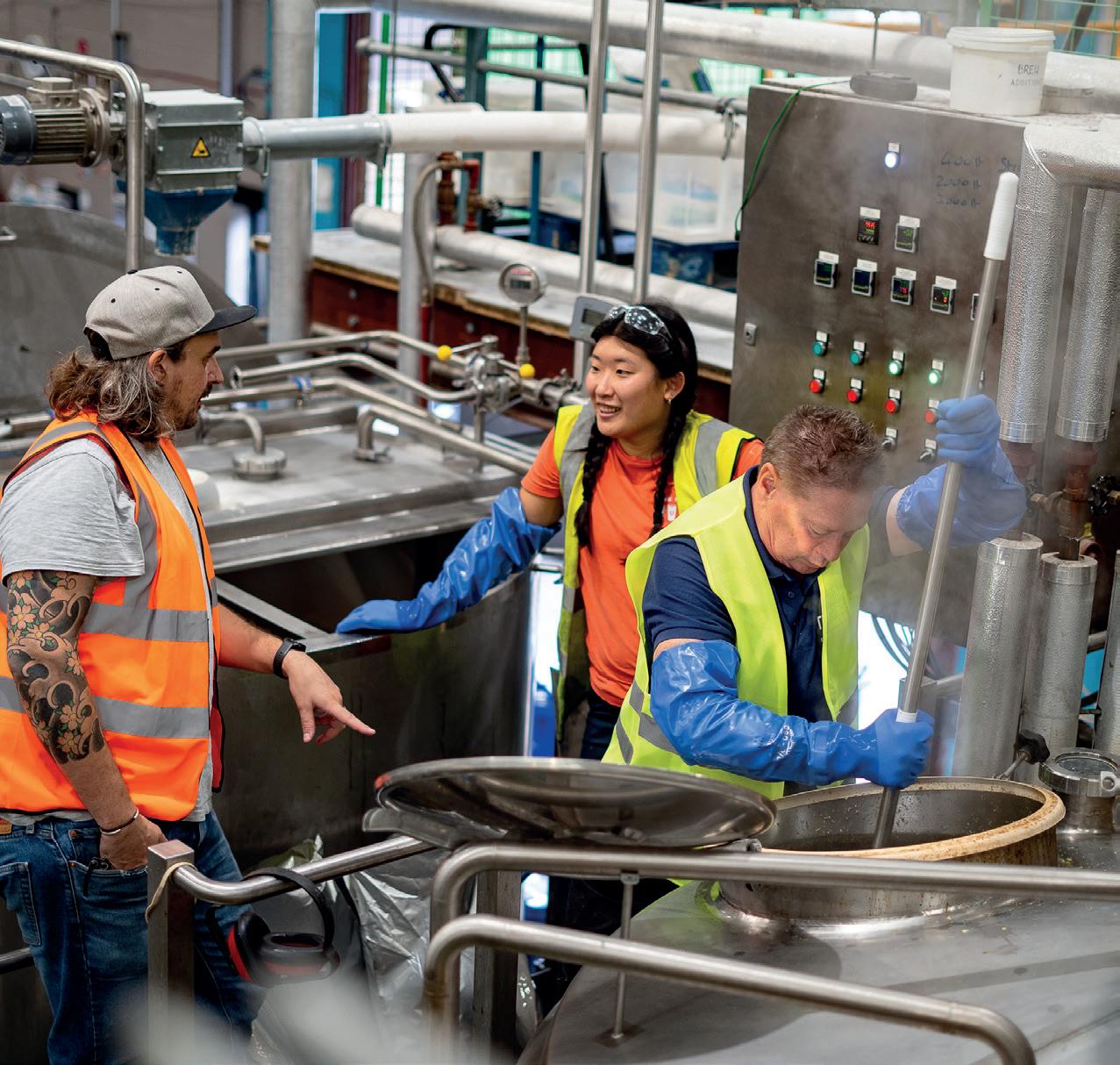
PBR as it was first known had been a long, hard struggle. Back in 1980 I had been invited by Peter Austin, known as the father of craft brewing in Britain and founder of Ringwood Brewery, to attend a meeting in an East London pub. The idea was to set up an organisation that, among other aims, would argue the case to government for lower rates of duty for small producers.
As a non-brewer I was there to offer advice on press relations. From that event came a series of meetings with politicians and civil servants to discuss excise duty and the particular problems faced by small producers in a market increasingly dominated by national and global brewers.
Economies of scale means more than just ultra-efficient, spick-and-span modern breweries controlled by computers. Big brewers are able to use their muscle to buy raw materials such as malt and hops at discounts small brewers can only dream about. It’s estimated that when AB InBev, the world’s beer colossus, bought Modelo in Mexico it stripped 20 per cent of production costs from the company. The result – as any visit to a supermarket will prove – is that the products of the global giants can be sold as cheaply as bottled water.
PBR is one of the most significant events in British brewing history. In the 1970s a consumer revolt against big brewers and their infamous keg beers led to CAMRA and a halt to takeovers and mergers that were destroying choice. CAMRA also opened up the market, allowing a new breed of small brewers to fire their mash tuns and coppers and, most importantly, to innovate and
offer fresh and exciting beers alongside standard mild and bitter.
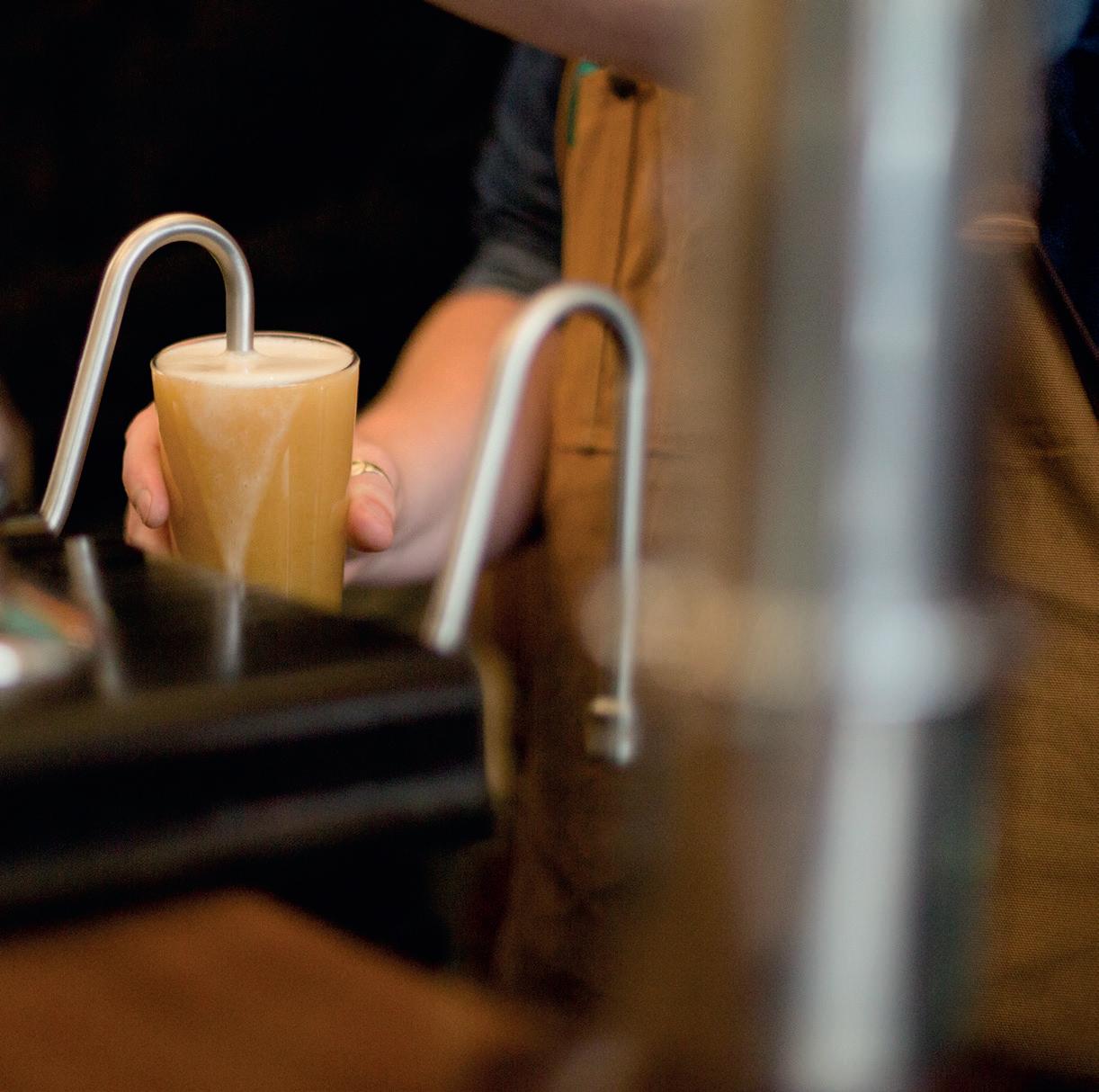
It was the early members of SIBA who introduced the first Golden Ales that changed the image of beer for younger drinkers and challenged the hegemony of over-promoted British apologies for genuine lager.
The introduction of PBR, later called Small Breweries’ Relief, allowed a small army of mustard-keen brewers – some former homebrewers, others refugees from bigger producers – to set up shop and offer a wider variety of beers to thirsty drinkers. I was a close observer: as editor of the annual Good Beer Guide, I had to shoe-horn all brewers into its pages. In 2000, the guide ran to 600 pages, now it’s close to 1,000 with most of the space taken up by brewers, who number more than 1,800.
As we celebrate the success of SBR we are also keenly aware of the challenges that lie ahead. With pubs and breweries closing as a result of the ravages of Covid and lockdown, the industry needs more support. Crucially, a steep cut in duty for all draught beer is needed to encourage consumers to return to pubs.
But as we raise a glass to salute such pioneers as Dave Roberts, Keith Bott, Carola Brown and the other SIBA pioneers, we can measure their achievements by going to a freetrade pub or beer festival, looking along the line of pumps and saluting the remarkable choice they have made possible.
Roger Protz is a writer, journalist and campaigner and former editor of CAMRA’s Good Beer Guide

27 www.siba.co.uk | SIBA Independent Brewer | Winter 2022
SBR@20 Continued on page 29
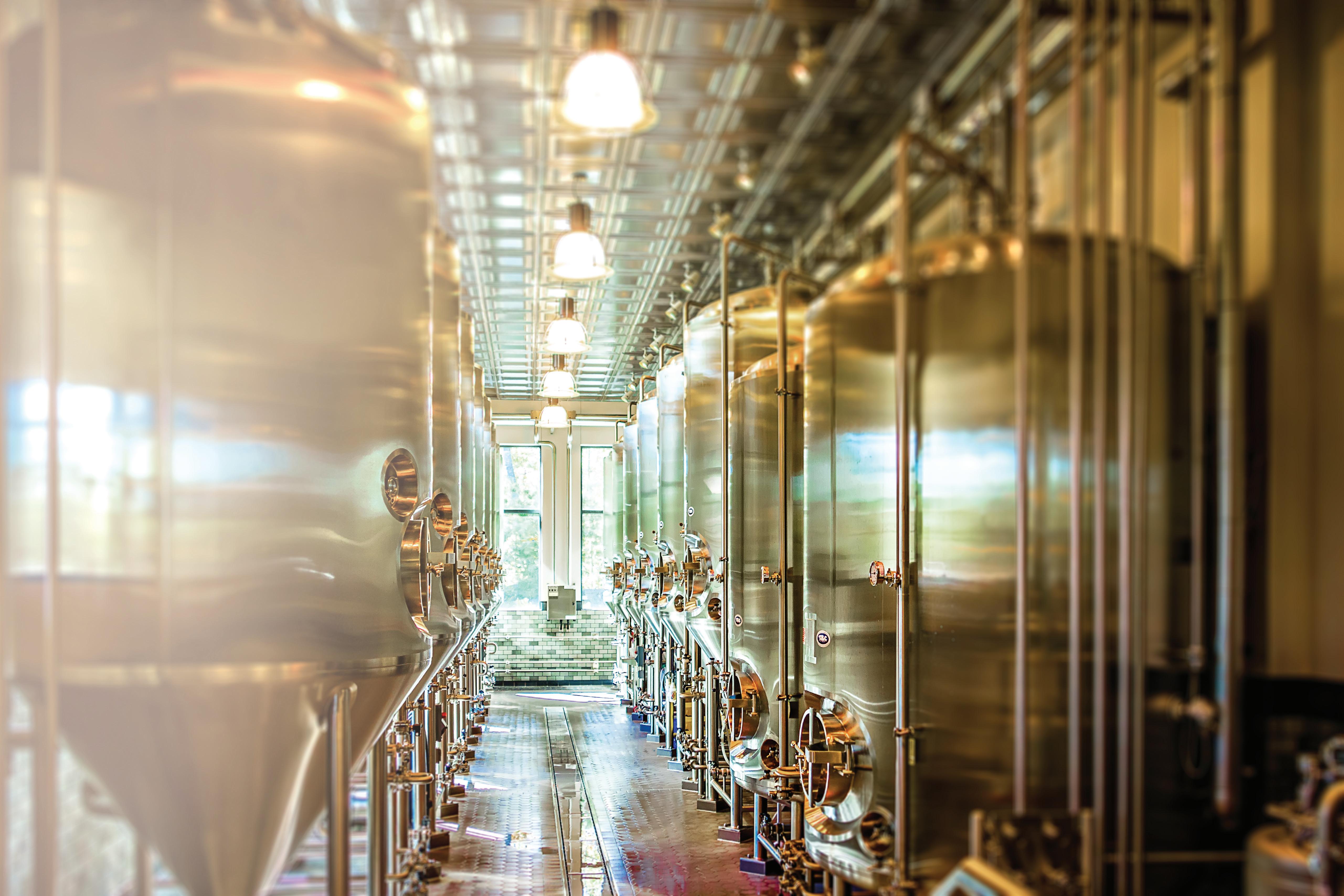




28 Winter 2022 | SIBA Independent Brewer | www.siba.co.uk Quality assured performance guaranteed IMPROVE PRODUCT QUALITY REDUCE PROCESS COST IMPROVE PROCESS EFFICIENCY REDUCE BEER LOSSES www.abvickers.com | abvickers@lallemand.com KETTLE FININGS Compac CG, Breakbright tablets YEAST NUTRIENTS Yeastlife O, Yeastlife Extra, Servomyces BEER CLARIFICATION Proto ne, Protosol, Vic ne, Liquid Isinglass, Alpha oc Paste FOAM STABILISERS Drifoam, Foamaid, Allfoam PVPP/SILICA GELS Alphaclar (PVPP), Britesorb (Silica hydrogel) ENZYMES Betaglucanase, Alpha amylase, ALDC, Aromazyme ANTI FOAMS Foamsol ANTI- OXIDANTS Vicant
The long campaign for SBR is won
Twenty years after Small Breweries’ Relief (SBR) was introduced, with more than 10,000 people directly employed by breweries and another 33,000 in a supply chain that didn’t exist before, I think it is fair to say the policy has been a success.

In 2002, as I drove to the Maltings Beer Festival I received a call from Damian McBride from Her Majesty’s Treasury, letting me know that the nigh on 20 year campaign for SBR, then called Progressive Beer Duty, had been successful and apologising for the way in which it was going to be announced. The Chancellor Gordon Brown then revealed in his budget that beer duty would be halved for smaller brewers which meant that
customers would enjoy cheaper beer during the upcoming World Cup. I remember feeling numb, after campaigning tirelessly for such a long time I couldn’t take in the enormity of what we had achieved. Dave Roberts was the architect of the scheme, Peter Haydon had done a huge amount of work and Nick Stafford was finding practical ways to supply beer to pubcos, challenging the tied model. Between us, along with all the trustees of SIBA, we had successfully convinced Government that investing in smaller breweries was not only worthwhile but would go some way to improving access to a market that was becoming even more foreclosed.
We had spoken to countless politicians, swathes of Customs and Excise officials, travelled to Brussels at the behest of John Bridgman the then head of the Office of Fair Trading (OFT), who recognised our plight and brought pressure to bear on our behalf, and pulled as many publicity stunts as we could think of.
So why, in 2002, were we successful? In his book Damian McBride describes the success as “my finest hour as a civil servant”. He had coached us, worked behind the scenes to garner political support and seen off what he described as “the slick lobbyists representing the big companies” all to make a point and to spite officials who resisted change. Add to this John Healey’s appointment as Economic Secretary to the Treasury, John has always been a huge
2019 there were over 100 members of the LBA, the vast majority of which were independently owned. It seems clear that this exponential growth was a direct result of the introduction of SBR in 2002 and led to the extensive innovation that came with the explosion of new breweries.
supporter of beer and pubs and recognised the levelling of the playing field that SBR offered.
Looking back it wasn’t our amazing lobbying nor our political nous that had won the day, it was a great big helping of serendipity and, most importantly, we sang from the heart, were passionate about creating a fairer system, pragmatic in what we called for and eternally positive. At no point did we ask for others to foot the bill, we avoided bad mouthing others in our industry or sector and we spelt out how the investment would benefit all.
Now 20 years on, as I look at an independent brewing industry thriving, with opportunity for all, large and small, that employs huge numbers of incredibly passionate people who care about what they consume and how it’s made, that sits at the beating heart of communities and that continues to challenge and innovate, I am hugely proud of what we achieved. The fight isn’t over, tough times lie ahead, we are still fighting to access the market and the price differential between the on- and the off-trade continues to make sofas more appealing than bar stools, but if SIBA stays focussed on finding pragmatic solutions, challenges woefully thought through legislation and champions Great British Beer we have hope.
Cheers
Keith Bott is owner of Titanic Brewery and a former SIBA Chairman

"SBR gave Abbeydale Brewery the confidence to invest to grow from a hobby business, employing just two people besides myself, into the thriving brewery it is today - now employing around 50 people across the brewery and our pub."
Patrick Morton, Abbeydale Brewery
The brewer’s perspective
As a new brewery founded in late 2012, Small Breweries’ Relief had created an environment in which we and many other small start-up breweries could launch and flourish. Without the SBR subsidy in beer duty, it is unlikely that we would have been able to overcome the significant barriers to entry into the sector.
The brewing scene we entered into in London was changing rapidly: by the end of 2012, there were 35 brewing members of the London Brewers Alliance (LBA), up from around 15 in 2010, and it felt like we were arriving late to the party. This boom in breweries continued and by
It is safe to say that without the duty relief available to us as a small brewery it would have been much harder, if not impossible, to get Five Points off the ground in the first place. We enjoyed four years of the full 50% relief available which allowed us to invest in additional capacity and more efficient equipment, and moreover grow the business in a sustainable manner. As a communityfocused brewery, we were also able to create employment opportunities in the local area, become the first Living Wage accredited brewery, help to set up an apprenticeship scheme with Hackney Community College and Hackney Council, and generally contribute to the economy.
I struggle to believe that without the introduction of SBR we would have the same thriving beer scene that we do today, with the expansive range of beer styles brewed by independent breweries across the UK - something that all beer drinkers should be grateful for!
Greg Hobbs is Director of Brewing at The Five Points Brewing Company

"Would we be here without SBR? No. Would we be able to offer beers to pubs without SBR? No. Would the British beer scene be better without it? NO!"
Tony Pygott, 8 Sail Brewery
"This is our brewery's 25th anniversary year. This means that we spent 5 years trying to compete against the largest breweries in the country while paying a full rate of duty. No matter how hard we pushed, we struggled to build momentum without eating up all our profit. After SBR was introduced, we had cash to invest immediately in extra casks and vessels - after 5 years we could expand and take on staff. I cannot emphasise enough the way that it changed our business."
Christopher Gooch, Teme Valley Brewery
"It was a great idea when introduced in 2002 and initially helped many breweries, like Hogs Back, who were established in 1992. However the design was not well thought through and it needed an initial change in 2003 to address a catastrophic short term cliff edge, and should have been reviewed again 5 years later when it became evident that it was acting both as an encouragement to market entry but a constraint on growth past the artificial 5,000 hectolitre barrier. The new proposals are much better and will help business growth, but it is very frustrating that it has been delayed until the summer of '23, rather than February. But at least there is a firm commitment to positive reform and the whole Industry can reunite to focus on how to save the cask ale sector."
Rupert Thompson, Hogs Back Brewery
29 www.siba.co.uk | SIBA Independent Brewer | Winter 2022 SBR@20
Continued on page 31
Great beer needs a filler that ensures the highest product quality. Especially for small and medium-sized breweries, our compact fillers offer the same innovative technology as larger KHS fillers. In addition, KHS stands for maximum reliability, keeping lines running steadily at a very high level – supported by our dependable on-site service. Our filling systems are available for all types of bottles, cans, and kegs. Would you like to know more? Please contact us at www.khs.com














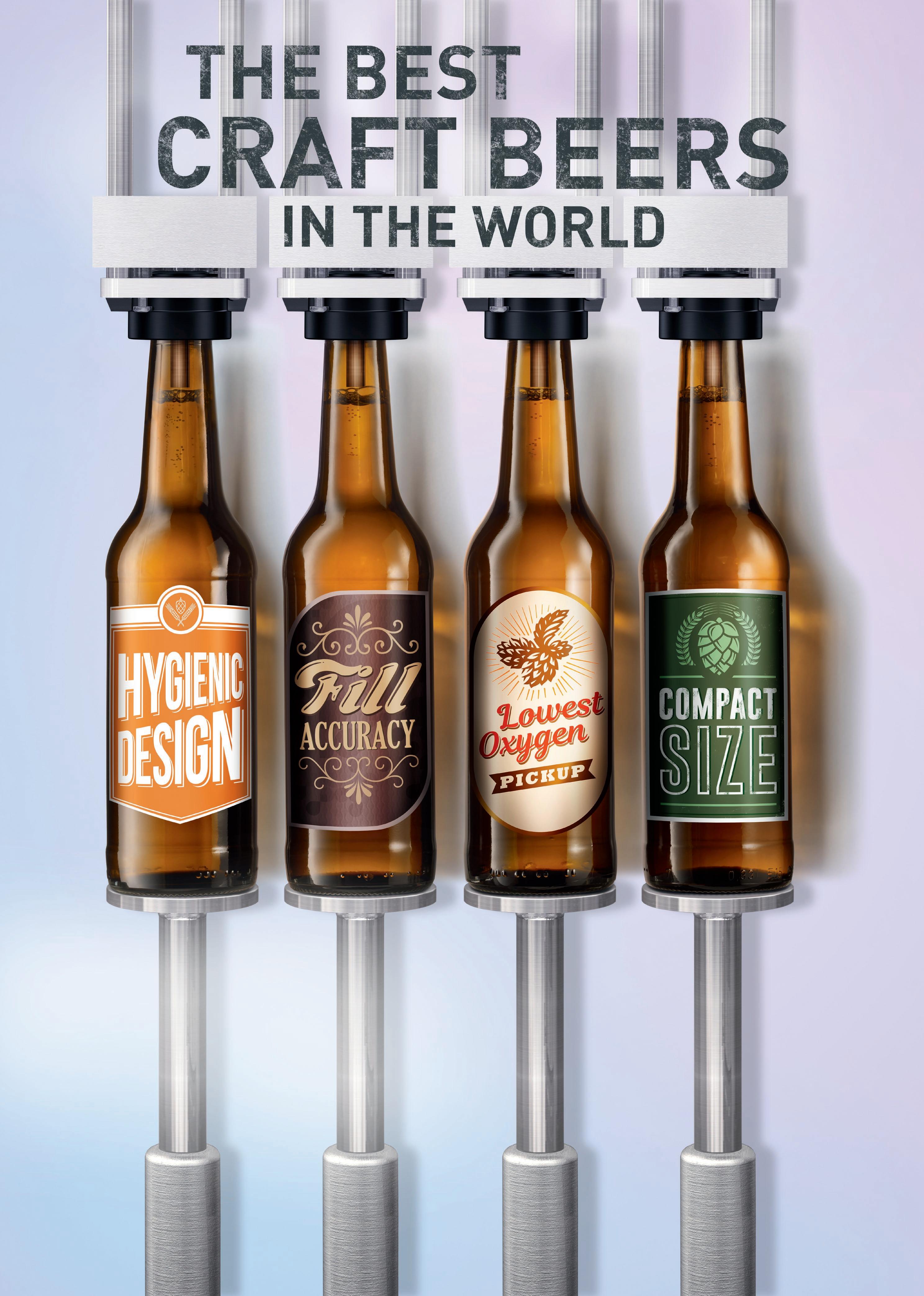
DESERVE THE BEST FILLING SYSTEMS.
KHS brings state-of-the-art technology to craft breweries.
The future of SBR and craft beer


Few changes have been made to SBR since its inception in 2002: the ‘upper limit’ was moved from 30,000 hectolitres (hl) per year to 60,000hl in 2004; high (and low) strength beer duty was introduced in 2011; and the term ‘Progressive Beer Duty’ was changed to ‘Small Brewers Relief’ sometime in between (for reasons nobody knows). Given the pressure brought to bear since the very day of its introduction, by some reasonably large, vocal opponents of the scheme, this is remarkable, and a testament to SIBA’s growing political nous and confidence over the years.
However, and despite the majority of the industry remaining relatively content with the status quo, the pressures eventually brought about review, consultation and finally reform. The deep space black-hole level political vacuum that is the Johnson government in August 2022 has led to delays until at least the summer of 2023 and we can only assume that the negotiated, carefully planned reforms will eventually go ahead as anticipated.
The planned changes, now due to be introduced in August 2023, include a number of considerations for the small(ish) brewer:
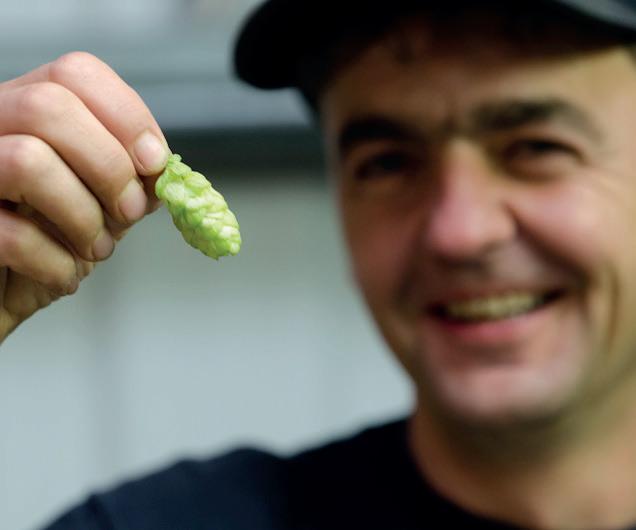

A relatively small number will see their duty rates rise by a marginal, though annoying, amount. These are the new ‘inbetweenies’, replacing the ‘squeezed middle’, and caught at the wrong size (around 5,000hl per year) at the wrong time. Whilst their larger competitors receive a handsome duty reduction, these poor souls will
be raising prices. What will become of them? Those below 5,500hl, and focused on the cask wholesale market, will need to expand capacity and sales to get as close to 10,000hl as soon as possible in order to remain competitive. Those more into keg, or into local distribution, may not feel the pressure quite as much.
Brewers of all sizes will need to pay attention to the average ABV of the beer they brew – the percentage of full duty they will pay will be based not just on the volume of beer they produce, but on the volume of pure alcohol they produce. Cask specialists won’t be impacted so much, and no and low specialists will do very well, whilst the Double IPA brewers will find their duty rates rising linearly with their average ABV. This is in line with the Government’s desire to link alcohol duties to health outcomes (that is the health of the consumer, not the brewer).
Brewers focusing their efforts in the on-trade will begin to see the benefits of the divergence of duty from the take-home market, with a modest duty reduction of 5% for beer packaged into casks and kegs. The hope is that this reduction will grow beyond 5%, and that, somehow, those brewers without pubs will manage to keep some of this reduction from the national retailers.
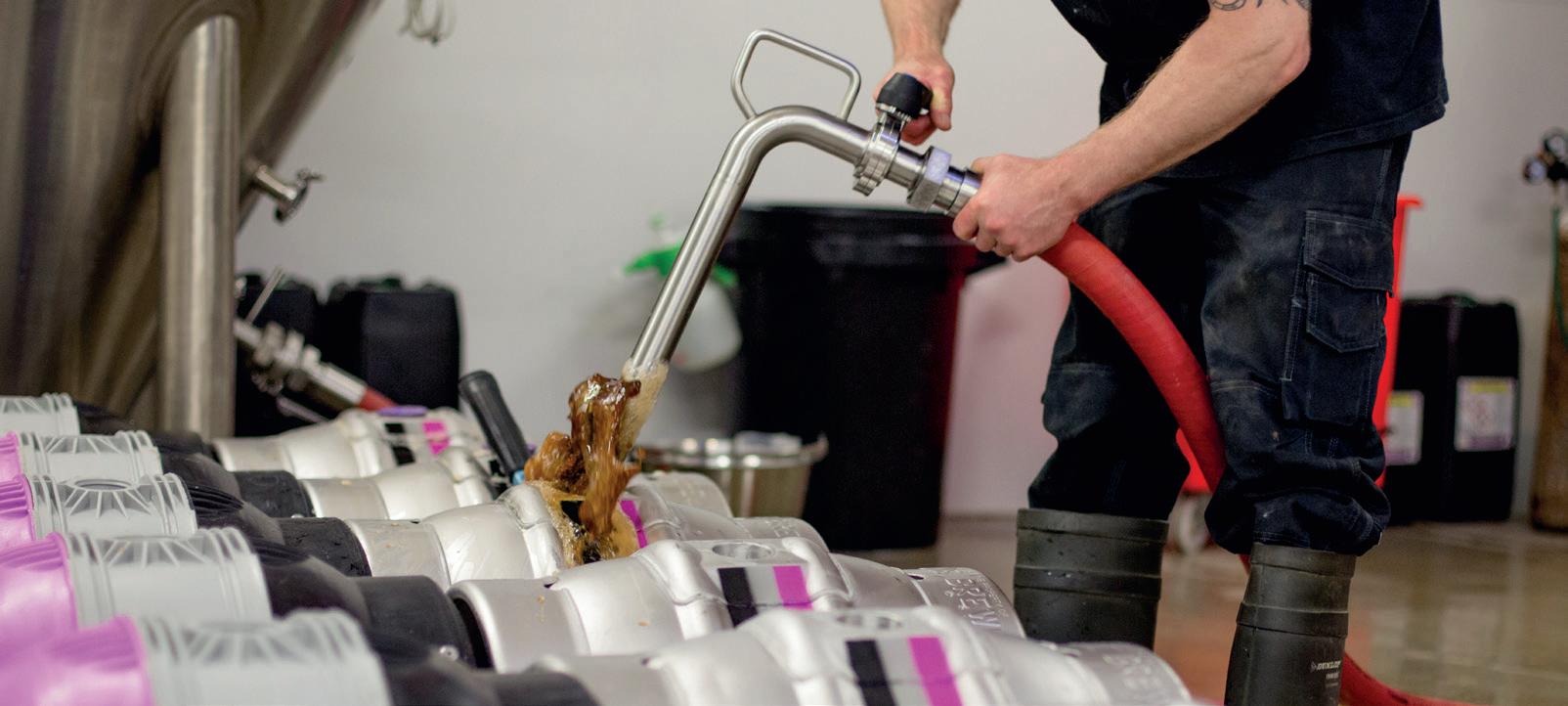
But the biggest impact on the industry might be on the ordinary bitter producers, those who specialise in striving for the perfect pint of relatively low ABV cask ale, for the current plan includes raising the upper limit of Low Strength Beer Duty from 2.8% to 3.4%, giving producers of all sizes a handsome reduction in full duty of over 50%. Expect to see some national brands going into the marketplace at some very competitive prices, and whilst
such national brands may not be considered a direct competition to the small brewer at the moment, the impact of this change is likely to put severe downward pressure on cask ale price points. Ironic really, since the main thrust of the argument for reform was centred around the purported negative effect PBD has on the price of wholesale cask ale.
Finally, of course, there is always the cider question – massive amounts of thinking has gone into restructuring the whole alcohol duty regime, simplifying it and ‘making the basis of alcohol taxation more economically rational, with fewer distortions and arbitrary distinctions’, yet the massive cider producers will continue to pay half the alcohol duty that brewers do, and now the distortion is in plain sight, glaringly obvious. Our lobbying days are clearly far from over, only this time I suspect we’ll all be making the same argument.
Eddie Gadd is Managing Director at Ramsgate Brewery
31 www.siba.co.uk | SIBA Independent Brewer | Winter 2022 SBR@20
SBR @20
The Belgian Connection
The brewers of Belgium and the UK have enjoyed a long history of learning from one another. Breandán Kearney considers whether contemporary UK brewers are influenced by Belgian beer as much as their predecessors, and what that influence might mean for the UK beer scene today.

Belgian beer has always occupied a niche space in the United Kingdom. Imports of Belgian beer to the UK remain modest, if consistent, with diversification in recent years rather than growth. Belgian beer makes up less than 2% of
the entire UK beer market. When you consider the place that industrial Lagers, Americaninspired IPAs, and traditional English ales occupy in the UK, Belgian beer is not only commercially irrelevant, but feels disjointed from the rest of the scene.
Despite all this, Belgian beer continues to have an important influence on UK brewers.
Deeply intertwined
Part of the reason for this is that the UK and Belgium have long enjoyed a close relationship when it comes to beer, learning from each other and influencing each other's brewing cultures. This deeply intertwined history has left a mark, even if subconsciously so.
There are the similarities in the conditioning of beers, with the secondary fermentation in package of the UK’s real ale mirroring the traditions of Belgian bottle refermentation; a tradition which is alive and well in Belgium today among regional family brewers and smaller independent producers alike.
Importantly, it was a journalist from the UK, beer writer Michael Jackson, who not only popularised Belgian beer around the world with his 1991 best-selling book Great Beers of Belgium, but who classified Belgian beer to help UK consumers and brewers understand it, defining styles which are largely followed today when describing Belgian beer.
32 Winter 2022 | SIBA Independent Brewer | www.siba.co.uk
Comment: Breandán Kearney
Comment: Breandán Kearney

Process and Tradition
The hop growers of Kent have shaped the ways in which their counterparts in Poperinge have evolved, particularly when it comes to growing techniques and hop variety selections. Belgian hop farmer Joris Cambie of De Plukker, for example, works with an English hop cooperative for the pelletising and distribution of his hops, the main varieties of which are mostly of UK origin: Goldings, Target, Challenger, Pilgrim, Brewer’s Gold, and Fuggles.
The influence of UK beer styles can be seen to this day in iconic Belgian beers: the process of dry-hopping Orval since 1931 is thought to have been brought back from England by an assistant brewer at the Abbey who came from East Flanders but who had studied brewing in the UK before arriving at Orval.
Rodenbach’s origins of foeder-aging its Oud Bruin beers are thought to be connected to the production of Porter in London, with Eugene Rodenbach having studied in England to learn more about acidification, wood aging, and blending.
Malty, lower alcohol Belgian Pale Ales such as De Koninck were heavily influenced by the influx of English ales brought over by British soldiers during the First World War. Brasserie Silly claims that Belgian Scotch originated when Scottish soldier Jack Peyne assisted Silly in producing an ale with imported UK ingredients specifically for consumption by soldiers stationed there. After the war, Peyne married a Belgian woman and settled in Silly, working for the brewery for many years.
Theatre of Beer
When it comes to Belgian beer influencing contemporary UK brewers, there seem to be three main factors.
The first is the theatre of Belgian beer. In a changing market, UK brewers are more keen than ever to stand out in their glassware, packaging choices, and presentation. The aesthetics of Belgian beer has inspired UK brewers to think more about the beer experiences they offer, rather than just what’s in the glass.
Six°North in North East Scotland, for example, has produced beers inspired by Belgian beer culture since 2013, with its bars in Stonehaven, Aberdeen, and Dundee all serving different styles of beer in carefully selected glassware, from stemmed tulips to gold-rimmed goblets to dimpled tumblers. Other producers have opted for Bières Belges, Champagne, or Steinie bottles, sometimes with cork and cage for extra panache and sense of occasion.
Acid Test
The second factor of influence is Belgium’s sophistication when it comes to acid, and an increasing interest in the possibilities of complex fermentations. More and more UK brewers are embarking on spontaneous and mixed fermentation projects, offering huge potential for flavour diversity.
Burning Sky brewery, located in a Sussex barn, for example, produces a range of beers inspired by Belgium, including provision ales matured in oak and beers which have been spontaneously fermented after inoculation in a coolship.
Wild Beer Co. of Westcombe has been inspired by Belgian barrel-ageing for acidity since it began. Duration Brewing in Norfolk borrows the spirit of Belgian farmhouse brewing in producing, among other beers, wild ales that are considered and complex. Holy Goat is a Dundee-based brewery specialising in the production of mixed fermentation and wood-aged beers, and recently poured alongside Belgian brewers and blenders at the Oud Bruin Fest in Kortrijk in West Flanders.
Belgian beer has always occupied a niche space in the United Kingdom. Imports of Belgian beer to the UK remain modest, if consistent, with diversification in recent years rather than growth.
Experimentation
The third factor is a penchant for experimentation, while trying to maintain the balance and drinkability so obvious in Belgian beers. This might be in the use of more technically challenging ingredients such as raw wheat or in the deployment of a nuanced spice and herb addition.
It’s here that breweries such as Solvay Society excel. Founder Roman Hochuli was born in Brussels but opened his brewery in London, producing what he describes as “truly inauthentic modern Belgian beer”: think of a Saison with kiwi; a Witbier meets Session IPA; a dry-hopped Patersbier.
The owners of Anspach & Hobday—born in Bermondsey and with sites in Croydon and Camberwell—have maintained strong personal relationships with Belgian breweries over the years, and this shows up in beers such as their Table beer and Witbier.
And Bristol’s Lost and Grounded has a Belgian range which includes a Witbier (Hop Hand Fallacy, 4.4% ABV), a Belgian Tripel
(Apophenia, 8.8% ABV), and a Belgian Style Ale (Saison D’Avon, 6.5 % ABV), all executed to be both authentic representations of classic styles as well as super-drinkable interpretations of their own.
Close Encounters
Much of the relationship between the Belgian and UK beer industries is built on proximity. But Brexit threatens to create distance. Freedom of movement has ended, with a right to travel and work no longer guaranteed for UK nationals in the EU. Cultural collaborations are likely to be affected, particularly in the fields of academia, science, and the arts; a development that will impact education and research for UK’s brewing community in the long term.
Increased duties on the import and export of ingredients and equipment following Brexit may force Belgian brewers to work less with UK materials and UK brewers to work less with Belgian ones, changing how they brew and what they produce over time.
As the beer industry changes faster now than ever, it would be exciting to see UK and Belgian brewers matching the significant creative collaborations of their predecessors. But questions remain: will Brexit put an end to this influence over time; or will the historical connections between these two proud brewing countries be strong enough to ensure they inspire each other for generations to come?
33 www.siba.co.uk | SIBA Independent Brewer | Winter 2022
Breandán Kearney is a writer, photographer, and podcaster, originally from Ireland but now based in Belgium. He is the Editor-in-Chief of the awardwinning website and podcast Belgian Smaak.
Cash in the Attic
Oli Hurlow and his business partner Sam Back met at University, where they developed their love for beer through Sam’s first foray into homebrewing from a bucket in his bedroom in their shared student house. The venture expanded modestly at first after Sam left Uni and returned to his home city, Birmingham, where his growing brewkit was moved up into his attic – and the name and idea for his future business was born!
The pair teamed back up once plans for Attic Brew Co were formalised, and the brewery and taproom launched in 2018 onto an embryonic Birmingham craft beer scene where they were genuine pioneers. Four years later, Attic has not only weathered the storms of the past three years, but achieved rapid expansion and development that they could only have dreamed
of back in 2018. Attic is very much the centre of the local craft beer scene, and Oli and Sam have remained true to their ethos of placing their beers at the heart of community gatherings, with the taproom very much at the centre of that social circle. Covid, and the advent of the Attic webshop, have allowed the brewery to expand its horizons to the rest of the city and beyond to a national market, and help spread the word about the beers and the growing craft beer scene in Birmingham. Attic is now on the hunt for further retail sites to add to its taproom, initially in Birmingham but with eventual ambitions to take Attic further afield. Caroline Nodder, SIBA Independent Brewer’s Editor, spoke to Oli in early November to hear more about Attic’s plans for the future and how far the business has come…

34 Winter 2022 | SIBA Independent Brewer | www.siba.co.uk Business profile: Attic Brew Co
Business profile: Attic Brew Co

Business Basics
Name: Attic Brew Co
Founded: November 2018
Location: Birmingham
Owners: Oli Hurlow and Sam Back
Annual production: 4,000hl (projection for 2022)
Brewing team: 6
Total Staff: 14 (full time)
Flagship beers: Intuition (4.4% ABV Pale Ale), Birmingham Pilsner (4.5% ABV Lager) & Signals (5.6% ABV IPA)
Production split: 77% keg, 20% small pack & 3% cask
Key export markets: No export
How did Attic come to be founded and how has the business developed since then?
“I think it was quite a similar story to probably a lot of breweries, in that we came from a homebrew background. We went to Uni together, we lived together at Uni, the two of us, and Sam was just starting to get into homebrewing, from a bucket in his bedroom. Some pretty ropey stuff! But it was nice cheap beer to get us through Uni. And then he just carried that on. We went our separate ways, he moved back up to Birmingham, where he's from, and I was down in London, and he carried on homebrewing, and refining it and investing in his own setup in his attic - which is where the name comes from! I've never brewed beer myself, I just got used to drinking his. But he came to me and said, ‘look, I want to start a brewery, I want to make it my job, and I want someone to do it with me. So that's where I came in. I moved up to Birmingham and went to work. We started out really, really small, only about 800 litres a week we were producing and that all very quickly got hoovered up by our taproom. We always had the taproom and it was always busy so we started off being more of a brew pub really, with a tiny brewery that we had scraped together the funds to buy – we didn’t have much investment to start with. But we were able to plough any money that we made back into the brewery and expand. We have now taken on the next door unit and knocked through. So the brewery itself has moved into that new space. But the taproom is still in the same space as when we opened.”
What is the ethos behind the brewery and your beers?
“We were always very ‘taproom first’. And the reason behind that was that, to us, craft beer is great and you get all these different flavours, but at its heart beer is about bringing communities together. It’s about people coming in for a beer, and we wanted to set the taproom up very much like a local pub where people would come and get to know one another and have a chat over a beer. We've always been very focused on the surrounding area, and then moving on from that to Birmingham in general, and we want to serve the people of Birmingham with good beer and we want them to then tell other people about Birmingham via that good beer!”
How would you describe the craft beer scene in Birmingham in 2022 as compared to when you launched?

“It was lagging behind some of the other major cities in the UK. I mean, you look at some of the scenes in London, Bristol, Manchester,
Leeds, and they're very vibrant scenes. When we turned up in Birmingham, there was really very little. And that was one of the things that made us confident that this was a good opportunity to pursue in a city with a massive population. It was really under-served with good beer. Setting up here, we didn't have too much in the way of competition at the time. And actually, what we did have in terms of ‘competition’, was really us all building the scene together. And definitely since then the scene has improved hugely. Obviously, I think we have been a part of that. But there's also been some amazing breweries and some great beer coming out of the city. I think it's taken a bit of a different path to a lot of other cities, I don't think there are as many craft beer focused bars, but that's not to say there's not a demand for the beer, I think it just comes through in a different way. But it's growing, and it's a really exciting place to be. Certainly where we are it's such a vibrant beer scene now. It's a full day out to come here. You've got three breweries here, we've got loads of different little bars serving really good beer, food, great bottle shops. It's a really nice little centre for beer within Birmingham.”
What effect has the pandemic had on Attic?
“It's a question I've been asked a few times, and it's a strange answer. Obviously, it was probably one of the worst times, if not the worst time, for the hospitality industry, in living memory. But without it, we would certainly not be the business we are today. It really did force our hand to pivot. We were literally just making enough to sell on site. And that was everything we were doing. Lockdown forced us to can the beer, which meant we could then distribute it a bit further afield, rather than just to our hyper local community. So that started to spread the brand a little bit further in the city, and eventually a bit further again, across the country. When we reopened, we had a lot more demand from pubs because they'd had a chance to try the beer. And the other big thing was that because the government was trying to stimulate a bit of growth, they were unusually generous with the loans that they were willing to provide. So we took advantage of that and we expanded the brewery quite significantly. That is just something we never would have had the opportunity to do. Certainly not without selling our soul a little bit to investors. So in a weird way the pandemic has been amazing for us. This is where we would have liked to be in several years’ time, we just never thought there was any possibility that we'd be able to get where we are now.”
35 www.siba.co.uk | SIBA Independent Brewer | Winter 2022
Continued on page 37
36 Winter 2022 | SIBA Independent Brewer | www.siba.co.uk High quality labels to help your brand stand out, with advice and support your business can depend on We offer high quality, cost efficient digital printing with a range of specialist finishes Our team will support you through every step of the process to ensure you always get the best result We have partnerships with award-winning brewers across the UK www.valelabels.co.uk 01823 665504 Unit G, Monument View, Chelston Business Park, Wellington, Somerset TA21 9JF
How are you approaching the issue of sustainability?
“It was nice to be able to have this big new expansion, because we were able to keep in mind sustainability when we were doing that. We’ve put a very efficient brewhouse in which recovers a huge amount of heat, so it's really efficient. Relatively speaking, certainly compared to the previous brewery we had, it's really quite minimal on energy consumption, which is brilliant for environmental reasons and also in the current climate for energy bills. We also installed a nitrogen generator, which I think is a really important step, because rather than using CO2 - we still use carbon dioxide to carbonate beer, but we tended to use an enormous amount of CO2 just moving beer around, moving it in and out of tanks. And that CO2 was just going straight into the atmosphere. So we've installed this nitrogen generator that essentially takes atmospheric nitrogen out so we can use that when moving beer around, and then put it back into the atmosphere, and it's no net gain. We are also working with this startup company locally that is looking to develop a process to turn some of our waste products into a sustainable food source - using it to grow meat in a lab. We are a vegan brewery, so that’s a subject quite close to our heart."
We’ve put a very efficient brewhouse in which recovers a huge amount of heat, so it's really efficient. Relatively speaking, certainly compared to the previous brewery we had, it's really quite minimal on energy consumption.
How successful has your online shop been?
“We launched it about a week into the pandemic. We had one of our regulars from the taproom who just dropped us a line and said, ‘look, you're probably gonna need an online shop, I'll give you a hand’, which meant we could get there really quickly. Then over lockdown it was brilliant. And we had a whole load of learning - we were learning to can the beer, we were learning how to process the orders and get them delivered efficiently. It was really busy, and it kept us afloat. Nowadays, we predominantly sell in to the on-trade, so we’re very much a keg focused brewery. But the webshop has started to increase in demand recently, I think partly because of Christmas, and partly because I think we're improving how we do it. I think there was a period of massive excitement about going back out to drink. And I think it's probably starting to even back out again now.”
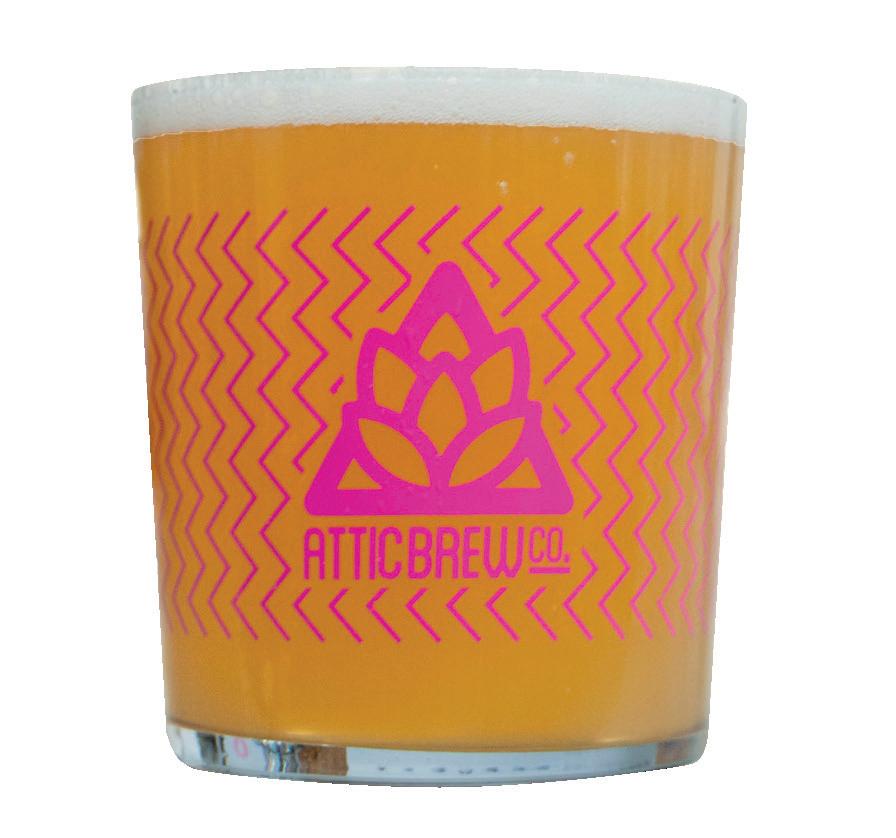
You have a Code of Conduct very clearly signposted on your website. How have you handled issues around inclusion at Attic?
“We've been quite small brewery for much of the time. So we've always had a feeling for the whole team. But as we've grown, we've felt the need to put things down in writing. I think the truth is that there's still a lot more for us, and as an industry, to do but the fact that we've got the code of conduct published means that we can be held to account. Also it means that it's out there for the public to see and they can know what our expectations are in terms of behaviour, and when they're coming into the taproom they can see what we are expecting of our staff as well.”
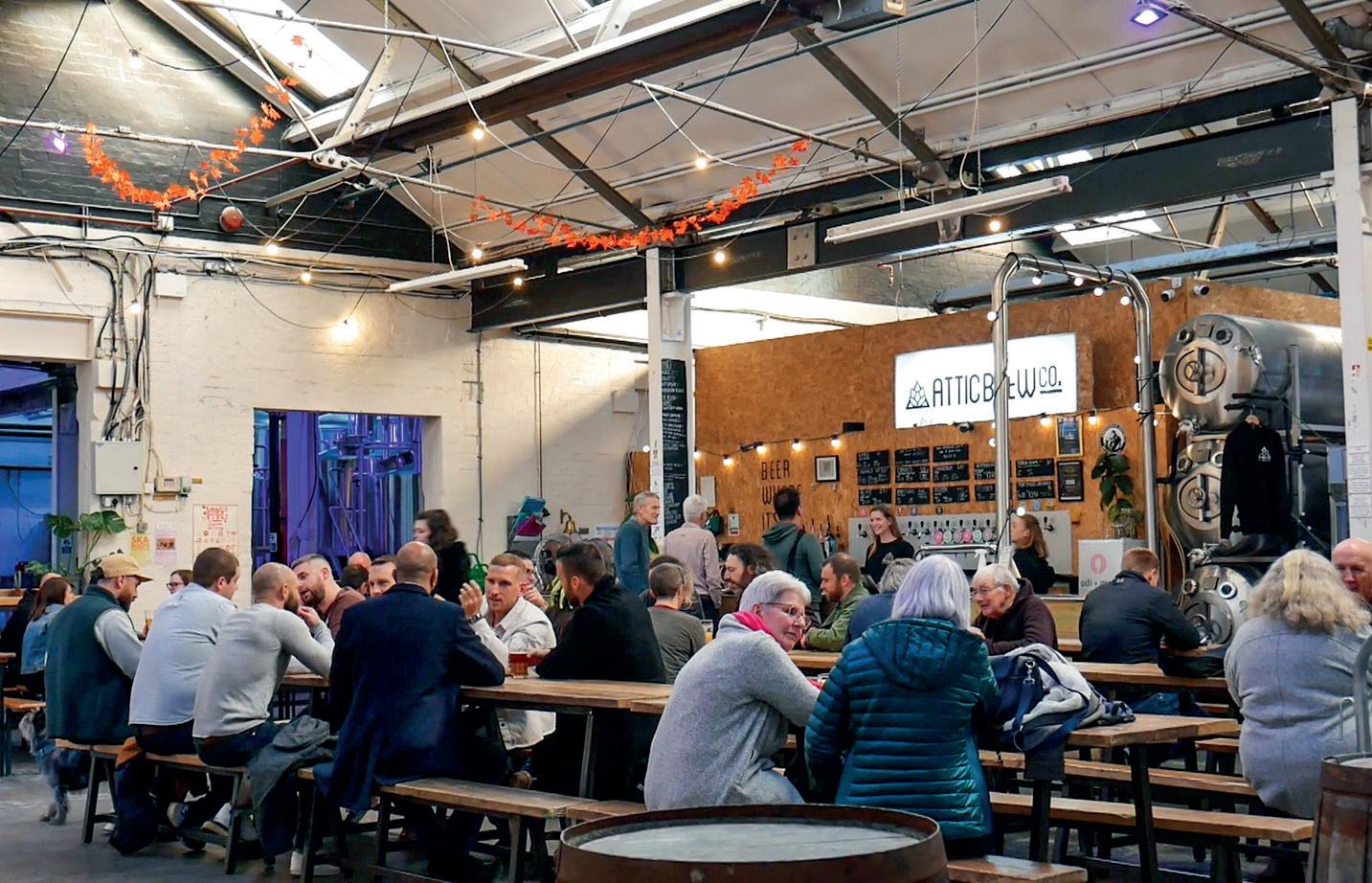
37 www.siba.co.uk | SIBA Independent Brewer | Winter 2022
Business profile: Attic Brew Co
Continued on page 39
CRAFTED



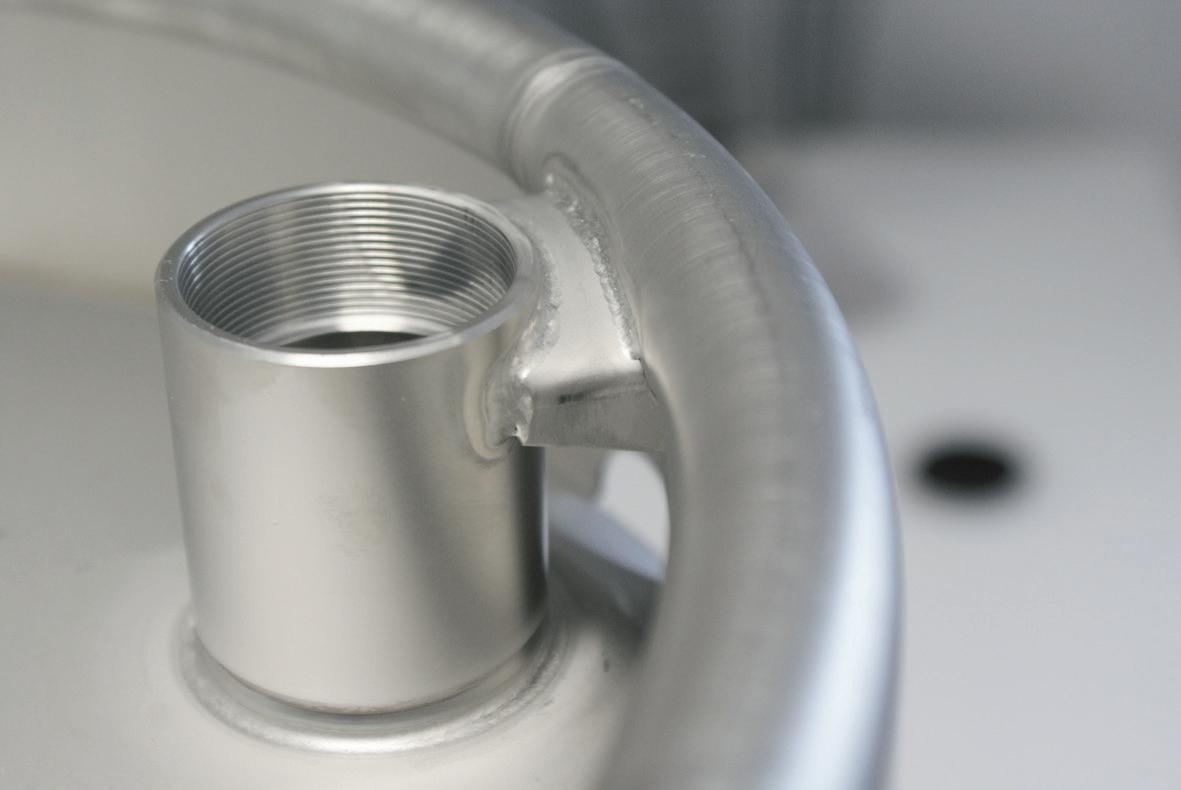

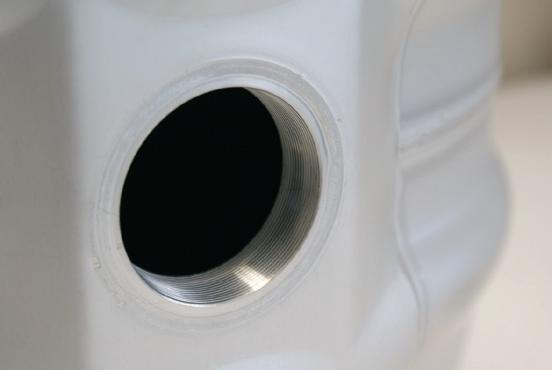



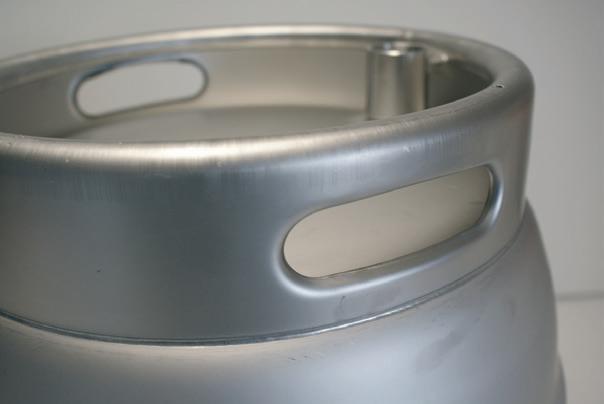




We
machined
Our
This is
stronger and more
STANDARD CASKS 4.5 , 9 & 18 gallon From stock or bespoke manufacture: ndlkegeurope.com 01142 699080 info@ndlkegeurope.com
have produced the most ergonomically designed handle hole that is large enough and fully rolled under to eliminate sharp edges. A closely welded finger guard keeps fingers from being caught between the chime and keystone. Precision
shive inner.
keystone has a machined inner to help the bung grip and make a tight fit.
a
accurate weld.
FOR QUALITY
Business profile: Attic Brew Co
How important is your taproom to your business?



‘We've always been interested in the beer, for sure that's a given, but certainly from my point of view, out of the two of us Sam has always been the brewer and I've been a bit more invested in the social side of it. But between us we realised why we liked beer was because it's just great to be able to go out and have a couple of pints with people. And there was a lot of news, and still is, about pubs closing. About losing that third space when you’re working from home, to go and meet people. And we thought, there's obviously a need for this. It’s what we want from our beer anyways, to get people together. We've got quite a big site, so we've got space to do it, and there was no reason not to. And obviously, from a commercial standpoint as well, it's been really helpful, particularly for a new business. Especially for a brand new brewery trying to establish a foothold, particularly in a place like Birmingham, where there was no knowledge at the time of craft beer and the opportunity of craft beer was actually relatively small, because there wasn't much of a market. It really gave us a platform to get people to know about us and be able to try the beer, and then it gave us somewhere to start from. I really credit the taproom with being the reason that we got through Covid, even when the doors were shut, because in the first year that we were opened before Covid hit we became a real part of the community. People knew us, and we knew them, and they really wanted to support us as lockdown happened. And it's still a massively important part of the business. It's still our single biggest trade customer, much bigger than any of our other accounts.”
Tell us more about the type of events you hold at the brewery.
“We have got a series of rotating street food vendors in at the taproom, so we get a different food vendor every weekend, which keeps things nice and new and refreshing. Events wise, we've got a pretty broad range. We have regular craft fairs that we hold. And then we have art shows from local galleries, we put live music on and we've got comedy nights every now and again. Everything we do is free to enter these days, it’s designed to get people in and to get people out and doing something. So we're not looking to make money necessarily off events, just getting people through the door is useful.”
What is the main focus for Attic for 2023 and beyond?

“Similar to with the taproom, we want to be able to interact with people directly and to sell beer to people directly. It's always been a core goal of ours. So with the taproom being one place, we want to open another bar next year. And hopefully, over the next five years, a couple more. We're looking at one in Birmingham for next year. And then probably the surrounding areas we're hoping over the following few years. But in addition to that, we also want to start to get a bit more national recognition. And to see our beer elsewhere, with the goal of telling people that Birmingham has actually got some pretty cool stuff going on. Generally people tend to think of Birmingham as just full of concrete monstrosities, and not having a huge amount going on. And you do need to scratch the surface a bit, I'll admit, but I think that if you've had the chance to drink our beer somewhere and you make it to the taproom, then you have been forced to scratch the surface, and you've made the journey out a little bit outside the city centre, and suddenly you're in the area we're in, and then you can come to the taproom but also go down the road and you’ll find some amazing places to eat and drink. Suddenly you've had this great day out in Birmingham, and you’re starting to change your opinion.”

39 www.siba.co.uk | SIBA Independent Brewer | Winter 2022
Continued on page 41















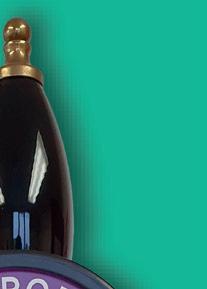






































































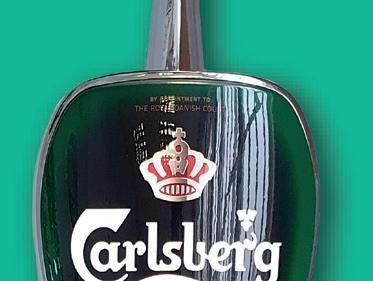











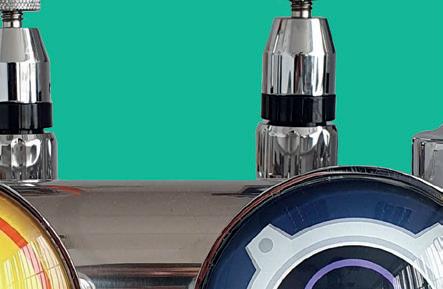













40 Winter 2022 | SIBA Independent Brewer | www.siba.co.uk
Is national distribution on the cards then?
“It's still a bit of a work in progress, if I'm honest with you. So we're working with several regional distributors, up and down the country. And we’re going to be working with Sainsbury's for the first three months next year as well in 50 stores across the country, which is really exciting in terms of exposure and getting the beer out there. The other really exciting thing that really helps us get the beer in the hands of people up and down with country is that we're working with Cross Country Trains so we’re on all of their services, and they go all the way up to Scotland.”
What main challenges are you facing as a small brewer in the UK market at the moment?



“Route-to-market has always been the stock answer until recently, and I still think that's probably the biggest challenge that we're facing. But I do think that is beginning to change. And it's really nice to see that, you know, craft beer is having a big effect on the beer market as a whole and customers are actively seeking it out. Which then forces retailers to have to find ways to meet that demand, which has opened up opportunities. So I'm willing to be positive about that, but there's obviously real concern about cost of living at the moment, and that's understandably making brewers nervous and it is causing price hikes. And that is quite scary.
I really do think that customers are still going to be happy to pay a little bit extra for quality beer.
But I really do think that customers are still going to be happy to pay a little bit extra for quality beer. Particularly because they have had to cut back on bigger expenses, but they still want to feel like they're in control of their finances. They might not be able to afford a big fancy holiday or something like that, but they can go to the pub, and really enjoy that. On energy prices, we're really lucky, in that our landlord controls all of the energy for all sites. So we were in his hands, really, but happily he has security until 2024. So it's gone up a bit, but it's not going up four or five times, like some people have seen. If it had, then we would have really been struggling. I'm really hopeful that it can't last too long, because if it does that is going to be an issue.”
What are you proudest of during your time at Attic?

“I think definitely our most recent expansion. And that's really because it put into perspective how far we've come in such a short time. I mean, we started on a shoestring four years ago with some equipment that was knocked together and is probably older than the two of us put together! And we haven't had any
external investment. But we've still been able to install this brewery that is more than 10 times our production capacity. There's not many things that cause you to take a step back and take stock. But having that installed was one of those moments where I have felt most proud of how far we’ve come.”
Who do you most admire in the craft beer sector and why?
“I think there's a couple that I can think of for different reasons. From a production standpoint, I think Vocation have always done an amazing job. You can pick up a beer of theirs from the supermarket, which has great flavour, it holds up really well in that environment, and I just think that that really speaks to the quality of the brewing, as well as good commercial sense to be able to get it at the right price. And I think to be able to do that, keeping the cost down, keeping the quality high, and still getting it out via a channel like a supermarket is really impressive. And then from a branding perspective, I think that Deya really have it nailed. Just everything they do visually and the way they talk about things, it's all just so coherent. And it all gives you a really inherent feeling of what they care about. So, if we can emulate those two then we'll be doing pretty well!”

41 www.siba.co.uk | SIBA Independent Brewer | Winter 2022
Business profile: Attic Brew Co
S USTAI N ABILIT Y IN BR E WING
CO2 capture in a small brewery

Eddie Gadd, Head Brewer of the Ramsgate Brewery on the East Kent Coast, has been in the business for nearly 30 years but also has a background in engineering, which made him the perfect candidate to trial a new CO2 capture device designed specifically for small breweries. The device captures CO2 during the fermentation process to be packaged for re-use in the brewery or to sell on to other businesses. The equipment was designed by a Danish engineer, and the results achieved so far at the Ramsgate Brewery have been fantastic, not only in terms of dramatically cutting the amount of CO2 being released into the atmosphere during the brewing process, but also in creating a new income stream in supplying captured CO2 to a local soft drinks business. The system could be a game-changer for small brewers facing rising costs for CO2 and also supply issues, and with a green light from engineer Eddie, several more systems are due to go into craft breweries in the UK market shortly. Caroline Nodder from SIBA Independent Brewer spoke to Eddie to find out more about the system and the results he has achieved so far…
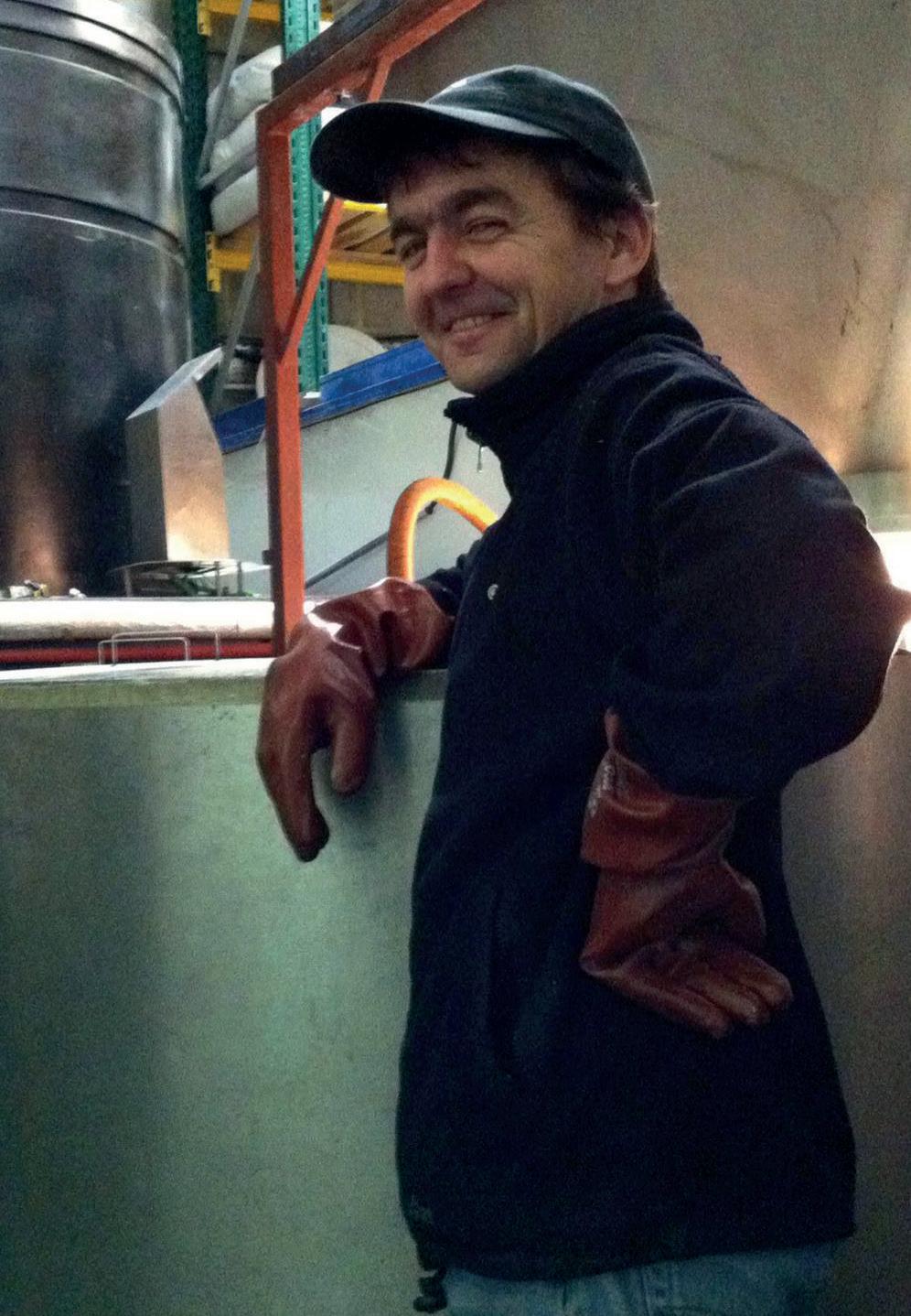
42 Winter 2022 | SIBA Independent Brewer | www.siba.co.uk
Sustainability Focus: Eddie Gadd
How did you first become aware of the potential to install this type of system?
“I first heard about the technology 30 years ago when I was at university, and I’d been looking out for it and waiting for somebody to start doing it for the small brewers. And I was keeping an eye out, and an American company came up with one. And I spoke to them but they weren't ready yet to ship to the UK. And so somehow I came across this Danish engineer, and I got in touch with him, had a Zoom meeting, realised that he absolutely knew what he was talking about. And so we took a punt on it. It's one of those all too rare occasions in life where what turned up was better than expected. It's fantastic.”
Are you the first small brewer to install such a system in the UK?
“Yes, we are. It’s going into Bristol next, but I think that’s been delayed. And Stewart Brewing Co in Edinburgh and Utopian in Devon have ordered, but I don’t think anything else has been installed yet. My phone hasn’t stopped ringing!”

How have you seen CO2 costs rise in recent months?
“I think we were quoted in around 2017 something like £260 pounds a tonne now its £600 pounds. But then you've got the surcharge on top of that. And the surcharge went to £3,500 at the beginning of September. Interestingly enough, I got talking to an engineer, a retired engineer, not so long ago, who used to build these systems for the large brewers in the UK back in the 80s. And he said that a very similar thing happened back then with costs and supply. And the brewers of the day resolved never to be held to ransom again by the fertiliser producers. And, 40 years
later, that's exactly what’s happened again. The technology's been there for a long time. It's just finding somebody that was interested in actually scaling it down.”
How much did the equipment cost to install and what return do you get from selling back recovered CO2?
“Well, the installation is not an expensive thing. The guy had built two test sites in Denmark, they're still running, but I bought the first one that he was selling commercially. And, obviously, I got a good price. I expect to get payback within four years. And if I was brewing four times the amount of beer, then I'd be getting paid back much, much quicker than that. The smallest machine that the guy does is 30,000 Euros and the largest is 60,000. Then you need a storage and use tank. You're looking at a Capex of between £55,000 and £100,000, if you go for full automation.”
Is your CO2 now 100% self-supplied?
“The irony here is that we are predominantly cask ale. And we don't use any CO2 here. All our carbonation comes from cask conditioning. But we are founder members of a joint venture bottling company called South East Bottling. That company uses a lot of CO2, and it's only a mile away. So we collect the CO2 and we sell it to them. And there is a wider context here, it’s a feasibility study, really, for something a bit bigger. And that's to try and get the bottling company self-sufficient in CO2, because the three founders of the company all have breweries. So I'm busy proving that it works and learning from my mistakes. And then next year, we install another one, and hopefully then the year after we install another one. And it's fabulous CO2. The CO2 created by beer fermentation is wonderful. It's beautifully clean. There's zero chance of things like benzene
contamination which can happen in wholesale CO2. And this machine delivers a purity that's off the scale, and it means we’re self sufficient. So I'm very much hoping this changes the whole industry.”
Have you found any downsides to the system?
“Well I will tell you one thing, and that's that the fermentations have to operate under some pressure, which is a quarter of a bar. And we're small brewers, we don't generally do that. And that pressure can cause a change in the aroma of beer brewed with certain yeasts. Brewing under pressure is done commercially to suppress ester formation. So you get a less fruity aroma. Although it’s only a quarter of a bar, it's pretty marginal. But I've spoken to a brewer last week, who said that, literally, if he closes the lid on his fermentations, his yeast starts misbehaving. So some yeasts will inevitably not really like it. And others, like mine, are completely fine. I don't think our beer’s ever tasted better than it does at the moment. But brewers would need to need to run a couple of fermentations under pressure to see what happens.”
Do you know what impact that this has had on your carbon footprint?
“To put it into some sense of perspective, we think the carbon footprint of the brewhouse is about 30 tonnes a year CO2 equivalent, and we think our delivery footprint is about 15 tonnes a year. And we know that our fermentation footprint is also 15 tonnes a year. So it's not an insignificant amount. So we can reduce that 15 tonnes a year fermentation emissions to 5. And we might be able to reduce it further. So now we can collect 10 tonnes, we might end up collecting more. So it's probably a double digit reduction in our footprint.”
43 www.siba.co.uk | SIBA Independent Brewer | Winter 2022
Sustainability Focus: Eddie Gadd
Continued on page 45



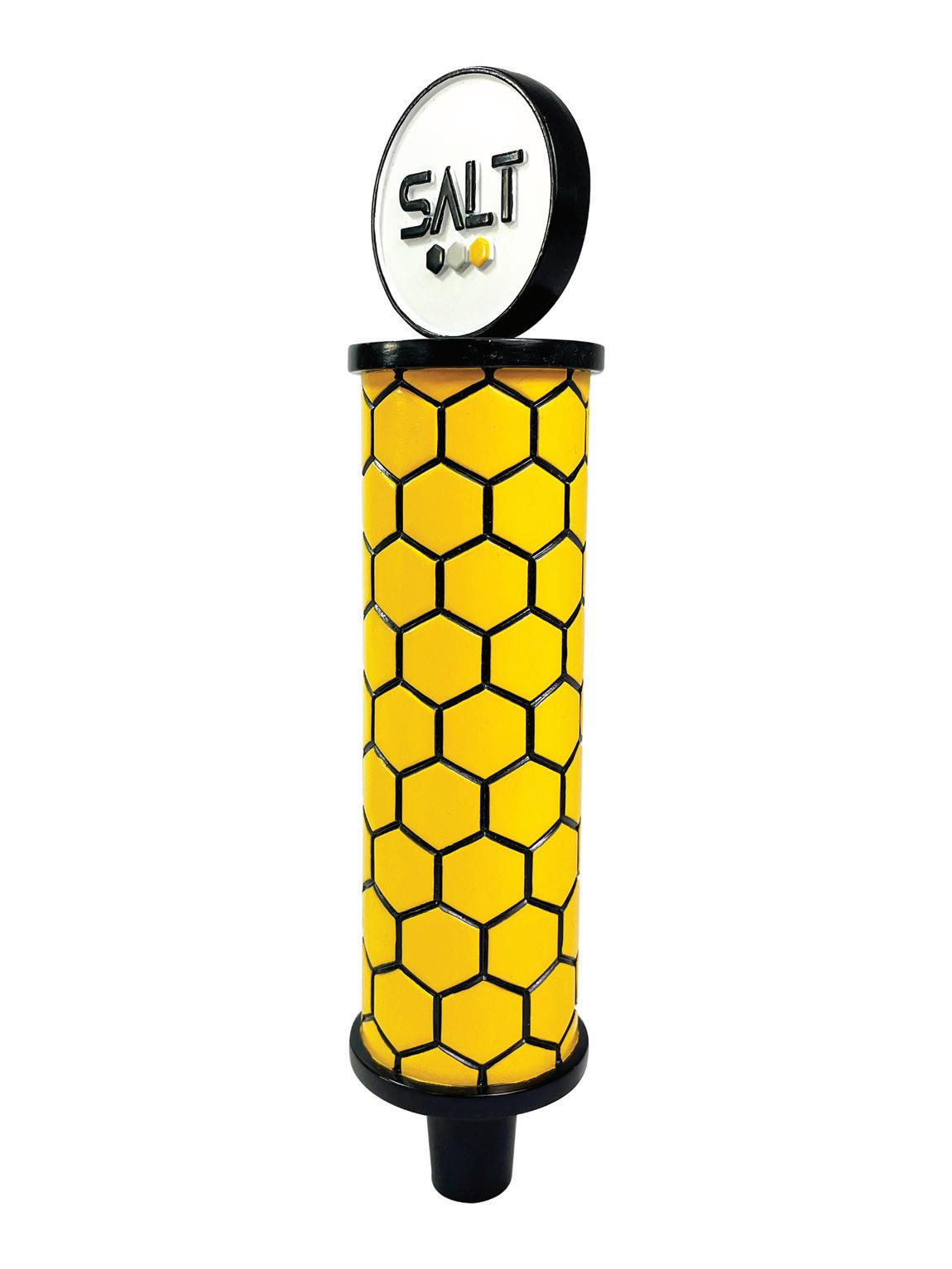
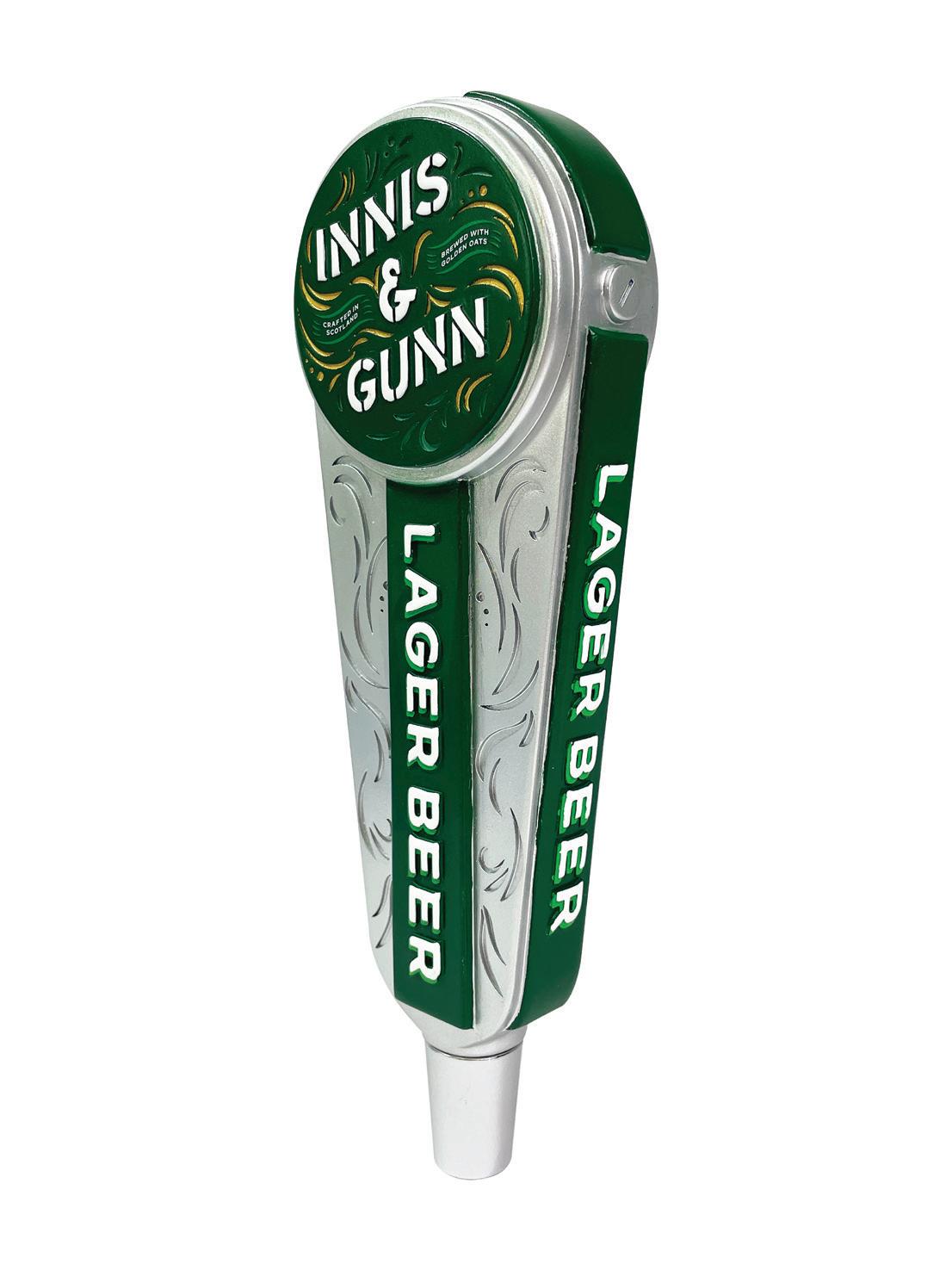
44 Winter 2022 | SIBA Independent Brewer | www.siba.co.uk
Ramsgate Brewery installation
FERMENTERS
The UK’s small brewers (those producing below 100,000 HL/yr[1]) account for the production of approximately 215 million litres of beer, at an average ABV of 4.6% (3.65% ABW)[2]. Taking into account fermentation vessel (FV) losses (10%), stoichiometry[3] informs us that the total amount of CO2 produced by this fermentation is:
1.1 x 3.65% x 0.9565 x 215 = 8.26 million kgs, or 8,260 metric tonnes (t), or 0.038 kg/l. Until very recently, all of this was vented to the atmosphere.
Of this beer, around 100 million litres are packaged flat, into cask[4]. Therefore, 115 million litres of small brewery beer is carbonated, and, whilst some of this will undoubtably be carbonated via a spunded fermentation, the vast majority will rely on liquid CO2 purchased on the wholesale market, not only to carbonate the beer, but also to back pressure vessels and fillers in order to prevent that carbonation from escaping.
Bottling, canning and kegging in small brewery packaging facilities typically uses up to 0.05 kg per litre to carbonate the beer and run the filling

machines[5]. Therefore, as an industry, we are on the one hand releasing 8,260 t of CO2 into the atmosphere as a result of fermentation, and, on the other hand, purchasing 5,750 t of CO2 from the wholesale market to put back into the beer. In the days of plenty, marrying these two CO2 streams up (one out, the other in) via technology wasn’t considered worth the hassle, despite the engineering being already fully available (albeit in a macro form). Recent price rises in wholesale liquid CO2 (and a couple of industry-wide droughts of the stuff) have changed the dynamic; two firms have entered the market, seeking to provide a solution that matches up this supply with the demand, by capturing the evolved CO2, rendering it fit for use and liquidising it for storage and transport. Earthly Labs, based in the US, have developed a CO2 recovery unit for craft brewers above the 15k hl/yr scale, and have some units operational in the US. Dalum Beverage Engineering from Denmark have developed a unit suitable for brewers producing 5k+ hl/yr scale, of which there are two already operational in Denmark, a third recently installed at GADDS’ The Ramsgate Brewery in the UK, with more units
on their way to the Faro Islands, Norway, Bristol and beyond. This paper is an attempt to explain the principles and reality of capturing fermentation-evolved CO2 from a small brewery, and transporting it to a craft drink packager for reuse, in place of wholesale gas.
The installed system consists of collection pipework, a foam trap, the capture unit and transport/storage vessels.

Collection
CO2 is collected from closed FVs via the CIP arm. Following the lag phase, active fermentation clears the vessel headspace gas (air) and the O2 content is monitored via a handheld unit held at the CIP arm. Once below 0.6%, the collection can begin. The CIP arm is connected, via a 1-inch braided hose, to a manifold leading to a 1-inch collection main, a PRV (in case of unit failure) and a foam trap. The system is designed to operate at 0.25 bar, a low enough pressure not to trouble the yeast or flavour profile of the beer.
45 www.siba.co.uk | SIBA Independent Brewer | Winter 2022 Case
OXY Fresh
LIQUEFACTION DEHYDRATORS Adsorption SULFUR FILTER Adsorption 3
oil free water cooled COMPRESSOR Low Pressure SCRUBBER FOAM TRAP CO2 Collection Stations 35-46
Study
Water Coolant Return 3-8 C To Users 8 bar 24,5 bar CO2 TANK Coolant Inn -2 to +4 C Liquid CO2 35-46 bar
stage
bar FLOW CHART DALUM CO2 UNIT 18.01.2022
Sustainability
Eddie Gadd has written up the following case study about the pioneering installation and how the system works in practice to help other brewers understand its potential:
Focus: Eddie Gadd
Continued on page 47

O2 Monitoring
From the foam trap, the CO2 enters the capture unit and is now monitored for O2 content by the unit. Should the O2 content stray above 0.6%, the gas is vented until O2 levels lower. In reality, oxygen levels in evolved fermentation gas fall to below 0.6% within a few hours and don’t increase thereafter.
Low pressure scrubber
The gas enters the base of a 3m tall, narrow cylinder filled with surface area busting stainless steel pall rings. Cold water is trickled down the column as the gas makes its way up it. Here, alcohols, esters and other impurities are picked up by the water (thereby separating them from the gas) and the resultant effluent is collected as a ‘grey’ water supply.
Compression
On leaving this column, the clean gas runs through a solids filter and onto a 3-stage compression process, with intermediate cooling and water removal stages. The Dalum designed, oil-free, variable speed, single stroke, 3-stage compressor is right at the heart of the unit. Gas is compressed to 35 - 45 bar in the multicylinder piston chamber, regulated to 60°C, and the moisture removed is collected as grey water. Between stages 2 and 3, the gas passes through a high-pressure sulphur scrubber.
Dehydration
The dry gas, now at ambient temperature and high pressure, passes through a column containing inert aluminium oxide desiccant, for super drying. The degree of dryness of a gas can be expressed in terms of the dew point
– the temperature at which, under constant pressure, the gas has 100% humidity. The lower the dew point, the drier the gas. On exiting the dehydration columns, the CO2 has a dew point typically of -60°C.
Rectification/Liquefaction
At 35+ bar, the super dry gas now only requires cooling to 3 or 4 °C to liquify and enters a Dalum designed glycol cooled condenser, and on to a reboiler. Constant boiling releases O2 molecules from the liquid phase CO2, which migrate back through the condenser and are vented off periodically. Purified, liquid CO2 collects in a small tank at the end of the system and is pushed into 240 litre transport vessels.
Collection, Storage and Transportation
The brewhouse at GADDS’ produces 26 hl of wort per brew, fermented in either single or double batches under a top pressure of 0.25 bar. After a lag phase of around 8 hours, a single fermentation will evolve gas with an oxygen content below 0.5% and at a rate of 1.5kg/ hr for approximately 48 hours. A handheld O2 monitor lets the brewers know when to hook up the fermentation to the collection system (generally 16 hours from yeast pitching). Some CO2 is lost through the initial stage of fermentation, due to high O2 content, and some remains in the beer at the end. With good management, 75% yields have been achieved, with an oxygen content of <6 ppb, measured with an Orbisphere (wholesale liquid CO2 at the bottling site measures 20 ppb O2). A burette is used to demonstrate purity >99.99%. The vacuum insulated transport tanks, mounted
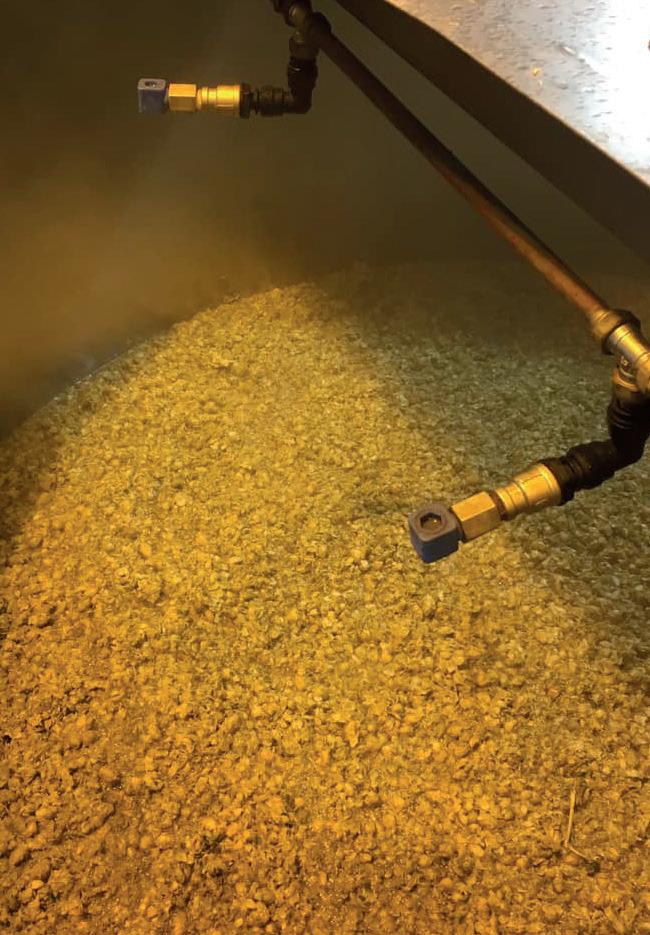
on a skids with casters, and equipped with internal vaporisers, are used to store and transport the collected gas to the bottling site. Under the ‘small limit’ threshold of 1000kg for CO2, these can be transported legally without any onerous specialist safety equipment. Once off-loaded at the bottling site the tanks are connected to the CO2 systems simply via a standard 3/8-inch line and a secondary regulator. Due to the high quality, this recovered gas is reserved for carbonation rather than providing back-pressure in vessels and fillers.
Review
This compact unit has a footprint the size of a pallet, but delivers a game-changing service to the small brewer. The engineering is inspired, and the quality of the build first class. This isn’t a noisy machine; it sits and rumbles quietly, hissing every now and then to let you know it’s still working. And though reliability is excellent, you won’t get the best out of the unit unless you make the effort to engage with the principles, learn to drive it, and flex your collection system to suit. This is all well within the reach of the practical brewer, and there’s a handy remote management system that records and rewards your efforts. In the interests of balance, I’m desperately trying to find something negative to say about this, but I can’t. In my opinion, as an engineer turned brewer, this is awesome.
[1] This report is primarily about technology that has recently become available to the smaller brewers – it has been available to those brewers above 100k HL for some years.
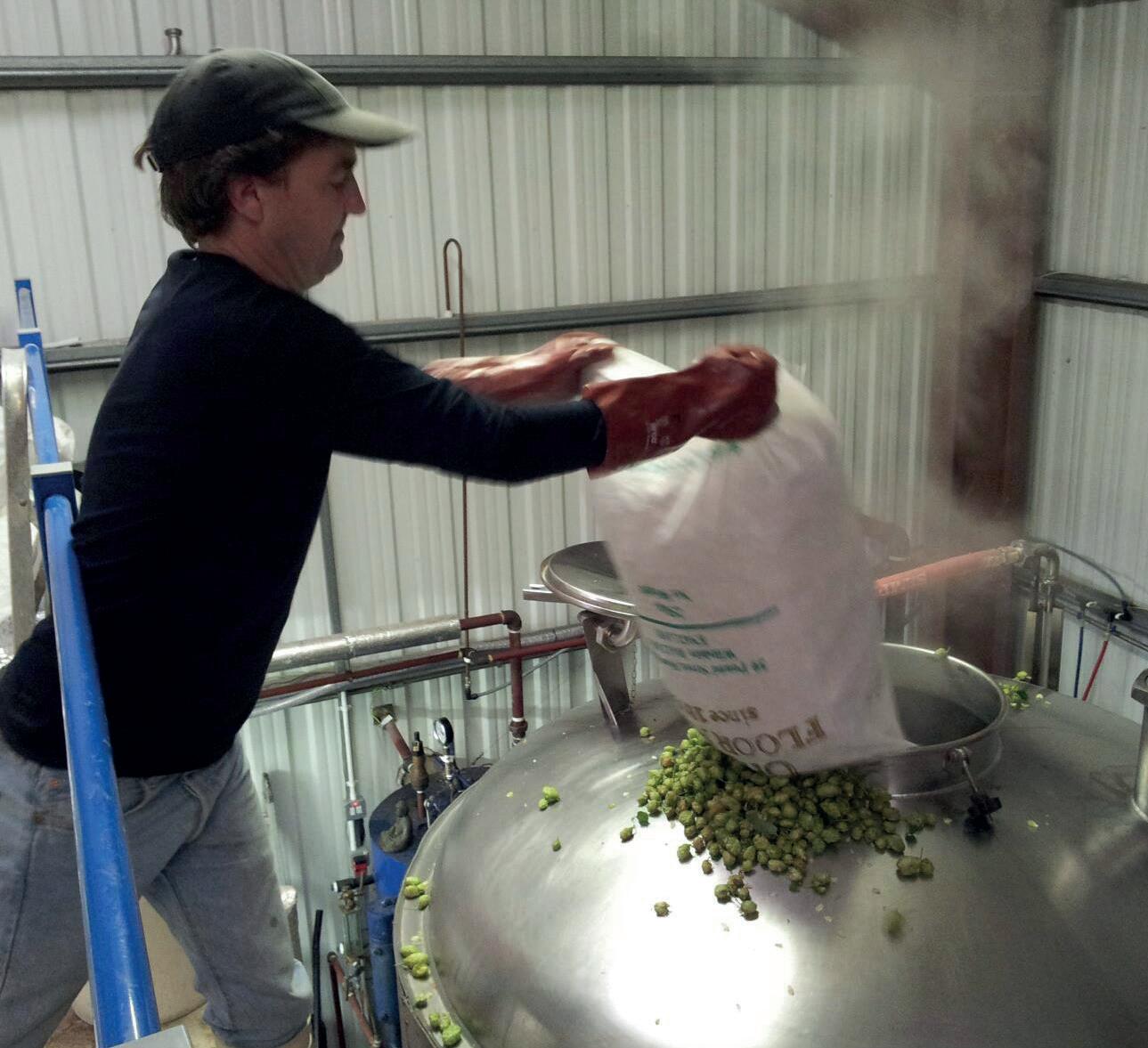

[2] SIBA Members Survey 2021
[3] Balling, Carl. J. N., Die Bierbrauerei. Verlag von Friedrich Temski: Prague, CHZ, 1865.
[4] SIBA Members Survey 2021
[5] South East Bottling internal audit.
47 www.siba.co.uk | SIBA Independent Brewer | Winter 2022
Sustainability Focus: Eddie Gadd
I’m desperately trying to find something negative to say about this, but I can’t. In my opinion, as an engineer turned brewer, this is awesome.
Wee but mighty
Owner operator Niall Kennedy launched his singlesite retail operation, Wee Beer Shop, just over five years ago in Pollokshaws Road in Glasgow and has stuck to his guns ever since when it comes to fiercely defending the principles of quality and independence on which the business is founded. His uncompromising vision for a bottle shop selling top quality beer from the best, fully independent breweries in the UK, has led to Wee Beer Shop becoming a destination for craft beer aficionados from outside Glasgow as well as a focal point for the beer community in the city itself. With licensing in the area made difficult by local bureaucracy, the lack of taprooms makes the shop a vital outlet for some of the emerging small local Glasgow brewers, as well as being the only Scottish outlet for many of the independent brewers from South of the border
in England that have their beers stocked there. This does, however, present several problems for Niall in the current tough market, not least the huge rise in online sales direct to customers from small breweries during, and now beyond, Covid has put added pressure on Wee Beer Shop which struggles to match them on pricing and obviously is now in direct competition with those brewery webshops. Perhaps more concerning still is the Deposit Return Scheme (DRS) planned for Scotland for next year, a scheme that Niall is in no doubt could lead him to close the shop if it goes ahead in its current proposed form. SIBA Independent Brewer’s Caroline Nodder spoke to Niall back at the start of November to find out more about how he came to open the shop and how the business is faring five years on…

48 Winter 2022 | SIBA Independent Brewer | www.siba.co.uk
Meet the retailer: Wee Beer Shop
Business Basics
Founded: October 2017
Location: Glasgow
Owner: Niall Kennedy
Number of retail sites: One Staff: One
Key product categories and sales mix: Specialises in modern beer styles mostly from UK craft breweries, but also sells a large percentage of Belgian and German beer.
Meet the retailer:
How did you come to launch Wee Beer Shop and how has the business developed since then?
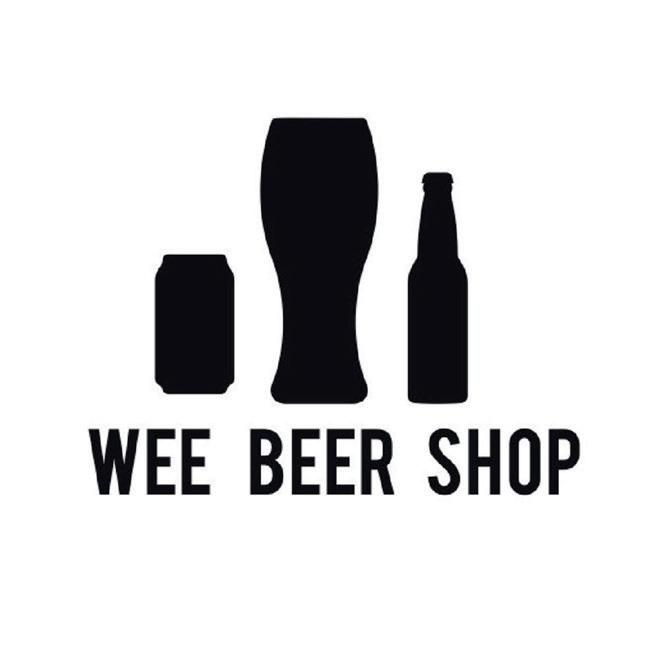
“This feels like a common origin story for beer shop owners. Wee Beer Shop partly came out of a frustration with my day job. I was a freelance marketing consultant, frustrated by having to constantly chase new work, often frustrated with what I had to try to sell on behalf of others. I just didn’t believe what I was doing had much value and wanted a change. I had also just moved to a new part of Glasgow which wasn’t well served by good beer shops and got fed up having to travel to buy beer and thought there might be scope to open a beer shop locally, so I began to plan what the shop would be. I had no experience of the beer industry other than as an enthusiastic drinker, so I spent a year or so researching the industry, visiting other shops around the country and speaking to breweries. In the meantime, I had found premises, after a lot of looking. I chose a small unit away from the main drag of shops in the area which felt a bit risky, but it was affordable. Since then the neighbourhood has become a vibey place and lots of cool retailers have followed me. My next challenge will be whether the landlords decide to increase rents, even in the current challenging trading conditions. Another obstacle at the beginning was the time it took to get a licence. Glasgow’s licensing board is notoriously slow. It took eight months to get a licence and in the meantime I ran some pop-up pub nights in the shop and some of those that attended are still customers. Eventually I opened five years ago on Friday 13th of October 2017. If I was superstitious I might have delayed by a day, but I was desperate to get open by then!”
What did you aim to achieve when you launched the business?
“First and foremost the business was to provide an income for me. I had no grand plan of building an empire - it was to give me a job that I would enjoy. So to that end, it’s been successful. I then wanted to introduce good beer to people, give them alternatives to drinking the bog standard beer that was available in supermarkets and local off licences. And finally, I wanted to help small breweries by providing an outlet for their beer. “
Wee
Beer Shop
The Glasgow craft beer scene has evolved a lot since you opened, how involved have you been in that?

“Glasgow is a funny city for craft beer. It often feels like everything is overshadowed by Tennents, whether modern craft or traditional cask. It’s definitely not as mature as, dare I say it, Edinburgh is. There’s a lack of brewery taprooms for a start. The only taproom at the moment is Drygate. That might be down to the difficulty of working with the local licensing board of course. There are some really talented brewers in Glasgow though. As I mentioned earlier, one of the reasons for opening the shop was to support small breweries. We’ve been the first, or one of the first, stockists for a lot of the current Glasgow breweries, from Overtone to Simple Things, Dookit to Bungo Brew Co, and hopefully that exposure to our customers has helped them to grow. Of course, as the breweries develop they look for other routes to market and other stockists and it can be a bit frustrating when you find those beers in local corner shops where they sell beer as a loss leader. I’m pragmatic enough to realise that’s a fact of life but it’s frustrating all the same.”
I had no experience of the beer industry other than as an enthusiastic drinker, so I spent a year or so researching the industry, visiting other shops around the country and speaking to breweries.
How do you select the beers you stock?
“The shop is stocked very much as I might stock my personal beer fridges. I only want to sell the best beer that I can. And that’s determined by what I like, rather than what the market tells me. Inevitably that means full flavoured and modern and expensive beer because that’s what I like to drink. I do not try to represent the entire industry because that would be physically impossible. That inevitably means that I miss out on the lower priced end of the market. Of course, that is a subjective choice, but it means that I’m confident recommending anything I sell. Independence and integrity is paramount for me. We ditched Beaverton and Magic Rock when they lost their independence and we would have ditched Brewdog over their recent behaviour, if we hadn’t ditched them several years ago for the quality of their beer.”
49 www.siba.co.uk | SIBA Independent Brewer | Winter 2022
Continued on page 51



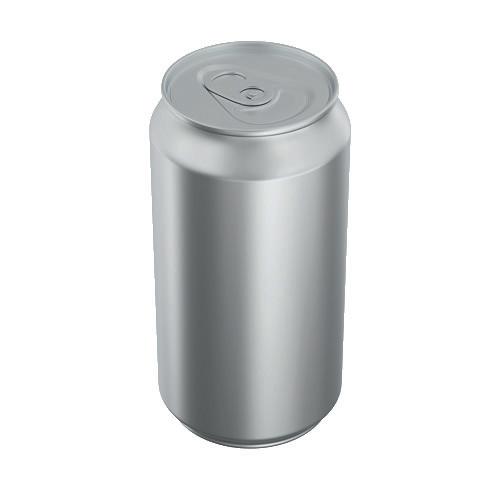
50 Winter 2022 | SIBA Independent Brewer | www.siba.co.uk FRAMAX specializes in the supply of machinery and complete “Turn Key” production lines for the bottling and packaging industry, covering primarily the beverage field but also catering for special needs in the food and chemical sectors. The key to our success is the “know how” gained in over 40 years of experience in this industry and the ability to supply equipment performance, competitive pricing and efficiency of after sale service and support. Offering complete packaging line solutions for Bottling, Canning & Kegging since 1993 Contact Us Tel. +44 (0)23 80750062 Email: info@framax.co.uk /Framaxuk Threefield House, Threefield Lane, Southampton SO14 3LP We... “Know How” www.framax.com
Do you run tastings?
“We have done tastings in the past and I got a bit of a buzz from seeing brewers get direct feedback from customers. However, during and since Covid I have rearranged the shop a bit and lost out on some of the space that was used for the tastings so we haven’t done any since. From a personal point of view I still get a bit Covid anxious around people in a confined space, and our shop is small, so that’s holding me back a bit in reintroducing tastings.”
Describe the perfect customer experience in your shop?
“I think perfect experiences are dependent on each customer. Some customers know what they want and are happy to browse without much input from me. We are definitely a destination that people can come to and know they’ll find the latest releases from the best breweries in the country, if they like the modern take on beers. Others are looking to be guided - they’ll give me an idea of what they like to drink - and I’ll come up with some suggestions. It’s a good feeling that people feel they can trust my recommendations. Of course that’s not a service that they’ll get if they go looking for beer in Tesco or Aldi and hopefully people realise that’s why prices are higher in a specialist shop. The most pleasing thing is when customers come back, having taken a recommendation, to tell me that the beer is now their favourite beer. When it happens with Duchesse de Bourgogne that’s an even better feeling.”
Meet the retailer: Wee Beer Shop
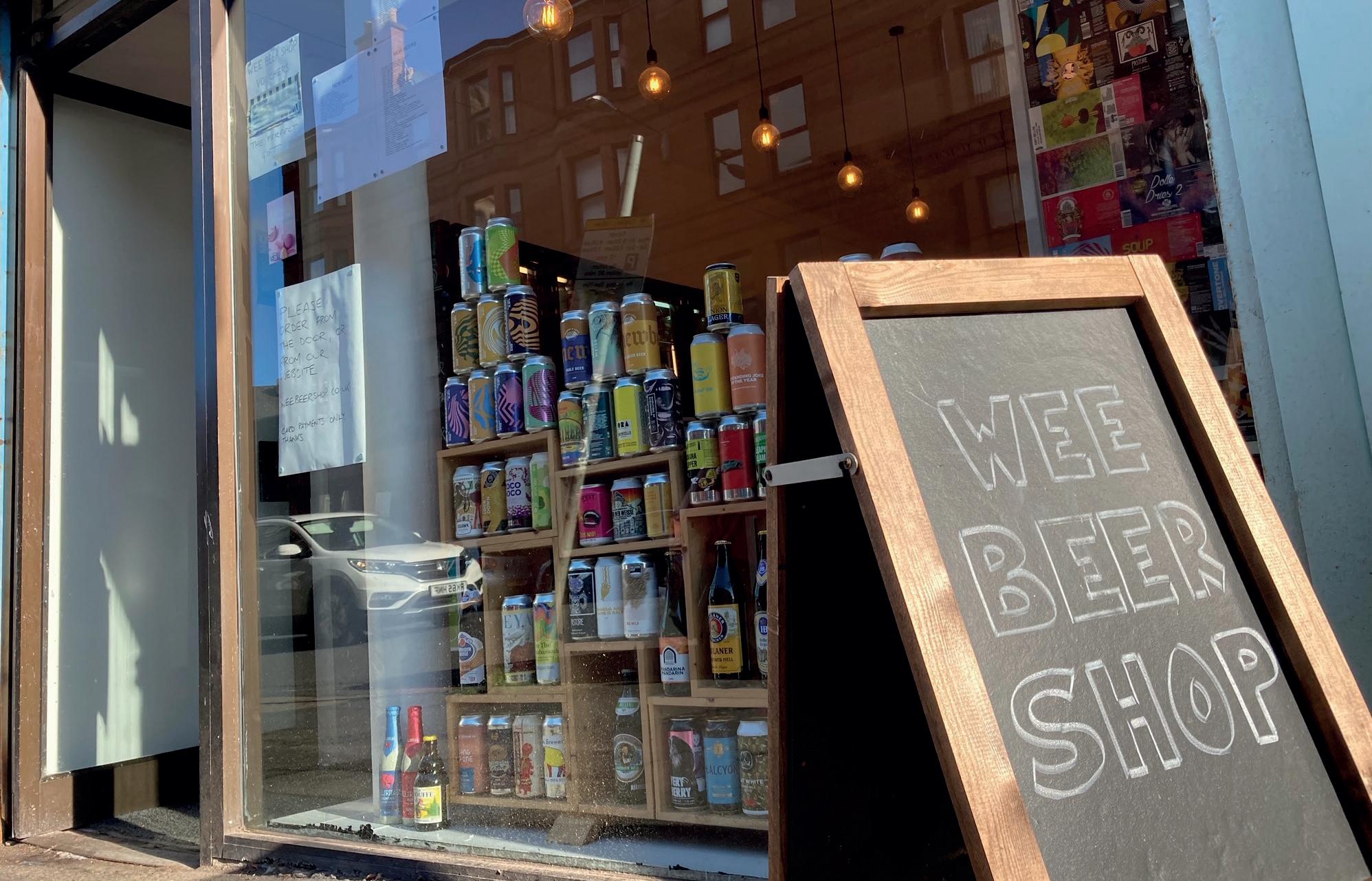
We are definitely a destination that people can come to and know they’ll find the latest releases from the best breweries in the country.
Of course breweries, and all businesses, need to do what they need to do to get through the challenges of the past few years, and future challenges, but selling direct to the customers is only going to have a detrimental effect on independent shops. That’s a choice they need to make.”

How have you approached online retailing and how successful has that been for you?
“As a bricks and mortar retailer I can’t compete on price with breweries selling direct, onlineonly businesses and supermarkets. So I don’t focus on their pricing. I concentrate on setting my own pricing that covers my costs and allows me to make a small profit. I don’t compete with supermarkets. If a beer is stocked in a supermarket it has no place in my shop. That’s not a comment or criticism of the breweries who sell into supermarkets. They need to do what seems right for them. However, the wholesale price I pay means I can’t compete on price. If a brewery hits the supermarkets I’ll often drop them. I’d rather work with breweries who appreciate and value independent retailers. The way that breweries operate is a challenge. From not selling direct to customers in the past, to selling full cases, to allowing customers to choose single cans in a mixed box, to selling other breweries’ beers - breweries are essentially taking away the sort of trade that was done by shops only, and often at prices little higher than wholesale.
“I launched our website six months before the pandemic, to allow customers to see our stock and to offer a click and collect service. It was a nice-to-have addition to the business at the time. During the pandemic online allowed us to continue selling, and we expanded the service to bring couriers in to deliver across mainland UK. There were a couple of periods during the pandemic when we closed the shop to the public so click and collect and deliveries were vital. Since things have ‘returned to normal’ online activity has reduced but it’s still an important part of the business. We have customers who are able to come to the shop and browse the fridges but prefer to use the website. I think that’s testament to the work that has gone into making the website easy to navigate and use.”
51 www.siba.co.uk | SIBA Independent Brewer | Winter 2022
What is your pricing strategy and how do you compete with larger retailers?
Continued on page 53

52 Winter 2022 | SIBA Independent Brewer | www.siba.co.uk Learn more about Maris Otter® Malt by downloading our Heritage Malts Booklet CRISPMALT.COM
Meet the retailer: Wee Beer Shop

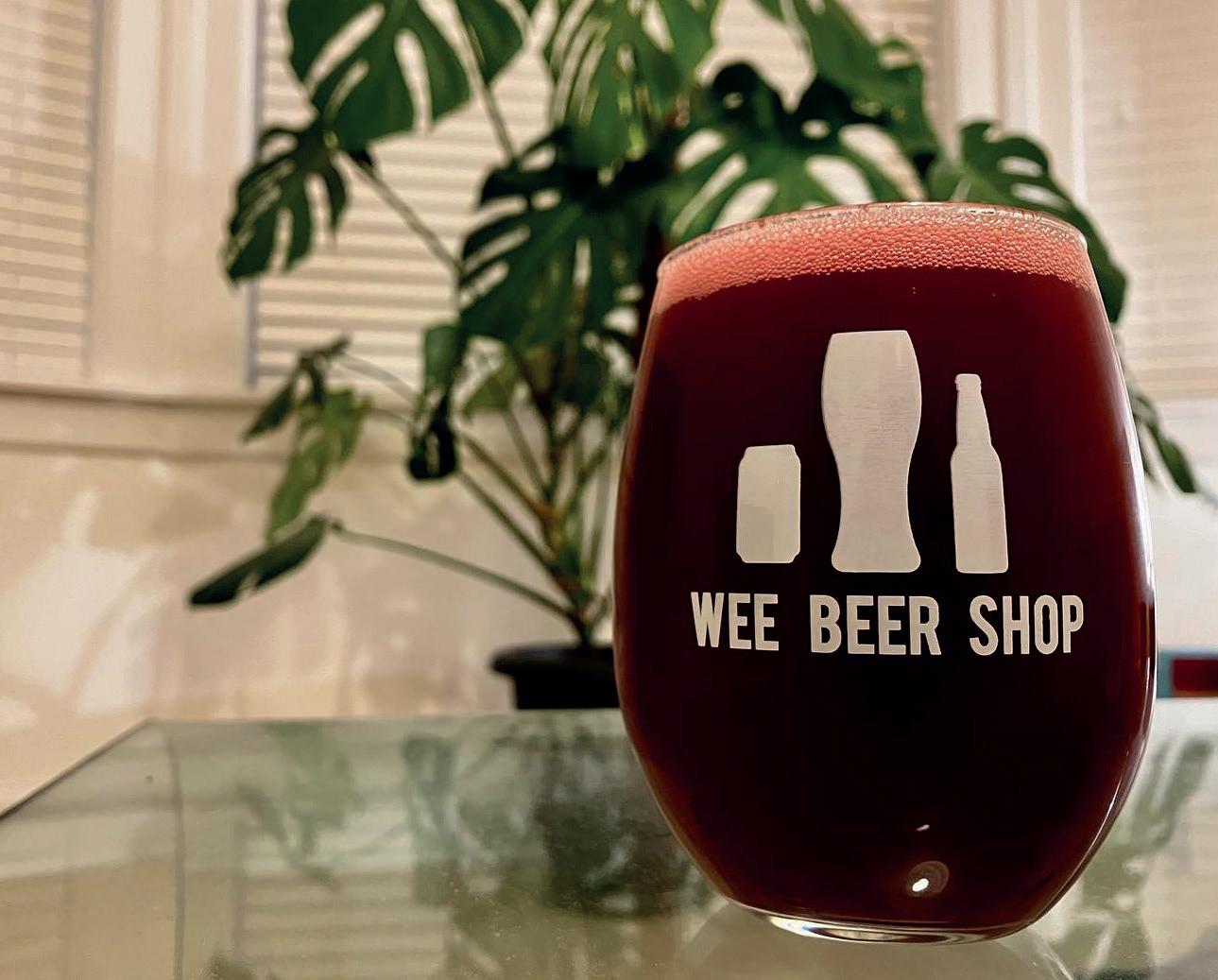
Why have you decided not to introduce draught taps to the shop?
“Funnily enough, I had taps for growler fills for the first couple of years of the shop. I decided to take them out, just before the pandemic… then pubs closed down and people were desperate for draft beer. Just another reason why I’ll never be entrepreneur of the year!”
Would you consider expansion to a second site?
“Never. I mentioned that the driver for opening the shop was to provide me with a job. I never wanted to build an empire. I like the day-to-day interaction with customers and I’m more of an operational guy than a strategic guy. That’s something I’d lose opening another shop.”
Has the pandemic changed the business permanently in any way?
“We did lots of pivoting during the pandemic, but I don’t think it’s changed the way that I’m doing things myself now, apart from opening up to a wider market with the e-commerce opportunities that I spoke about earlier. However, the pandemic changed the retail landscape - the way that breweries in particular operate. From not selling direct to customers, to selling full cases, to allowing customers to choose single cans in a mixed box, to selling other breweries’ beers - breweries are essentially taking away the sort of trade that was done by shops only.”
What are the main challenges a business like yours is facing in the Scottish market right now?
“The Deposit Return Scheme (DRS), supermarkets, breweries [selling direct to the consumer] and the cost of living crisis/ inflation.”
What qualities do you look for in the small breweries you work with?
“First and foremost the beer needs to be good. The packaging needs to be good too. I have decided against stocking some beers because the packaging isn’t good enough. A pet hate is can labels which don’t make basic information easily accessible to customers. Don’t make it difficult for potential buyers and make them have to pick up cans and spin them round - give them the information they need at a glance! Functionality is better than fancy design, every time. If a brewery is approaching a potential new stockist, give them all the information they might need. Supply pricing, beer information, images, delivery details will help me to make a decision. If you make me work hard I may decide it’s too much bother. If a brewery is able to share social media posts then that makes me much more likely to re-order their beer.”
How is the DRS scheme likely to affect you?
“DRS Scotland means that my business will no longer be viable and will almost certainly mean that I will have to close the business.
A large percentage of the beers that I sell are made outside Scotland. Often, I am the sole outlet in Scotland for the beers that I sell. However, it won’t make financial sense for the breweries to comply with DRS requirements
of Scotland-only labelling and registration so they will stop supplying beer to Scotland. Many of the breweries that I work with have told me that will be their approach once DRS Scotland begins. I’d love to replace those breweries with Scottish breweries but the reality is that Scottish breweries aren’t producing the type of beers that I want to sell. I don’t want to compromise what I want my business to be. There are other associated challenges but this fundamental one trumps them all.
Integrations between the country-specific schemes might lessen the impact for me, but there doesn’t appear to be political will in Scotland for that.”
What are your plans for the business over the next five years?
“I’m unsure whether we will last another year, never mind five, given the challenges of DRS and the cost of living. I’ll keep going for as long as I can, but I’d be lying if I said I was optimistic.”
What are you proudest of during your time at Wee Beer Shop?
“I think it’s that despite all of the challenges of the past five years I haven’t abandoned my principles of quality and independence. I could have popularised the product offering to include AB InBev macro lagers or popular breweries that had ‘sold out’ but would have continued to sell well. I could have joined the race to the bottom and discounted to turn a quick buck. If I had done those things that might have meant I had a more sustainable business, one that isn’t as at risk to external influences, but it wouldn’t have been a business that I’m proud of every single day.”
53 www.siba.co.uk | SIBA Independent Brewer | Winter 2022
A large percentage of the beers that I sell are made outside Scotland. Often, I am the sole outlet in Scotland for the beers that I sell.





54 Winter 2022 | SIBA Independent Brewer | www.siba.co.uk Where craft brewing passion meets glassware innovation Check out Festival Glass – your branded glassware partner Email: sales@festivalglass.co.uk Call: 01422 382 696 Visit: www.festivalglass.co.uk Festival Glass are the UK’s leading independent glassware decorator – supplying drinks brands since 2002 with a comprehensive glassware range to suit all budgets and requirements from stock. Fully toughened and untoughened glassware options MOQ from 288 pieces for single colour decoration MOQ from 1200 pieces for 2-5 colours UV state-of-the-art decorating process for bright, ultraviolet colours Generic nucleation or bespoke for better head retention In-house CAUK marking and line options as standard CLAIM YOUR FREE NO - OBLIGATION QUOTE
Taproom focus with
Charlie Docherty

Business Development Officer
Name: Lost & Grounded Brewery
Founded: 2016
Location: Bristol, UK
Taproom Hours: Fridays 16:00 to 22:00 Saturdays 13:00 to 21:00
On approach to Lost & Grounded’s taproom in South-East Bristol, the first thing you notice is a 10 metre high mural of the idyllic wilderness scene on the side of every can of Keller Pils. It’s becoming a cliche to describe Keller Pils as a modern classic, but in all truth, when you’ve walked past that mural, and sat down with a pint overlooking their impressive brew kit (manufactured by Krones, and with the ability to propagate their own lactic acid), it’s hard to argue with the sentiment.
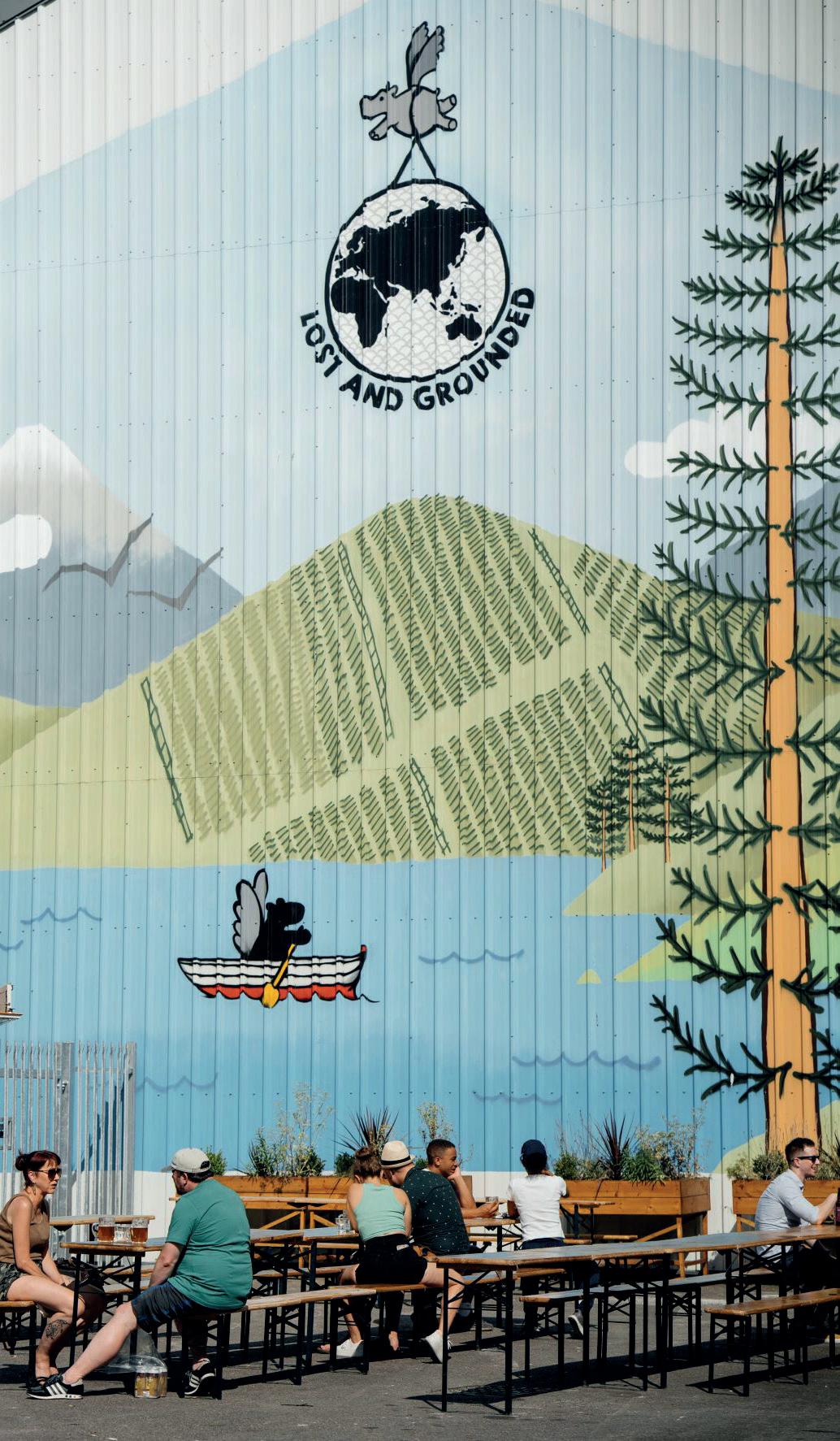
The taproom is at the front of the brewery, and with some bunting, some fairy lights and a bit of greenery, it does an excellent job of making an industrial unit feel like somewhere you’d want to spend a whole afternoon and/or evening.
In addition to their excellent German-Style beers, Lost & Grounded’s taproom is a great spot to discover the brewery’s range of Belgian inspired beers. There are four in their core range – a witbier, a farmhouse beer, a saison and a tripel.
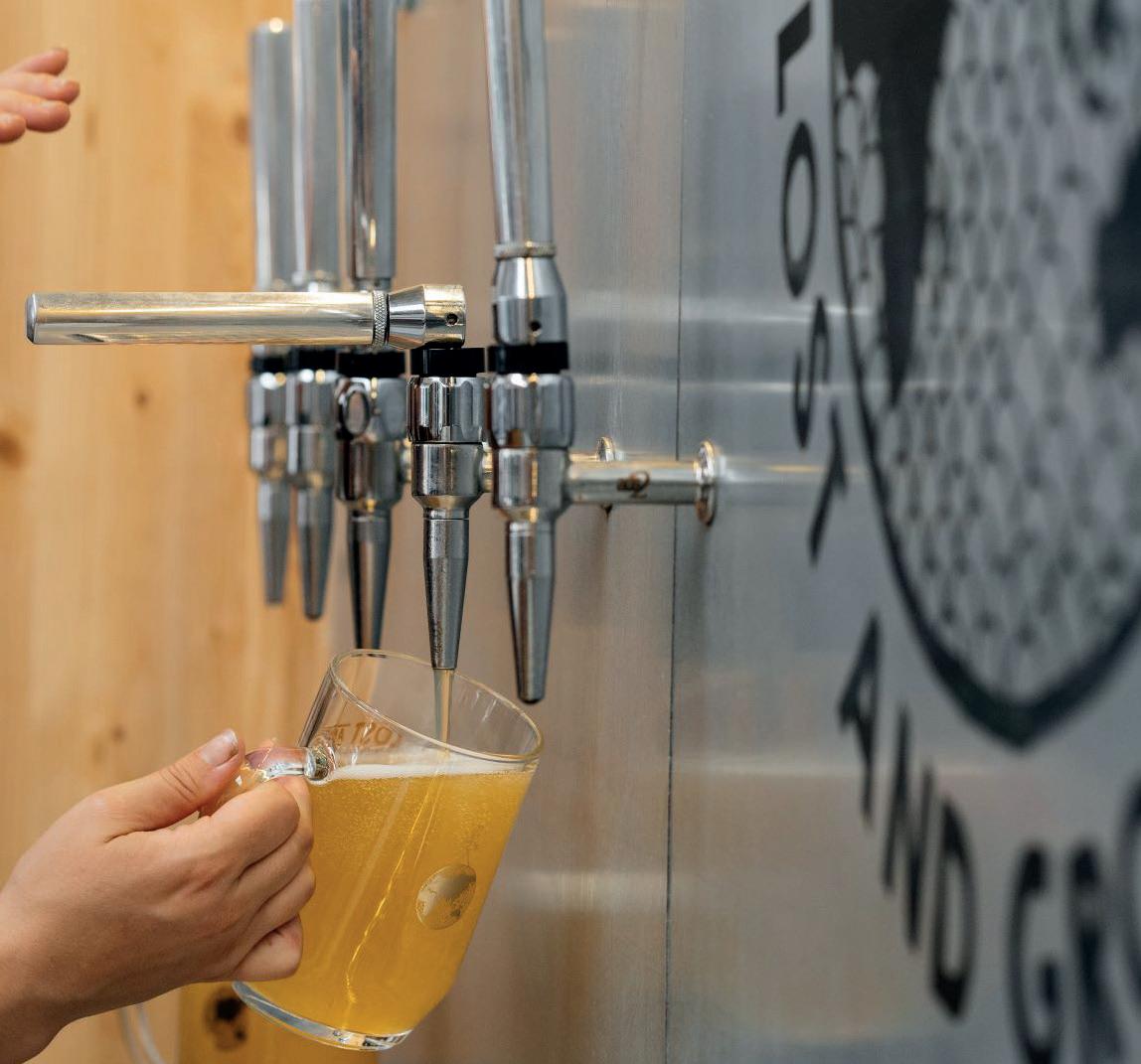
For food, they have an ever-changing offering from Bristol’s street food scene - check out the website at www.lostandgrounded.co.uk to see who’ll be there if you’re going.
Our recommendation for a first pint? Keller Pils, but make sure you also try Apophenia, their Belgian style Tripel.
There are also a number of excellent taprooms within walking distance, including Wiper & True’s brand new site, Left Handed Giant, Newtown Park, Good Chemistry, Moor Beer and Little Martha’s.
55 www.siba.co.uk | SIBA Independent Brewer | Winter 2022
Taproom focus: Lost & Grounded Brewery
SIBA’s
highlights some of the best taprooms from across the UK…
SIBA’s Guide to the alcohol duty system changes
SIBA’s Guide to the alcohol duty system changes
SIBA’s Guide to the alcohol duty system changes
In September, the Government announced the latest version of its changes to the alcohol duty system which are planned to come in on 1 August 2023. Alongside this it published draft legislation and a technical consultation meaning that some aspects may not be quite finalised yet. Below is a guide for members on some of the latest changes and members can also access a detailed guide and calculator on the SIBA Toolbox.
Small Producer Relief
In September, the Government announced the latest version of its changes to the alcohol duty system which are planned to come in on 1 August 2023. Alongside this it published draft legislation and a technical consultation meaning that some aspects may not be quite finalised yet. Below is a guide for members on some of the latest changes and members can also access a detailed guide and calculator on the SIBA Toolbox.
Small Breweries’ Relief (SBR) will become part of a new Small Producer Relief, which expands SBR to include all alcoholic products (such as cider) that are below 8.5% ABV. This will mean that anything above 8.5%, such as imperial stouts, will pay the full duty rate of £25.88.
Small Producer Relief
Small Breweries’ Relief (SBR) will become part of a new Small Producer Relief, which expands SBR to include all alcoholic products (such as cider) that are below 8.5% ABV. This will mean that anything above 8.5%, such as imperial stouts, will pay the full duty rate of £25.88.
When calculating your total production for relief purposes there will be some significant changes. First of all beer at or below 1.2% will not count towards production as the definition of beer is changing from exceeding 0.5% to exceeding 1.2%. Secondly, you have to include the total of all alcoholic products you make, even if it doesn’t benefit from relief. For example if you also make cider, made wine or spirits this volume must be included in your total production.
When calculating your total production for relief purposes there will be some significant changes. First of all beer at or below 1.2% will not count towards production as the definition of beer is changing from exceeding 0.5% to exceeding 1.2%. Secondly, you have to include the total of all alcoholic products you make, even if it doesn’t benefit from relief. For example if you also make cider, made wine or spirits this volume must be included in your total production.
You also need to convert this into Hectolitres of Pure Alcohol (HLPA). Relief is no longer just based on how much you produce but also how strong the alcohol is with the start and finish of the new relief curves set in HLPA as you can see in the following graph.
£18.00
£16.00
£14.00
£12.00
£10.00
£8.00
£6.00
£4.00
You also need to convert this into Hectolitres of Pure Alcohol (HLPA). Relief is no longer just based on how much you produce but also how strong the alcohol is with the start and finish of the new relief curves set in HLPA as you can see in the following graph. £-
£20.00 0
£2.00
Non-draught beer and cider <3.5%
Non-draught beer >3.5%,<8.5%
Non-draught cider >3.5%, <8.5% Draught beer <3.5%
Draught beer >3.5%,<8.5% Draught cider >3.5%, <5.5% (sp), <8.5%(st)
The eagle eyed might notice that no duty is payable for those brewing less than 5 HLPA. This is because the Government is intending to apply the equivalent of the farmgate exemption to beer and other products. Breweries (and cider makers) below this level will have to register with HMRC but will only have to pay duty on products above 8.5% which will also count toward their total production for relief purposes. Once a producer exceeds this threshold they would move to the next marginal band and their overall discount will reduce gradually from 100% to 0% as they grow. This means that the benefits of the exemption are felt by larger brewers higher up the curve.
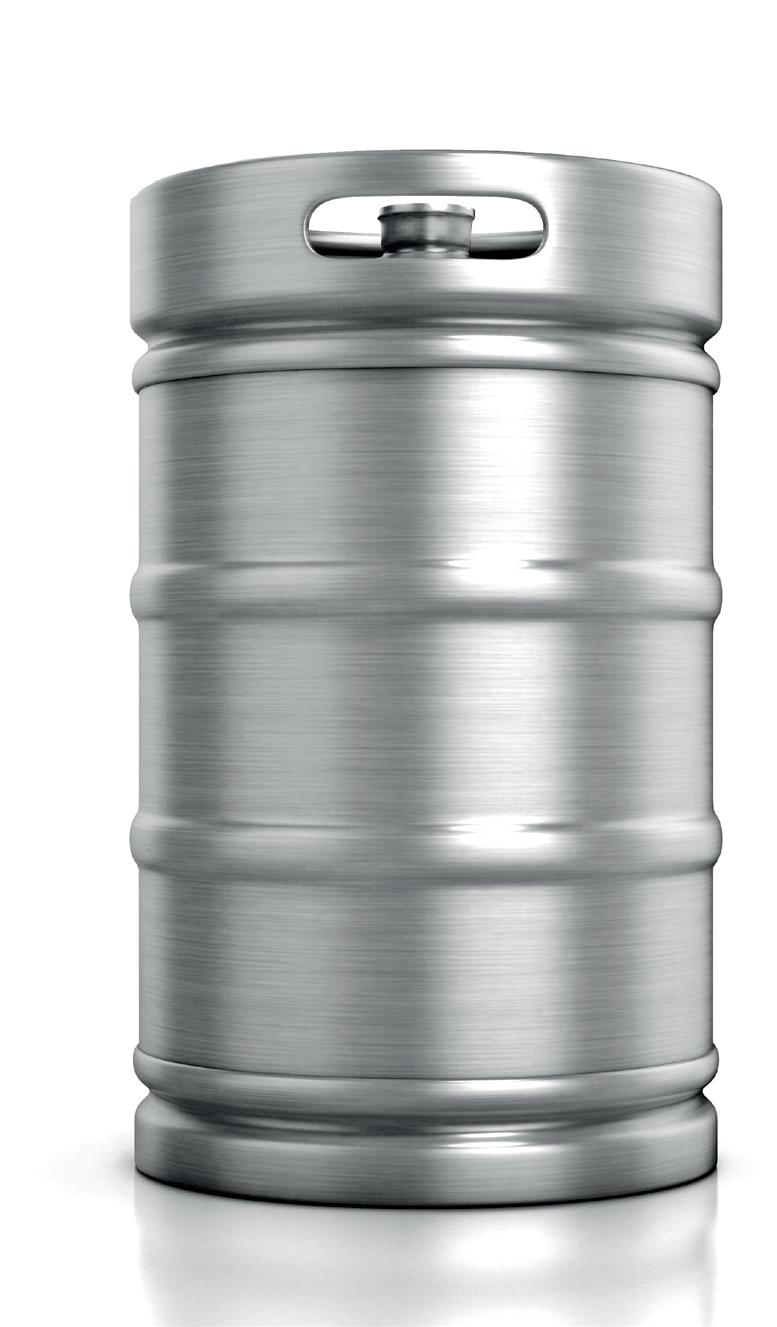
56 Winter 2022 | SIBA Independent Brewer | www.siba.co.uk
250 500 750 1000 1250 1500 1750 2000 2250 2500 2750 3000 3250 3500 3750 4000 4250 4500 4750 5000
SIBA’s Guide to the alcohol duty system changes
Calculating your cash relief












Small Producer Relief will be on a cash basis which means that instead of a percentage, a different cash relief is given at each of the different rates. You can calculate that by using the new lookup tables and the new formula - D= C + (M x (P-S))/P. This will give you the cash discount (relief) which you then subtract from the main duty rate to get the rate you will pay. In the formula, D is the discount in £ per litre of pure alcohol, C is the cumulative discount for that band, M is the marginal discount for that band, P is the production amount in HLPA in the previous year and S is the start threshold for that band.
For example, a brewery makes 2,400hl of beer at an average of 4.5% last year. This would mean they produced 108 HLPA. They then want to produce a 4% non-draught beer and want to calculate the duty discount. The relevant information in the lookup table will be this:



















Non-Draught Beer of an alcoholic strength of at least 3.5% but less than 8.5%
Discount band Start threshold (hectolitres) End threshold (hectolitres) Marginal discount (£) Cumulative discount (£) 2 5 112.5 9.54 95.40









D= C + (M x (P-S))/P




C = 95.4 M = 9.54 P = 108 S = 5 D = 95.4 + (9.54x(108-5)/108 D = £9.98














































































































































































































































The brewer then uses the headline rate of duty and minus the cash relief to work out their duty rate. Here it would be £19.08£9.98 which is £9.10 per LPA on the 4% non-draught beer.



Rates structures







There are three key changes for small brewers:
• The reduced rate will be widened from below 2.8% to below 3.5% ABV and small brewers will receive relief at this level





• The higher rate will start at 8.5% ABV that brewers will pay the same as wines and spirits
• The higher rate will start at 8.5% ABV that brewers will pay the same as wines and spirits
• The higher rate will start at 8.5% ABV that brewers will pay the same as wines and spirits
• Cider will benefit from a lower rate (£8.78 versus £19.08 between 3.5




















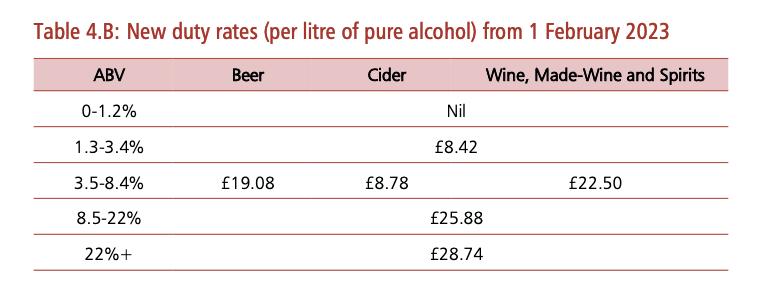
Draught relief
Draught relief
A new reduced rate of approximately 5% for draught products in large containers is being introduced. To qualify the product must be below 8.5% ABV, in large containers of at least 20 litres and sold as to connect to a dispense system. Relief will also apply to the draught duty rate and involve using the same formula above but referencing a different lookup table. The changes also impose a repackaging restriction which means that they cannot be transferred to smaller containers that are not for immediate consumption unless authorised. This means that draught products cannot be placed into growlers/ crowlers or other containers for takeaway unless authorised to do so. If authorised then the difference in duty will have to be charged. SIBA has been lobbying for some changes to this.
Draught relief
A new reduced rate of approximately 5% for draught products in large containers is being introduced. To qualify the product must be below 8.5% ABV, in large containers of at least 20 litres and sold as to connect to a dispense system. Relief will also apply to the draught duty rate and involve using the same formula above but referencing a different lookup table.
A new reduced rate of approximately 5% for draught products in large containers is being introduced. To qualify the product must be below 8.5% ABV, in large containers of at least 20 litres and sold as to connect to a dispense system. Relief will also apply to the draught duty rate and involve using the same formula above but referencing a different lookup table. The changes also impose a repackaging restriction which means that they cannot be transferred to smaller containers that are not for immediate consumption unless authorised. This means that draught products cannot be placed into growlers/ crowlers or other containers for takeaway unless authorised to do so. If authorised then the difference in duty will have to be charged. SIBA has been lobbying for some changes to this.
The changes also impose a repackaging restriction which means that they cannot be transferred to smaller containers that are not for immediate consumption unless authorised. This means that draught products cannot be placed into growlers/ crowlers or other containers for takeaway unless authorised to do so. If authorised then the difference in duty will have to be charged. SIBA has been lobbying for some changes to this.
57 www.siba.co.uk | SIBA Independent Brewer | Winter 2022

|
| www.siba.co.uk PUTS BREWERS BACK IN CONTROL.
is a trading style of
in
and
(Company number 5826492) and its registered
is Unit 1,
3NX. Our new short-term rental product − the same containers with added benefits: RFID technology, transparent billing, flexible delivery options and you only pay when you’re using them. To find out more call 01425 485421 or visit closebreweryrentals.co.uk/ekegplus
58 Winter 2022
SIBA Independent Brewer
Close Brothers Brewery Rentals
Close Brewery Rentals Limited, which is a subsidiary of Close Brothers Limited. Close Brewery Rentals Limited is registered
England
Wales
office
Kingfisher Park, Headlands Business Park, Blashford, Ringwoord, Hampshire BH24
Brewing Apprenticeships
Hot on the heels of our apprenticeships feature in the last edition of SIBA Independent Brewer, in this issue we bring you two more case studies showing how the Brewer Apprenticeship programme works both from the perspective of a brewery and an apprentice. We also include a reminder of the key benefits of the programme, which has been specifically developed by HIT Training in collaboration with brewers to support UK breweries in growing and developing the next generation of talent needed in their brewhouses.
HIT Training is the only training provider in the sector to offer the brewing apprenticeship and has been instrumental in designing the programme content and delivery model. The aim of the apprenticeship is to improve employees’ skills and increase their efficiency and productivity in a demanding and often sought-after role.
HIT Training works closely with both employers and apprentices to deliver a training programme which meets the bespoke needs of individual breweries and apprentices’ career aspirations. The apprentices will gain from in-work experience covering a broad spectrum of activities, from gaining an understanding of ingredient provenance and the importance of stock control, to safe operation of brewing equipment, design of beer recipes and brewery promotion.
Jill Whittaker, Managing Director of HIT Training, said: “We’re extremely proud to have been part of the trailblazer group which has developed the Brewer Apprenticeship and to be among the first to deliver it to the sector. The UK brewing and pub industries are significant contributors to the national economy with over 2,000 breweries currently in operation. It’s brilliant news to see the sector taking control of its future and making sure it has the best workforce for the exciting time ahead via offering high-quality training opportunities such as this apprenticeship.”
Brewing Apprenticeships
What is a Brewer Apprenticeship?
● Entry: Employers will set their own entry requirements in order to start on this apprenticeship.
● Duration: Typically a Brewer Apprenticeship will take 18 months.
● Level: This apprenticeship standard is set at level 4.
● Delivery model: Apprentices access a library of online learning resources, developed and designed to deliver the essential knowledge elements of the programme.
● Content: The online modules prepare each apprentice for the face-to-face workshops and provide invaluable revision resources for the learner. Each apprentice will attend 12 workshops (6 x 2-day residential) at the International Centre for Brewing Science at the University of Nottingham. Industry experts will bring the theory and practice of brewing to life with a series of lectures, practical sessions and tutorials.
● Requirements: If the employee does not have maths and English GCSE passes at grade C or above, they will need to pass maths and English Functional Skills level 2 during their Apprenticeship.
● End-Point Assessment: the employer, training provider and apprentice will agree when the apprentice is competent and ready to undertake the independent end point assessment. Alongside the apprentice, HIT professional trainers will agree on a personal learning and development plan, setting a timetable of learning activities in preparation for the EndPoint Assessment (EPA). The HIT Training Consultant will meet with the apprentice regularly either online or face to face to complete and review assessments, provide further coaching where required and agree the next steps of learning.
Key benefits of the Brewer Apprenticeship programme


● The measurable impact to business: apprentices learn new methods, techniques and efficiency models which, when brought back into the brewery, ultimately impact on improved business performance and efficiencies.
● HIT’s expert Brewer Trainers will review learning progress at each stage of the delivery, visiting the Apprentice’s Brewery and assessing their application of their new found knowledge and skills. This is in essence a free business consultation with an industry expert.
● Apprentices, if requested, will also complete and earn their Institute of Brewing and Distilling ‘General Certificate in Brewing’ as part of their learning.
● Running a successful brewery, pub or licensed premises requires an expert team comprising the best chefs, kitchen staff, servers and managers. Investing in work-based apprenticeships for staff can make a world of difference to a team’s expertise, practical and social skills - and is not only affordable but worthy too.
● Creating a team that delivers high-quality customer experiences, entices people back time and time again and gets people talking about a business for the right reasons. To secure future growth, brewers need to nurture their own talent.
● Providing skills that increase efficiency, productivity and enable innovation, in turn, boosts the bottom line. Investment in training and development of staff always pays dividends.
59 www.siba.co.uk | SIBA Independent Brewer | Winter 2022
60 Winter 2022 | SIBA Independent Brewer | www.siba.co.uk Let’s talk about scan-free Stainless steel keg & cask rental 0800 534 5000 kegstar.com rent@kegstar.com We’ve made it simple. Give us a call, drop us an email or get in touch with your account manager to know more about our new way of working.
Brewing Apprenticeships
Case Study
Brewery Case study: Hydes Brewery
When did you first begin offering Brewing Apprenticeships and how many apprentices have you/do you intend to employ?
We first started offering brewing apprenticeships three years ago now and we have successfully seen one through the program (who graduated with a Distinction!) and we currently have another “in study”. We have been so pleased with the apprenticeships and their level of competence from the scheme to date, that it is highly likely that we will look to recruit another in the not too distant future!
Why did you decide to offer Brewing Apprenticeships?
Our small brewing team at Hydes is extremely experienced. Collectively we have almost 200 years served in the industry. Unfortunately, with great experience comes age! We therefore needed some new blood to join the team and prepare us for eventual retirement of certain members. We are a serious brewer with 160 years of brewing heritage, and we wanted to ensure that we plough forward with the very best people in our team. It made perfect sense to us to recruit younger, enthusiastic people who share our values and passion for beer and to give them the opportunity to study and fully understand the “nuts and bolts” of the process. It is also important for us that they get a full experience of the brewing industry and not just what Hydes has to offer. We want our team to be forward thinking and have a modern outlook and the apprenticeship fits this bill perfectly.
How does the scheme work from a brewery perspective?
The scheme allows the trainee to fully participate in the day-to-day activities of the brewery learning core skills “on the job”.
Personal study is conducted out of work time (but we do allow some time for this in the workplace). There is also short and regular studies away from the brewery where the apprentice is able to mix with other members of their cohort. This is especially useful and allows the apprentice to share ideas and learning with colleagues on the scheme. We find that this helps to keep the scheme relevant and engaging.
What are the key skills the apprenticeship covers?
All aspects of the brewing and packaging process. At Hydes we also like to involve the apprentice in engineering matters, basic accountancy about what is required from the brewer for the company accountant, order taking, distribution and delivery, as well as the opportunity to get involved in running a pub!
What are the main advantages to your business of offering the apprenticeship?
We end up with a knowledgeable and engaged individual who not only has a rounded
understanding of how things work in Hydes, but also has a wider understanding of what is going on in the industry. In short, they become a very valuable asset to the team.
What advice would you offer to breweries considering the apprenticeship?
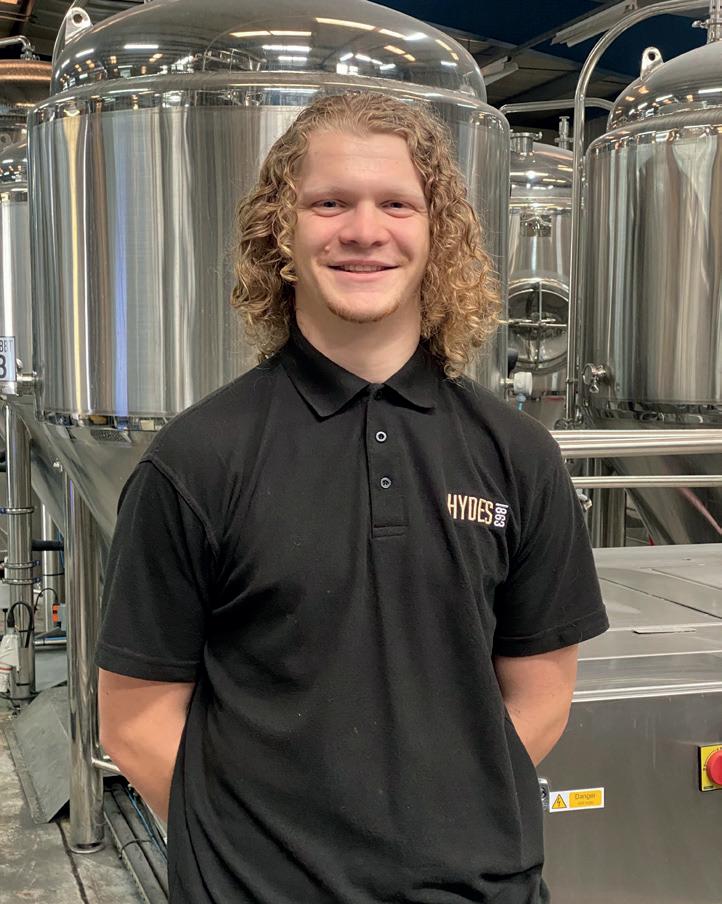
Engage with the scheme! If you have a suitable candidate who really is interested in progressing themselves and learn a trade, then the rewards for both parties are excellent.
Longer term what do you hope your apprentice(s) will contribute to your business?
Our apprentices have shown to be a real asset to the team. Their studies have given them a thirst for more and I am sure that they will continue to Diploma level and maybe beyond. I have no doubt that they will be able to take up management roles with further training.
How do you think the apprenticeship will impact the future of the brewing industry overall?
My feeling is that the brewing industry, over the last 20 years, has become full of enthusiasts who have a passion for beer. There is nothing wrong with that, of course. But what I don’t see is that passion founded on a sound technical footing to underpin it. The
industry needs scientists and technicians as well as passion. The apprenticeship scheme allows the individual to substantiate his/her enthusiasm with a good technical knowledge.

61 www.siba.co.uk | SIBA Independent Brewer | Winter 2022
brewing
After all, brewing is the oldest biotechnology!
Brewer Apprentice Tom Allkins, Hydes Brewery
Tom Allkins is currently doing his Brewer Apprenticeship with Hydes Brewery and is actually a member of the Hydes family. His Grandfather Chris Hyde was Head Brewer and Chairman and he also had an Uncle Andrew that worked as a Brewer too.
Hydes Brewery in Manchester has already had one Brewer Apprentice who passed their apprenticeship with distinction, and is currently nurturing their second apprentice. The scheme has been so successful for the brewery that more candidates are being sought. We spoke to Hydes’ Training Manager Laura Miller to find out more…
Chris Hyde was Head Brewer and Chairman with Hydes Brewery

NOW YOU CAN T: +44 (0)1327 342589 E: SALES@core-equip.com GET IN TOUCH Want counter-pressure quality? INTRODUCING THE CODI CCL-45 CANNING SYSTEM core-equip.com Quality you can taste Whether you are looking to upgrade your canning line or thinking about getting into canning for the first time, the CODI CCL-45 gives you the perfect fill, every time. Contact Core now to find out more. 55 PER MINUTE Consistently fills 55 cans per minute detecting missing or damaged cans HIGHER CO2 4 parts CO2 per volume at 10º Celsiusenhancing flavour LESS THAN 30 PPB O2D Compared to 100ppb in other filling technology, preserves beer longer
Brewing Apprenticeships

Case Study
Apprentice Case Study: Caitlin McErlean, Brewer, Cloudwater
Uni passion
Caitlin’s passion for making beer began at university in Durham, whilst working at a local pub which specialised in craft beers. Soon, her interest in learning Chinese (yes, she also has a degree in Chinese Studies!) waned and by her second year she knew that brewing was the career for her. But where to start? Caitlin assumed she’d need a science-based degree, so decided to find work in hospitality and see if she could find another way in.
Joining the B&K team
Fast forward a couple of years and Caitlin joined Brewhouse and Kitchen, a brewery chain with over 20 ‘Brewpubs’. After succeeding in their internal ‘Beer Specialist’ training course she was then sponsored by the company to begin the L4 Brewer apprenticeship. Unexpectedly, 18 months into the apprenticeship, an opportunity came up at Cloudwater Brewery in Manchester, which Caitlin describes as, ‘my dream job, in my dream location’. As apprenticeships today are fully portable, not only was Caitlin able to transfer her apprenticeship to Cloudwater, but also was able to continue her ‘off the job’ apprenticeship training with HIT Training.
Workshops
In addition to working with her HIT trainer, as part of the brewing apprenticeship Caitlin also attended six two-day workshops at the International Centre for Brewing Science at the University of Nottingham. Here, she learned about the scientific and technical aspects of brewing, via a series of lectures and practical sessions run by beer industry experts. It was this element of the apprenticeship that Cailin says
she enjoyed the most: “The mix of science and creativity was challenging but really stimulating. It was also a great opportunity to meet other apprentice brewers. Brewing is a really kind, sociable industry – everyone was happy to share their experience and help each other out.”
End-point assessment day
Just over two years after starting her apprenticeship, Caitlin was ready for her brewer end-point assessment. Working with her HIT trainer, she’d already completed a ‘Mock EPA’ and had put together an extensive brewer logbook she was able to refer to. This preparation was important she says, and her personal tip for EPA success would be: “Ask your trainer for the end-point assessment criteria. That way you can be sure you are
Want to get involved and find out more about the Brewer Apprenticeship?
focusing your preparation in the right areas.” Also key to her success on the day, Caitlin says, was the calm encouragement she received from her FDQ Independent Assessor, Graeme.
“It was an intense, long day but I really enjoyed it. I was assessed whilst performing typical brewery tasks, then I completed an hour-long knowledge test and finally had a one-toone Q&A type discussion with my assessor. Throughout, Graeme was very encouraging, striking the right balance between being professional but also friendly. It really put me at ease.”
Caitlin says when she discovered she’d passed with flying colours and was also the first female brewing apprentice to do so. “Honestly I cried! It felt so wonderful because it’s something I care about so much,” she said.

Cloudwater
Caitlin now works ‘hot-side’ as a full-time brewer with Cloudwater, which involves managing the brewing process from raw ingredients up to fermentation stage. She says she couldn’t be happier: “As well as working with great people, I just love the feeling of producing a beer that I know people are going to enjoy.”

Having completed the apprenticeship, Caitlin isn’t ruling out further study. In fact, having the Level 4 Brewer Apprenticeship under her belt means she could now look towards gaining professional qualifications in Brewing or even studying for a Masters in Brewing Science. As she concludes: “The brewing apprenticeship has really opened up doors for me.”
Breweries can enquire directly to HIT Training via www.hittraining.co.uk/brewer-apprenticeship. Interested breweries are welcome to attend any of the university workshops, by request, and meet the delivery team involved.
63
| SIBA Independent Brewer | Winter 2022
www.siba.co.uk
Caitlin McErlean is a 26-year-old brewer who became the first woman in the country to successfully complete their Level 4 Brewer Apprenticeship. And as if that wasn’t enough, Caitlin achieved the highest grade possible at end-point assessment – a Distinction.




Lease disrepairwho is responsible?
One of the trickiest questions for any business occupier is: “Who is responsible for repairing what parts of the property?”
There are three main stages where this question crops up. Firstly, and perhaps most importantly, before the lease is entered into. Secondly, during the term of the lease. Finally, at the end of the lease - both when the tenant is vacating and if they are taking a renewal lease.
The best way out of a bad situation is to avoid it in the first place!
Avoid any kind of occupation unless proper written terms are in place - either as a lease or a licence (although from an occupier’s point of view a licence should usually be avoided as it can often be easily terminated by the property owner).
No matter what the proposed terms of the lease, it is almost always a good idea to instruct a Chartered Building Surveyor to inspect the property and point out any problem areas. The emphasis here is on Building Surveyor - there are many types of surveyors out there but only these are properly qualified to assess the condition of buildings.
If there are repair issues, try to agree who resolves them as part of the new lease deal, ideally before the lease is entered into. Also, consider agreeing a term whereby the tenant isn’t obliged to put the property into any better condition than is evidenced by a “Schedule of Condition”. This should be prepared by the Chartered Building Surveyor and contain a detailed spreadsheet describing all items coupled with lots of good colour photographs. Attach the Schedule to the lease.
Perhaps the most important clause to check is how the “Premises/Property” is defined because that is what the occupier must look after. Does it for example include structural and external or just internal parts?
If the occupier is not to be responsible for the repair of the structure, check there is a corresponding positive obligation on the landlord to do so.
Also look out for the ability of the landlord to recover the cost of repairs from the tenant e.g. of common parts on a multi-let estate though a Service Charge. Some landlords can abuse this type of clause.
During the lease - don’t let problems fester
Whoever has responsibility to repair should review the position regularly and not shore up problems for later. We recently had a case where a landlord failed to repair a large iron fire escape over a 20 year period, arguing the tenant should pay for the cost of replacement (over £70,000) and that this saved the tenant paying for maintenance over that period! Regular maintenance is key, particularly for
items like roofs and plant and machinery e.g. heating systems, lifts.
Beware lease terms allowing a landlord to serve “Interim Schedules of Dilapidations” whereby the tenant can be made to carry out repairs within say 2 months of a written notice being served by the landlord - failing which the landlord can enter, carry out works and recover costs from the tenant!

At the end of the lease - take expert advice early
If the above steps are followed then an occupier should avoid a nasty surprise at the end of the lease - the dreaded “Terminal Dilapidations” claim. Especially if the occupier doesn’t intend to renew, as the end of the lease approaches (suggest no less than 6 months before), they should seek advice from a Building Surveyor and a solicitor who specialises in commercial lease “dilapidations”. Working together they will advise the occupier on their legal obligations to ensure as far as possible, that any liability is mitigated. Landlords often serve inflated claims which can be massively cut down with the right advice.
For advice on this topic or on legal issues affecting your business, please contact the SIBA Legal Helpline on 0845 6710277
North West Law firm Napthens LLP is a SIBA supplier associated and Silver Standard Sponsor. The firm has a team of specialists looking after legal requirements of clients in the leisure and licenced trade sector, with clients including Daniel Thwaites Plc and Titanic Brewery.
Napthens manage the SIBA Legal Helpline which offers legal advice and guidance on a wide range of legal issues affecting your business, including: General commercial, intellectual property, corporate finance, dispute resolution and litigation, commercial property, licensing, employment law and HR advice. Any enquiry through the helpline will receive up to 1 hour of free legal expertise (if further work is required, you’ll be advised of the appropriate charging structure).
Full details of the helpline can be found on the SIBA Members Toolbox.

65 www.siba.co.uk | SIBA Independent Brewer | Winter 2022
Legal
Business advice:
In this article, Napthens partner and head of commercial property disputes, David Bailey, shares his thoughts on the best approach for business tenants to take regarding property repairs.
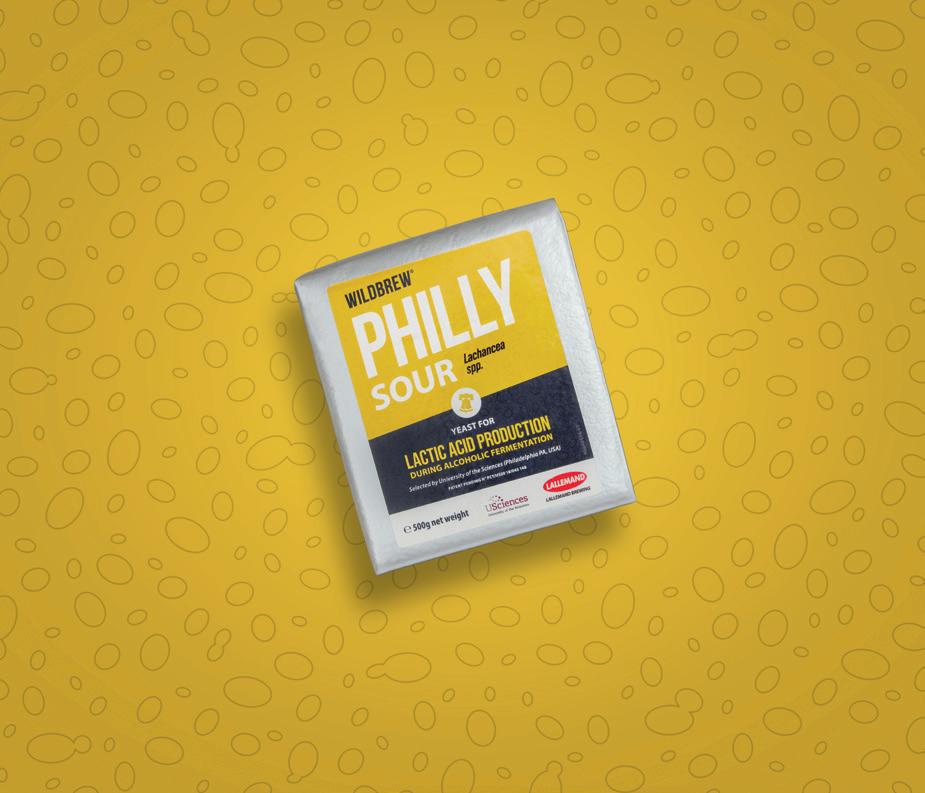

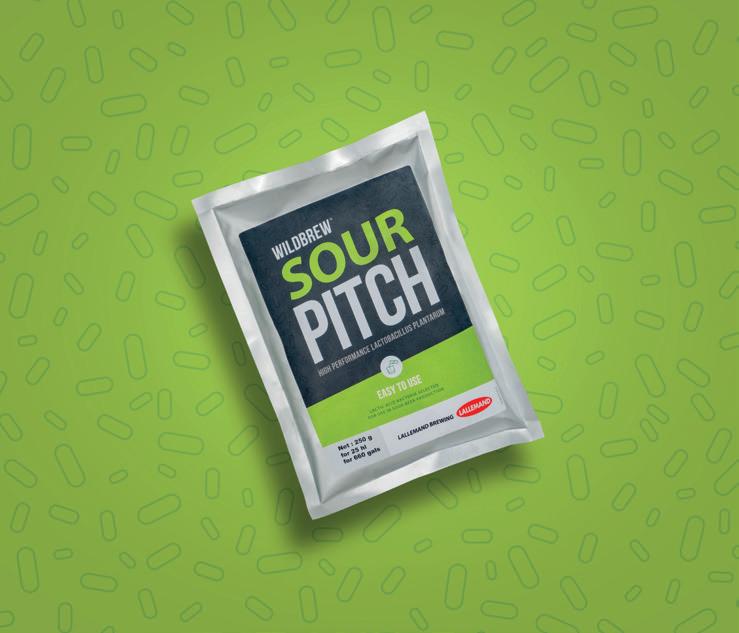


















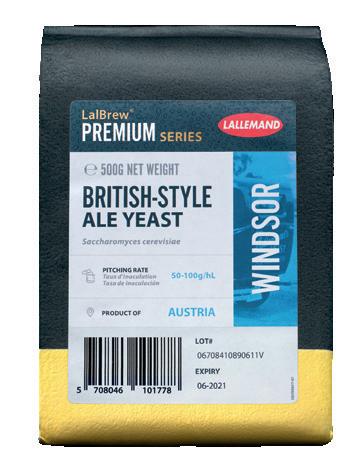



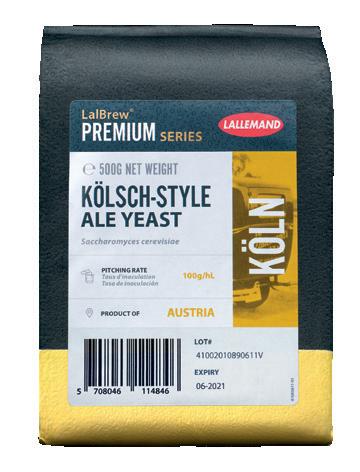

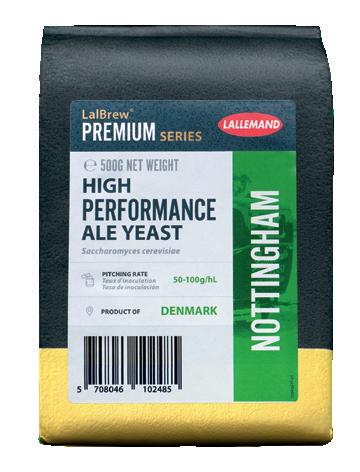


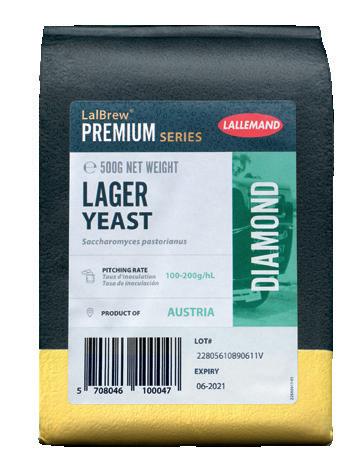
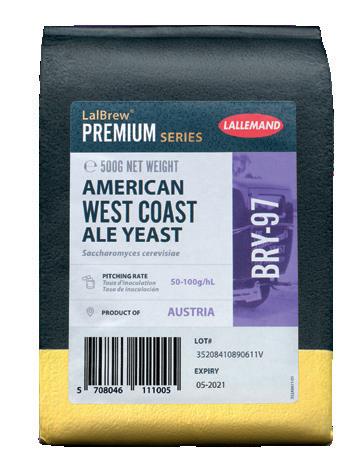
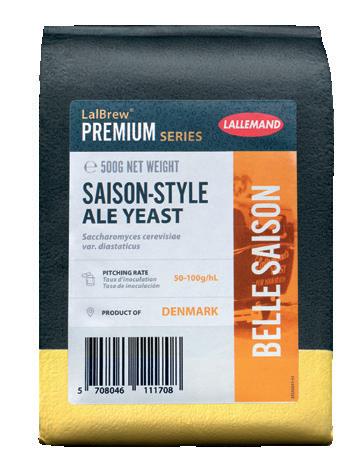


66 Winter 2022 | SIBA Independent Brewer | www.siba.co.uk Scan to see our BREWER’S CORNER CONSISTENT, RELIABLE BREWING YEASTS & BACTERIA We Brew WIth You. ™ › Brewing Calculators › Best Practices › Recipes › and more NEW www.lallemandbrewing.com | brewing@lallemand.com
Education. Education. Education.
The power of learning
In 1997, Tony Blair delivered a manifesto for the forthcoming General Election containing the three main priorities under a New Labour government: ‘Education. Education. Education’.
New Labour set about implementing their policies, after winning a landslide election. These were largely successful, especially in the area of improving GCSE grades amongst low performing schools.
Another political figure, Nelson Mandela, once said: “Education is the most powerful weapon which you can use to change the world.” He was right: studies have shown that prisoners who learn a new set of skills and grow their knowledge are less likely to reoffend, compared to those who remain uneducated.
At this point, you may be asking, ‘What has education got to do with beer?’. I would argue, everything!
A friend of mine recently asked me, ‘What is a Cold IPA?’.
‘Well,’ I responded, ‘it’s an IPA that’s cold, innit?!’
We both chuckled at my facetious answer but - truth be told - I had no idea. So, we used everyone’s favourite educational toolGoogle - to find out.
I read aloud from an article I found called ‘The Essential Guide to IPA’ before we tucked back into our own beers, safe in the knowledge that a Cold IPA isn’t an India Pale Lager but isn’t too dissimilar to a Steam Beer…but isn’t a Steam Beer.
You might be feeling confused at this pointI know I was. I had to read the article several times over before I fully understood what a Cold IPA is, and I thought I knew a great deal about beer.
But what about the vast majority of people who don’t know a great deal about beer…?
Outside the echo chamber
It’s easy to shy away from educating consumers in simple terms about what’s in their glass, various beer styles or the brewing process for fear of teaching people to suck eggs.


However, it’s also easy from within the craft beer echo chamber to assume that everyone who encounters your beers or attends your taproom are well versed in acronyms, hop varieties, vessel names, packaging types or beer styles.
The reality is that most people don’t know and aren’t going to ask.
It struck me recently when I picked up a can of a Double Dry Hopped IPA that consumers might overlook this beer, simply because the label in question didn’t offer any clues as to what a ‘DDH IPA’ is.
Though the label was extremely pretty, it only told me that it was a ‘DDH IPA’. Yes, it listed the hop varieties, ABV and units of alcohol, but nothing else. The brewery missed a trick by not using their label as a way to explain to their drinkers what it is they’re drinking.
Simple, relatable terms like ‘juicy, fruit and citrus’ are easily digestible terms. A short description of what to expect is a mere starting point when educating consumers about craft beer.

Keeping it simple


People relate to language they understand.
When my wife - a teacher - gets together with her teacher friends, they suddenly start talking in terminology that would make Shakespeare’s head spin; I am instantly excluded from their conversation and thrust into a world of acronyms and subordinate clauses. Imagine how a potential customer

might feel if you start hitting them with terms like ‘foeder aged’ without explaining what a foeder is.
In a day and age where most people have access to the internet and social media, your website and social channels such as TikTok and Instagram are the perfect forum to educate people on what you’ve brewed, why it’s special and what people should expect using easily understandable language.
At the end of a brewery tour, many attendees - especially those with little to no idea about craft beer - would often tell me they had found a new appreciation for beer. By providing them with a little education, you may win a craft beer devotee for life.
Award winning beer writer, Lily Waite, wrote an excellent article for Good Beer Hunting (goodbeerhunting.com) called The Call Is Coming From Inside the House — Craft Beer’s Self-Inflicted Existential Crisis. She accurately depicts the problem that most craft brewers have: they’re too busy excluding people through their marketing language (amongst other things - read the article!) when they should be welcoming new drinkers into the fold.
All it takes to win those people over is education, education, education.
Nick Law is the Creative Director of Hop Forward: a branding, marketing and business consultancy for the brewing industry. He works with a variety of beer businesses both in the UK and overseas and also runs a weekly podcast with a variety of guests from across the world of beer. Find out more at www.hopforward.beer or email nick@hopforward.beer
67 www.siba.co.uk | SIBA Independent Brewer | Winter 2022
Brand and marketing guru Nick Law explores how educating your customers can help you to sell more beer…
Business advice: Brand and Marketing


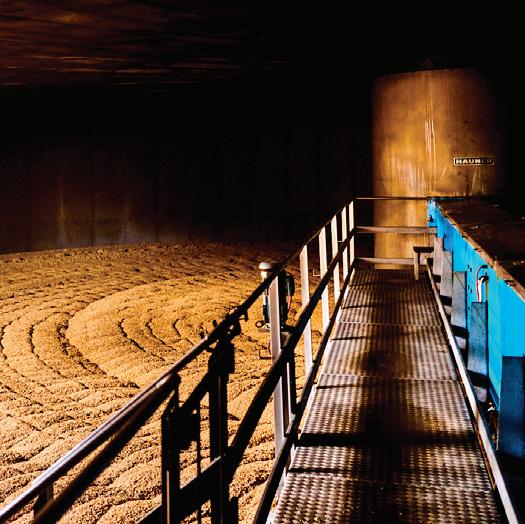


68 Winter 2022 | SIBA Independent Brewer | www.siba.co.uk
Drinking Differently
Say hello to the cautious consumer
The current cost-of-living crisis is not going anywhere for a while and consumers know it. Consumer confidence is at the lowest point in decades as many struggle with making ends meet and many more begin to spend with much more caution than we’ve seen for years; more than 1-in-2 expect to be much more aware of how they spend their money over the next 12 months.
1-in-3 Brits say they are already going to restaurants, pubs and bars less frequently compared with 3 months ago. Where we’ve seen growing footfall back to hospitality venues, we can expect to see a shift of beer consumption back to the home. And when people do eat and drink out 1-in-4 say they’ve been choosing cheaper menu items and 1-in5 have been choosing cheaper drinks. Whether we like it or not, price and more importantly ‘value’ have started to play a much more significant role in determining where, when and what people are drinking. This doesn’t mean we have to run panicking towards promotions and discounts, it means we need to look carefully at our pricing ladders. We need to ensure we have ‘entry level’ options for days when a consumer wants to spend less but also, we have the right premium, quality range to excite and delight consumers when they want to treat themselves. Which they will, even in tough economic times.
Keeping prices down is a tough ask, virtually impossible in today’s climate, so operators should look at ensuring that they can maximise the ‘added value’ wherever possible. Consistency of quality serve, consistency of quality of staff, alongside cleanliness, atmosphere, events, etc. Every asset must be sweated to its maximum if we want to ensure that customers are not just understanding of the price increases but that they are happy to pay them as well.
The great moderation
We’ve said it before and we’ll say it again, it’s not all about booze! Some 55% of UK drinkers consume fewer than 10 units of alcohol per week, according to KAM research earlier this year. This growing ‘moderate’ group of drinkers are, however, also the most likely type of drinker to visit a pub at least once per month (78%), highlighting a major shift in consumer behaviour. As we’ve mentioned before, drinkers are increasingly moderating their alcohol intake but still actively taking part in traditionally alcoholled social occasions. There is no doubt that alcohol still plays a huge role in modern British life, but our social occasions are becoming less dominated by it.
The research, carried out in partnership with Lucky Saint, found that the average UK drinker is now frequently moderating between alcoholic and non-alcoholic drinks, with nearly one in three pub visits (29%) and 37% of restaurant visits being completely alcohol-free. These occasions are most likely to be when dining with family, having lunch and also work meetings.

A time for experimenting
During lockdown many of us tried to replicate our visits to pubs, bars and restaurants in our homes. And there are many things which people have really enjoyed about staying in vs going out; a more relaxed environment, cooking our own food and trying new food and drink are among the top things, according to our recent research with Zonal.
Lockdown has in fact been an amazing catalyst for consumers experimenting, trying new things and new brands, and just shaking up people’s eating and drinking habits. What does this mean for beer? Many people’s regular ‘repertoire of brands’ have been shaken up over the last couple of years. Many had spent a little more on new brands as they
purchased via the off-trade vs on-trade. We’d expect that price will become an increasingly influential factor going forward with people also perhaps looking to trade down cost wise on certain occasions and really treat themselves with the well-known concept of ‘an affordable luxury’ on others.
Additional ‘functional’ benefits
A functional drink is marketed to highlight specific product ingredients or supposed health benefit. In addition to drinks that deliver digestive health benefits and boost energy, there is an increasingly growing market that delivers mood-boosting and relaxation benefits.
Let’s take CBD-infused drinks for example, CBD in drinks has become mainstream and there has been an influx of functional beers, wines, kombuchas and adult soft drinks which include adaptogens in the ingredients list. Many are satisfying wider drinking occasions and meeting the needs of an increasingly health-conscious consumer with their well-being front of mind.
26% of consumers have tried a CBDinfused product according to recent KAM research. This has doubled since 2020 (13%). Generation Z and Millennials are the key target market for drinks containing CBD. It is unsurprising that over half of Gen Zs have tried CBD-infused products, much higher than any other age groups. There is a slight leaning to try CBD infused products at home compared with ‘out of home’, perhaps driven by the stigma due to the link with cannabis. However, the majority (32%), would still likely try it in hospitality venues.
KAM Media is a boutique research consultancy, specialising in hospitality and retail, running bespoke and syndicated customer research programmes for both pub companies and on-trade suppliers. Find out more at www.kam-media.co.uk.
69 www.siba.co.uk | SIBA Independent Brewer | Winter 2022
Business advice: Consumer Insight
Katy Moses, the Founder and MD of consumer insight specialist KAM Media, takes a look at how the UK public’s eating and drinking habits might be changing as we head in to 2023…






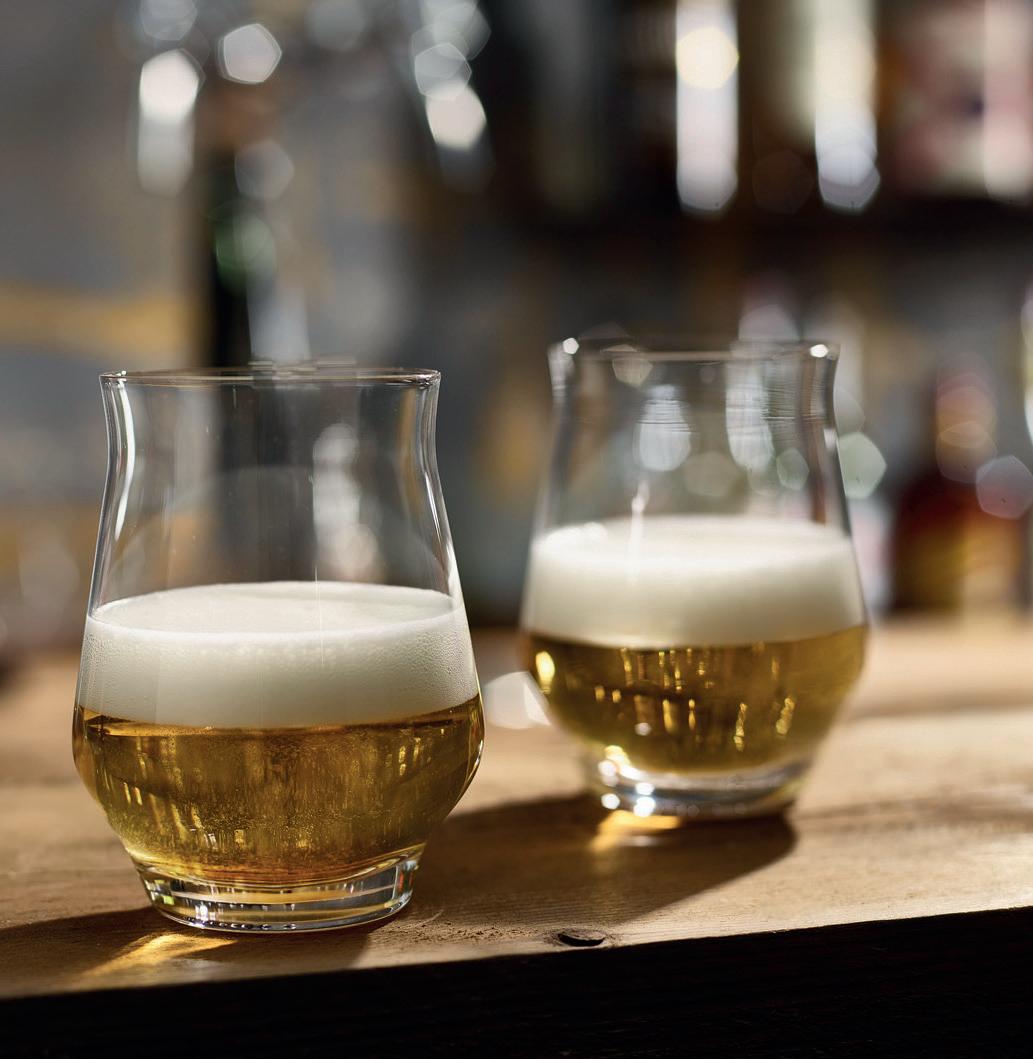
70 Winter 2022 | SIBA Independent Brewer | www.siba.co.uk CORKS WIRE HOODS CROWNCAPS HEATSHRINK C A PSULES &SLEEV ES THAT HELP SEAL, PROTECT AND ADD RELIABLE CLOSURES VALUE TO BRANDS www.rastal.co.uk Taste The Di erence. By RASTAL. RASTAL - at the forefront of glassware design for more than 100 years o ers: · In-house design and graphics studios · State-of-the-art 8-colour decoration with both ceramic and organic inks · A decoration MOQ of just 500 pcs · Dedicated and experienced in-market representation For all enquiries: Suzanne Strain suzanne.strain@rastal.com +44 (0)7894 983 599 Craft Master Pure 33 cl | 41,5 cl
Powering Down
When assessing your power usage, it is clear that boiling wort is the most energy intensive activity in brewing. Not just using your expensive power to heat wort but also to evaporate up to, perhaps, 10% of its water. Clearly a massive energy demand. Moreover, one with a major area of environmental concern compared to other beverages such as cider and wine –although, thankfully, not as energy intensive overall as distilling.

Can this input be reduced? Clearly there are differences in efficiency between electric, gas and steam systems albeit with different capital costs so a choice of instillation may reduce usage. Engineering developments are also available to provide more efficient transfer of heat through thin film evaporative systems, for example. Nevertheless, we still need power to raise temperature and evaporate regardless of its origin and delivery so are there options to reduce the overall demand? Since time is a factor then yes – have a shorter boil. After all is 60 minutes really necessary? And what are the consequences of reducing the time and will they be noticed? After all, boil times 150 years ago were often over 2 hours so how much is really needed?
The purpose of boiling is to mix the wort thoroughly, to sterilize the liquid, to evaporate undesirable flavours such as DMS (di-methyl sulphide), to reduce haze forming proteins/ polyphenols and to produce colour and bitterness from the hops. All of these can be achieved in an hour so if you are boiling for more than that then perhaps reduce this time. If you can, if you have the facilities, introduce different phases of boiling to remove DMS. An initial intensive boiling phase to drive off DMS for about 15 minutes followed by a simmer phase to form DMS of about 30 minutes then a final vigorous boiling phase of 15 minutes to drive off the newly formed DMS. This will reduce evaporation of steam. We have calculated that to evaporate 1% as steam for 1000 litres will cost £1.89 at 30 p/kWh. There are simple fixes in boiling. Clean surfaces will allow efficient transfer of energy so ensure they are cleaned frequently not only to remove protein biofilm but for those in a hard water area also to remove inorganic scale using acids. This not only applies to your kettle but don’t forget the hot liquor tank or even the wort heat exchanger where scale also builds up on the liquor side.
Insulation is a critical area you may want to consider. To hold 1000 litres of hot water at 80 °C for 24 hours will cost you at 30 p/kWh. £185.31 in an uninsulated tank, £19.87 with only 10 mm of insulation (the bubble wrap scenario) whilst a fully insulated tank of 100 mm will only cost £1.98.
A one-hour boil in an uninsulated kettle will cost £14 whilst in a fully insulated kettle will be only 11p.

Returning to operations and systems a further element of minimising power needs is recycling heat. Most breweries will retain heat from wort cooling back to the HLB for the following mashing so retrieving a major power cost. Nevertheless, a significant amount of heat can be lost in the steam produced by boiling. This is all too obvious as clouds swirl around the brewery even condensing on nearby walls. How easy can this heat be captured and retrieved?
The answer to this is not easily recovered without large investment as often the heat is of low grade and of no use other than washing systems. Don’t forget that the heat must be recovered indirectly as you do not want to contaminate your brewing liquor with wort volatiles. The large breweries use tall heat recovery tanks. These can save 68% of your energy but the brewery must be working continuously throughout the day/week for it to work.
Finally, can power savings be made in refrigeration? Possibly but here effects on beer quality and shelf life may be more evident. Keeping finished beer chilled in winter is less demanding than in other seasons and, depending on location, chilling could be reduced or turned off to allow environmental conditions to act. Cask and keg storage in an outdoor container may even be a cost effective investment although certainly to be avoided in a summer heat wave!
In warmer conditions storage needs to balance shelf life and demand, particularly for cask beer. Yeast will deteriorate more rapidly as temperatures increase so reducing shelf life and producing undesirable flavours as it degrades. Contaminating microorganisms will also grow more rapidly – although it is unclear whether there are threshold temperatures above which particular microbes are stimulated to grow more rapidly.
Matching storage closely with demand may be one approach if your beer is stored warmer than normal – say at 15oC than at 10oC. Keg beer is more stable if filtered but will still deteriorate in flavour and haze so the same principle applies. In general terms managing production to achieve the best stability will be important if chilling is reduced. Keeping oxygen levels low, hygiene high and maintaining microbiological hurdles of ABV, pH and hop levels can all contribute. Segregating brands according to their liabilities say between low and high alcohol may allow different chilling and save some costs. It is a sad irony that lighter and lower ABV beers are in demand in warmer months while darker, stronger beers with longer shelf life are more popular in winter weather. While this is unlikely to change identifying simple efficiencies in production and energy use are clearly a desirable target for more sustainable brewing. In effect less powerful beer.

71 www.siba.co.uk | SIBA Independent Brewer | Winter 2022 Comment: Technical focus
As energy prices continue to rise, Brewlab’s Dr Keith Thomas looks at the various ways small brewers could cut usage and save money…
Open Flame
Mash Insulation
Overall Champion of the Cask Beer Competition
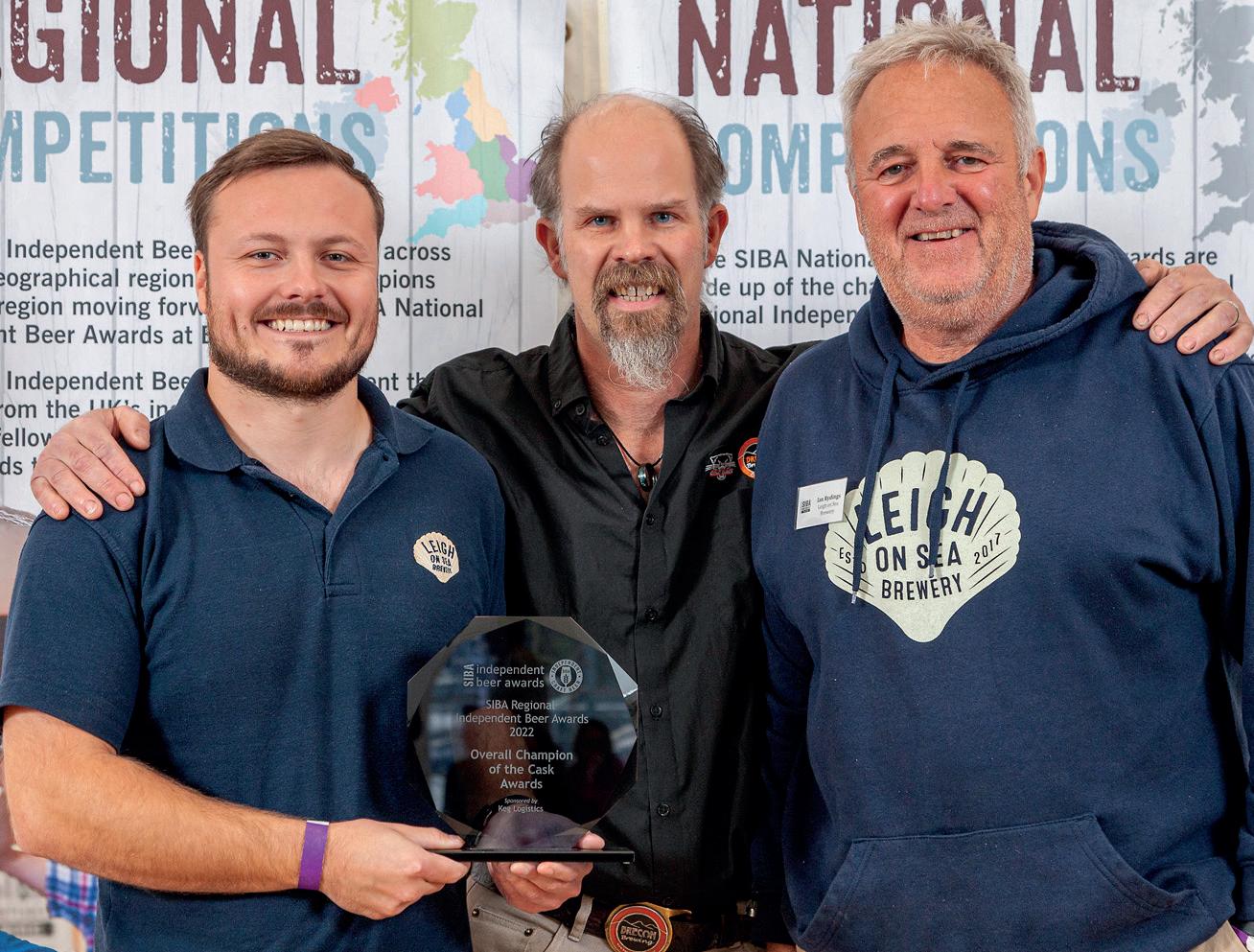
Sponsored by: Keg Logistics
Presented to: Ian Rydings
Presented by: Buster Grant
G GOLD: Leigh on Sea Brewery SS9 9.0%
S SILVER: Brentwood Brewing Company TA Elephant School Brewing Co My Milk Stout Brings All The Boys To The Yard 4.5%
B BRONZE: Green Jack Red herring 5.0%
Regional Beer Competitions East
Cask Session Dark Beer (up to 4.4%)
G GOLD: The Norfolk BrewhouseMoon Gazer Nibbler 4.0%
S SILVER: Milton Brewery Minotaur 3.3%
S SILVER: Billericay Brewing Company Woody's Bark 4.3%
B BRONZE: Lacons Brewery Norfolk Gem 3.6%
B BRONZE: Tring Brewery Moongazing 4.2%
Cask British Dark Beer (4.5 to 6.4%)
G GOLD: Brentwood Brewing Company TA Elephant School Brewing Co My Milk Stout Brings All The Boys To The Yard 4.5%
S SILVER: Wibblers Brewery Crafty Stoat 5.3%
S SILVER: The Norfolk BrewhouseMoon Gazer Bouchart 4.9%
S SILVER: Tring Brewery Colley's Dog 5.2%
B BRONZE: Bowlers Brewery Ltd Brown Derby 4.8%
B BRONZE: Milton Brewery Nero 5.0%
B BRONZE: Green Jack Lurcher 4.8%
B BRONZE: 8 Sail Brewery Victorian Porter 5.0%
B BRONZE: Grain Brewery Slate 6.0%
B BRONZE: Lincolnshire Craft Beers Ltd Bomber County 4.8%
Cask British Bitter (up to 4.4%)
G GOLD - BEST IN CATEGORY: Grain Brewery Best Bitter 4.2%
G GOLD: 8 Sail Brewery Windmill Bitter 3.8%
G GOLD: Barsham Brewery Norfolk Topper 3.8%
S SILVER: Mauldons Mole Trap 3.8%
B BRONZE: Hadham Brewing Co Ltd Gold 3.7%
B BRONZE: Milton Brewery Pegasus 4.1%
B BRONZE: Green Jack Nightingale 4.0%
B BRONZE: Wibblers Brewery Apprentice 3.9%
B BRONZE: Mile Tree Brewery Limited Rolling Mile 3.9%
B BRONZE: Tring Brewery Sidepocket for a Toad 3.6%
Cask British Best Bitter (4.5 to 6.4%)
Sponsored by: Charles Faram
G GOLD: Brentwood Brewing Company Lumberjack 5.2%
S SILVER: Billericay Brewing Company Rhythm Stick 4.8%
S SILVER: Farr Brew Lock In 4.5%
S SILVER: Green Jack Trawlerboys 4.6%
S SILVER: Bowlers Brewery Ltd Sundance 4.5%
S SILVER: Mauldons Suffolk Pride 4.8%
B BRONZE: Baker's Dozen Brewing Co. Straight Outta Ketton 4.5%
Cask Session Pale
(up to 4.4%)
Sponsored by: EKegPlus
B BRONZE: Tring Brewery Citra 3.9%
B BRONZE: Brentwood Brewing Company Galaxy 4.4%
B BRONZE: Ferry Ales Brewery Push the Envelope 4.1%
B BRONZE: Hadham Brewing Co Ltd Dragonfly 4.2%
B BRONZE: Nethergate Brewery Venture 3.7%
B BRONZE: Green Jack Golden best 3.8%
Cask Pale Ale (4.4 to 5.4%)
G GOLD: Grain Brewery OPA 4.5%
S SILVER: Ferry Ales Brewery Magic 5.2%
S SILVER: Mauldons Suffolk Punch 4.5%
B BRONZE: Nethergate Brewery Growling Dog - Big Sesh IPA 4.5%
B BRONZE: Farr Brew Farr Apart 4.8%
B BRONZE: Milton Brewery Minerva 4.6%
B BRONZE: Billericay Brewing Company Sex&Drugs&Rock&Roll 5.0%
B BRONZE: The Norfolk BrewhouseMoon Gazer White Face 5.0%
B BRONZE: 8 Sail Brewery Old Colony 5.3%
B BRONZE: Brentwood Brewing Company Falcon Punch 5.1%
Ale
G GOLD - BEST IN CATEGORY:
8 Sail Brewery Froglet 4.0%
G GOLD: Leigh on Sea Brewery Legra Pale 3.8%
G GOLD: Mauldons Silver Adder 4.2%
S SILVER: Adnams Mosaic 4.1%
S SILVER: Oakham Ales Citra 4.2%
S SILVER: Tydd Steam Brewery Ltd Golden Kiwi 4.1%
Cask IPA (5.6% and over)
Sponsored by: Charles Faram
G GOLD: Oakham Ales Green Devil IPA 6.0%
S SILVER: Leigh on Sea Brewery Cockle Row Spit 5.6%
B BRONZE: Grain Brewery Lignum Vitae 6.5%
B BRONZE: Baker's Dozen Brewing Co. Martes Trece 5.8%
B BRONZE: Green Jack Mahseer 5.8%
72 Winter 2022 | SIBA Independent Brewer | www.siba.co.uk SIBA East competition winners 2022
Overall Champion of the Keg Beer Competition
Presented to: Dean & Jill Baker, Bakers Dozen
Presented by: Jack Mortimer, Nichesolutions
G GOLD: Baker's Dozen Brewing Co. Undertow 4.8%
S SILVER: Grain Brewery Ltd Slate 6.0%
B BRONZE: Leigh on Sea Brewery Two Tree Island 4.5%
SIBA East competition winners 2022
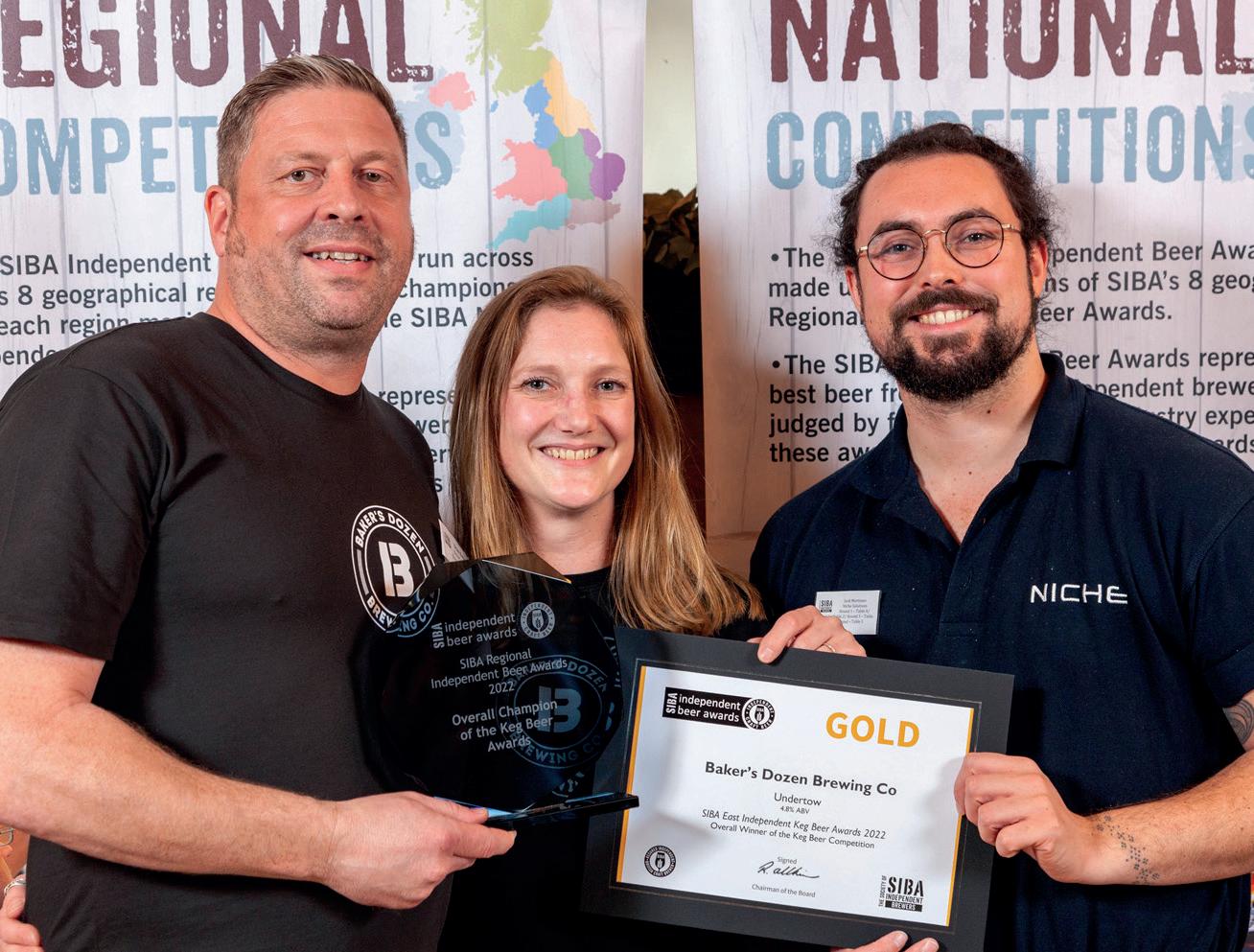
Cask Speciality Light Beer
G GOLD: Grain Brewery Weizen 5.0%
B BRONZE: Nethergate Brewery Umbel Ale 3.8%
Cask Speciality Amber to Dark Beer
G GOLD - BEST IN CATEGORY:
Green Jack Red Herring 5.0%
G GOLD: Billericay Brewing Company
Billericay Barista 5.9%
G GOLD: Nethergate Brewer Umbel Magna 5.0%
G GOLD: Oakham Ales Black Magic 5.0%
B BRONZE: Elgood & Sons Ltd Plum Porter 4.5%
Cask Imperial & Strong Beer (6.5%
and over)
G GOLD: Leigh on Sea Brewery SS9 9.0%
S SILVER: Green Jack Ripper 8.5%
Keg Lager
G GOLD: Ferry Ales Brewery
Lincoln Lager 4.3%
S SILVER: Grain Brewery Ltd Pilsener 4.0%
S SILVER: Leigh on Sea Brewery
Love Leigh Lager 4.5%
B BRONZE: Brewster's Brewing Co Ltd
Helles Lager 4.0%
B BRONZE: Norfolk Brewhouse Moon Gazer Ale Dewhopper 4.0%
Keg Wheat Beer
G GOLD: Adnams Bierre Blanche 5.0%
S SILVER: Grain Brewery Ltd Weizen 5.0%
B BRONZE: Duration Quiet Song 4.3%
Keg Bitter
Sponsored by: Charles Faram
S SILVER: Adnams Ghost Ship 4.5%
Keg Pale Ale
G GOLD - BEST IN CATEGORY: Baker's Dozen Brewing Co. Undertow 4.8%
G GOLD: Briarbank Brewing Company Suffolk Haze 5.0%
S SILVER: Duration Turtles All The Way Down 5.5%
B BRONZE: Barsham Brewery StackYard Hazy IPA 5.0%
Keg IPA
G GOLD: Six Hills Brewing Free Wheeling Man 6.2%
S SILVER: Baker's Dozen Brewing Co. 12 Second Panda 6.0%
S SILVER: Briarbank Brewing Company Hop To It 6.2%
B BRONZE: Brewster's Brewing Co Ltd Virago IPA 5.8%
Keg Speciality IPA
B BRONZE: Adnams Innovation 6.7%
Keg Amber, Brown & Red Ale
G GOLD: Leigh on Sea Brewery Two Tree Island 4.5%
Keg Stout & Porter
G GOLD: Grain Brewery Ltd Slate 6.0%
S SILVER: Mauldons Brewery Black Adder 4.5%
B BRONZE: Brentwood Brewing Company - Elephant School My Milk Stout Brings All The Boys To The Yard 4.5%
B BRONZE: Brewhouse & Kitchen Bedford Chief Goober 5.4%
Keg Imperial & Strong Ale
S SILVER: Milton Marcus Aurelius 7.5%
Keg Speciality & Flavoured Beer
G GOLD: Norfolk Brewhouse Moon Gazer Ale Moon Gazer Triskele 4.5%
73 www.siba.co.uk | SIBA Independent Brewer | Winter 2022
SIBA North West competition winners 2022
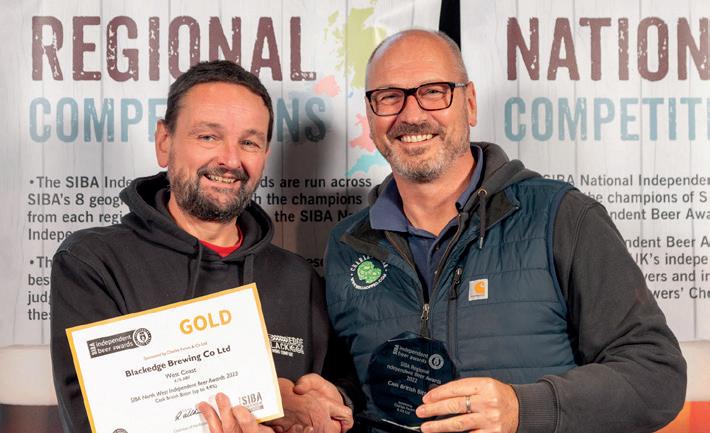
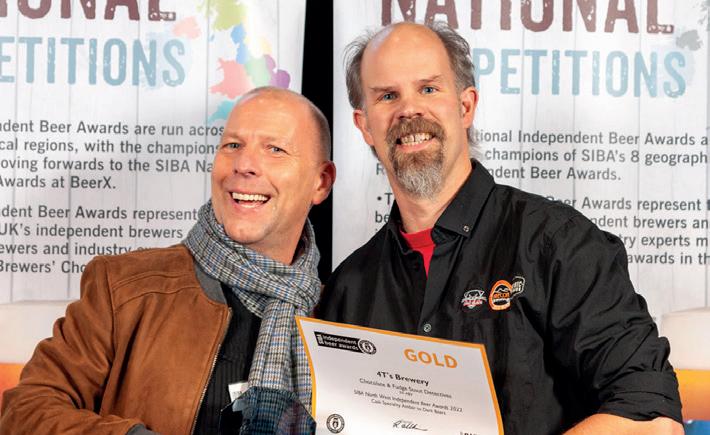
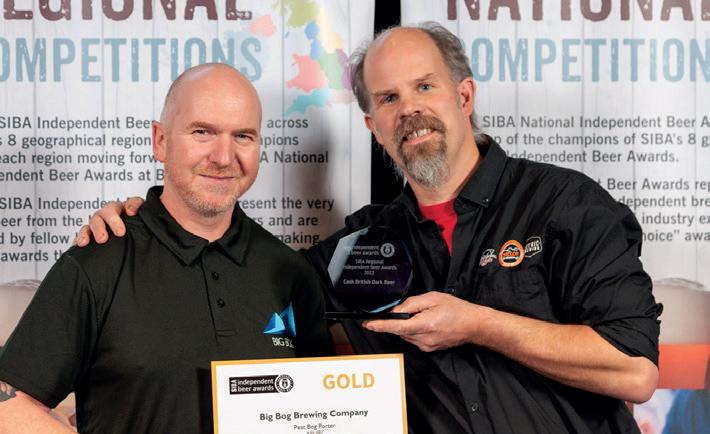
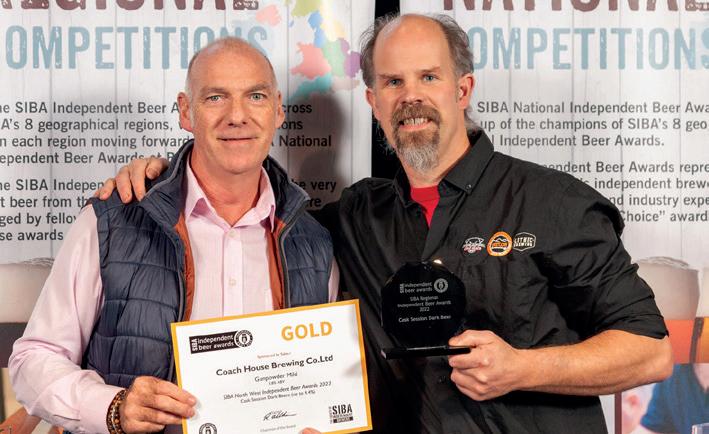
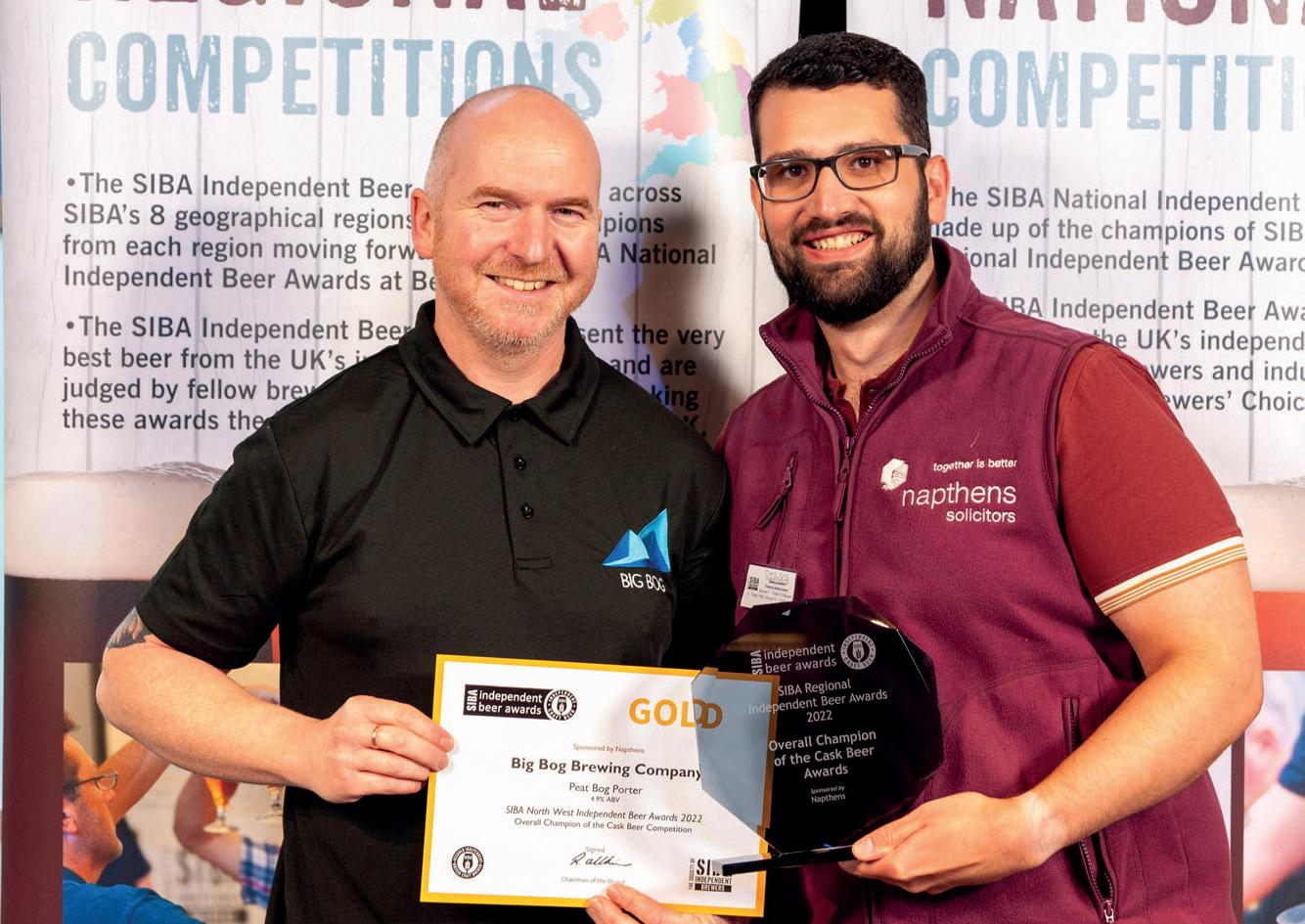
Regional Beer Competitions North West
Overall Champion of the Cask Beer Competition
Sponsored by: Napthens
Presented
Presented by: Napthens
S Hophurst Brewery Ltd APA 5.2%
B Coach House Brewing Co.Ltd Gunpowder Mild 3.8%
Cask Speciality Amber to Dark Beers
G GOLD: 4T's Brewery
Chocolate & Fudge Stout Detectives 5.0%
S SILVER: Blackedge Brewing Co Ltd
Ported 7.5%
S SILVER: Hophurst Brewery Ltd
Irish Cream Porteresque 5.5%
B BRONZE: Spitting Feathers
Honey Trap 4.1%
B BRONZE: Great Corby Brewhouse Coffee Milk Stout 4.4%
Cask Session Dark Beers (up to 4.4%)
Sponsored by: Sales-i
G GOLD - BEST IN CATEGORY:
Coach House Brewing Co.Ltd Gunpowder Mild 3.8%
G GOLD: Hopstar Brewery
SMOKEY JOES BLACK BEER 3.9%
G GOLD: Big Bog Brewing Company Stog 4.1%
S SILVER: Hophurst Brewery Ltd
Campfire 3.9%
B BRONZE: Hydes Brewery Ltd Dark Ruby 3.5%
B BRONZE: Odin's Manx Beer Manx Mild 3.4%
B BRONZE: Bank Top Brewery Limited Dark Mild 4.0%
Gold award presented to Rick Midgley by Buster Grant
Cask British Dark Beers (4.5 to 6.4%)
G GOLD: Big Bog Brewing Company
Peat Bog Porter 4.9%
S SILVER: Hophurst Brewery Ltd Porteresque 5.5%
B BRONZE: Blackedge Brewing Co Ltd Oatmeal Stout 6.4%
B BRONZE: Neptune Brewery Abyss 5.0%
B BRONZE: Spitting Feathers NightShift 4.5%
Cask British Bitter (up to 4.4%)
Sponsored by: Charles Faram & Co Ltd
G GOLD - BEST IN CATEGORY: Blackedge Brewing Co Ltd West Coast 4.1%
G GOLD: Joseph Holt Bitter 4.0%
G GOLD: Cains Finest Bitter 4.0%
S SILVER: Lancaster Brewery CHINOOK 4.2%
S SILVER: Odin's Manx Beer
Rhumsaa Bitter 3.7%
B BRONZE: Big Bog Brewing Company
Jack O Lantern 4.2%
B BRONZE: Bank Top Brewery Limited Flat Cap 4.0%
B BRONZE: Red Rose Brewery Too Wet To Woo 3.8%
74 Winter 2022 | SIBA Independent Brewer | www.siba.co.uk
G Big Bog Brewing Company Peat Bog Porter 4.9%
Gold award presented to Martin Bailey by Buster Grant
Gold award presented to Jordan by Buster Grant
Gold award presented to Mark Dickman by Paul Corbett
to: Rick Midgley
Cask Session Pale Ale (up to
4.4%)
G GOLD - BEST IN CATEGORY:
Moorhouse's Moonbeam 4.3%
G GOLD: Hawkshead Brewery Windermere Pale 3.5%
G GOLD: Weetwood Ales Oregon Pale 4.3%
G GOLD: Lakes Brew Co Pale Ale 3.5%
G GOLD: RedWillow Brewery Weightless 4.2%
G GOLD: Chapter Brewing Taller Than A House 3.9%
S SILVER: BRIMSTAGE BREWERY SANDPIPER 3.6%
S SILVER: Cumbrian Ales Life of a Mountain 3.8%
S SILVER: Big Bog Brewing Company Hinkypunk 4.1%
S SILVER: Hophurst Brewery Ltd C osmati 4.2%
S SILVER: Lancaster Brewery IPA 4.2%
S SILVER: Neptune Brewery Sea of Dreams 4.2%
S SILVER: Hesket Newmarket Brewery Scafell Blonde 4.3%
B BRONZE: Great Corby Brewhouse Signal Peak APA 4.4%
B BRONZE: Bollington Brewing Company Long Hop 3.9%
B BRONZE: Hydes Brewery Ltd Hopster Blonde 3.8%
Cask British Best Bitter (4.5 to 6.4%)
Sponsored by: Rankin Brothers & Sons
S SILVER: Blackedge Brewing Co Ltd Blonde 4.5%
S SILVER: Lancaster Brewery Red 4.8%
B BRONZE: Bank Top Brewery Limited
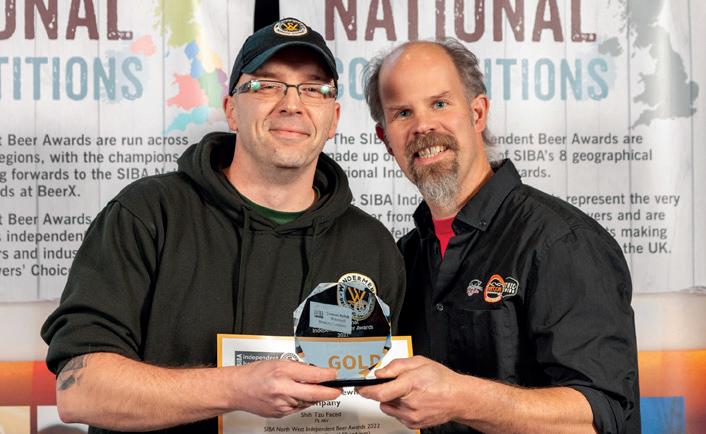
Pavilion Pale Ale 4.5%
B BRONZE: Weetwood Ales Old Dog 4.5%
B BRONZE: Spitting Feathers
Little Donker 6.0%
B BRONZE: Big Bog Brewing Company Quagmire 6.0%
Cask Pale Ale
G GOLD - BEST IN CATEGORY:
Hophurst Brewery Ltd APA 5.2%
G GOLD: Chapter Brewing Kandata 4.7%
G GOLD: Bank Top Brewery Limited Palomino Rising 5.0%
G GOLD: Hydes Brewery Ltd Lowry 4.7%
G GOLD: Coach House Brewing Co. Ltd Post Horn Premium Ale 5.0%
S SILVER: Blackedge Brewing Co Ltd Kiwi 5.0%
S SILVER: Spitting Feathers Rush Hour 4.5%
B BRONZE: Hesket Newmarket Brewery Peak Bagger IPA 4.7%
B BRONZE: Big Bog Brewing Company Strawberry Fields - Kaleidoscope 5.2%
B BRONZE: Cumbrian Ales Session IPA 4.5%
B BRONZE: Bowness Bay Brewing Fell Runner 4.6%
B BRONZE: Weetwood Ales Jester IPA 4.8%
B BRONZE: Peerless Brewing Knee-Buckler IPA 5.2%
B BRONZE: Brewhouse and Kitchen Chester Golden Boy 5.0%
Cask IPA (5.6% and over)
Sponsored by: Charles Faram & Co Ltd
S SILVER: Blackedge Brewing Co Ltd India 5.8%
S SILVER: Hophurst Brewery Ltd Milkshake IPA 6.0%
S SILVER: Bowness Bay Brewing Steamer IPA 5.7%
B BRONZE: Bollington Brewing Company Eastern Nights 5.6%
B BRONZE: Spitting Feathers Repetitive Strain Injury 5.6%
Cask Speciality Light Beer
G GOLD: Bowland Brewery


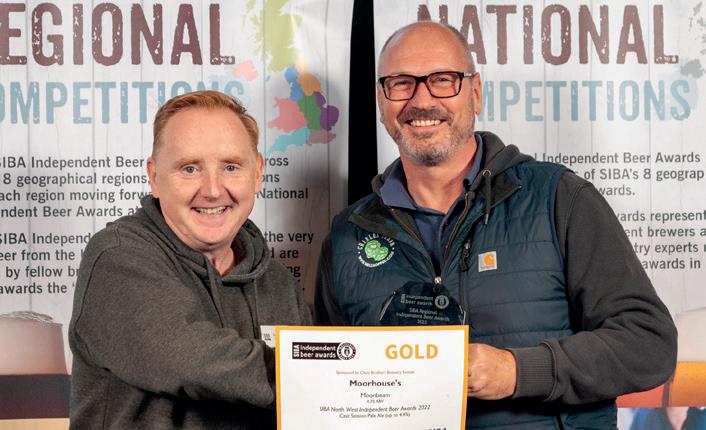
Bowland Bumble 4.0%
S SILVER: Big Bog Brewing Company Padi 3.7%
S SILVER: Hophurst Brewery Ltd Citra & Mosaic Milkshake IPA 4.5%
B BRONZE: 4T's Brewery Mango Fever 4.6%
B BRONZE: Blackedge Brewing Co Ltd Shake 4.6%
Cask Imperial & Strong Beer (6.5% and over)
G GOLD - BEST IN CATEGORY: Windermere Brewing Company Shih Tzu Faced 7.0%
G GOLD: Hophurst Brewery Ltd Imperial Porteresque 9.0%
S SILVER: Hawkshead Brewery Export Porter 8.5%
S SILVER: Bank Top Brewery Limited Herkules White Walker 6.5%
S SILVER: Blackedge Brewing Co Ltd Imperial 6.9%
75 www.siba.co.uk | SIBA Independent Brewer | Winter 2022 SIBA North West competition winners 2022
Sponsored by: Close Brothers Brewery Rentals
Gold award presented to Lee Williams by Paul Corbett
Sponsored by: Bulk Storage and Process Systems Ltd
Gold award presented to Stuart Hurst by Bill Egerton
Sponsored by: Sales-i
Gold award presented to Tomasz Rybak by Buster Grant
Gold award presented to Bowland Brewery by Buster Grant
Software for Breweries
Premier's cloud-based software, BrewMan, is designed to optimise every brewery process to increase productivity and grow your business.

CRM
Manage customer communication, assign sales team tasks and enter orders on the road.



Stock Control
View accurate stock levels from anywhere, complete stock takes and see forecasts of stock required for upcoming production.


Manage production processes, raw materials, fluid movements and ensure end-to-end traceability.



Distribution
Plan optimised delivery routes, record deliveries, collect cash and capture customer signatures.






Production Container Tracking Duty Calculation
Simple and effective system, allowing you to know exactly where your casks are and what's in them.
Track all duty payable or suspended transactions, record spoilt beer and audit a monthly return.



76 Winter 2022 | SIBA Independent Brewer | www.siba.co.uk
Gold members
Now with even more integrations to reach all areas of your business
BrewMan has helped free up time spent on administration to allow us to focus more on production and sales. The setup was very straightforward and having the demo brewery data to play around with helped in figuring out anything that I didn’t understand at first. The support from the BrewMan team has been first class.



Ken Lynch| Co-Founder| Serious Brewing Company
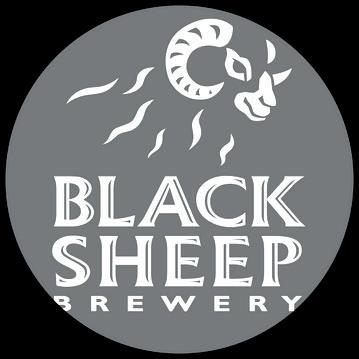


£50

Per concurrent user, per month
Full access to features Unlimited user profiles* No fixed term contract

*Unlimited users can have their own login credentials for the system, however, the number of users who can access the system at one time depends on the number of concurrent user subscriptions bought.

77 www.siba.co.uk | SIBA Independent Brewer | Winter 2022 For a free trial visit brewman.premiersystems.com/signup Get in touch 02380 811 100 sales@premiersystems.com Unit 2 Azera, Capstan Road, Woolston, Southampton, S0199UR
Gold members
The best hops

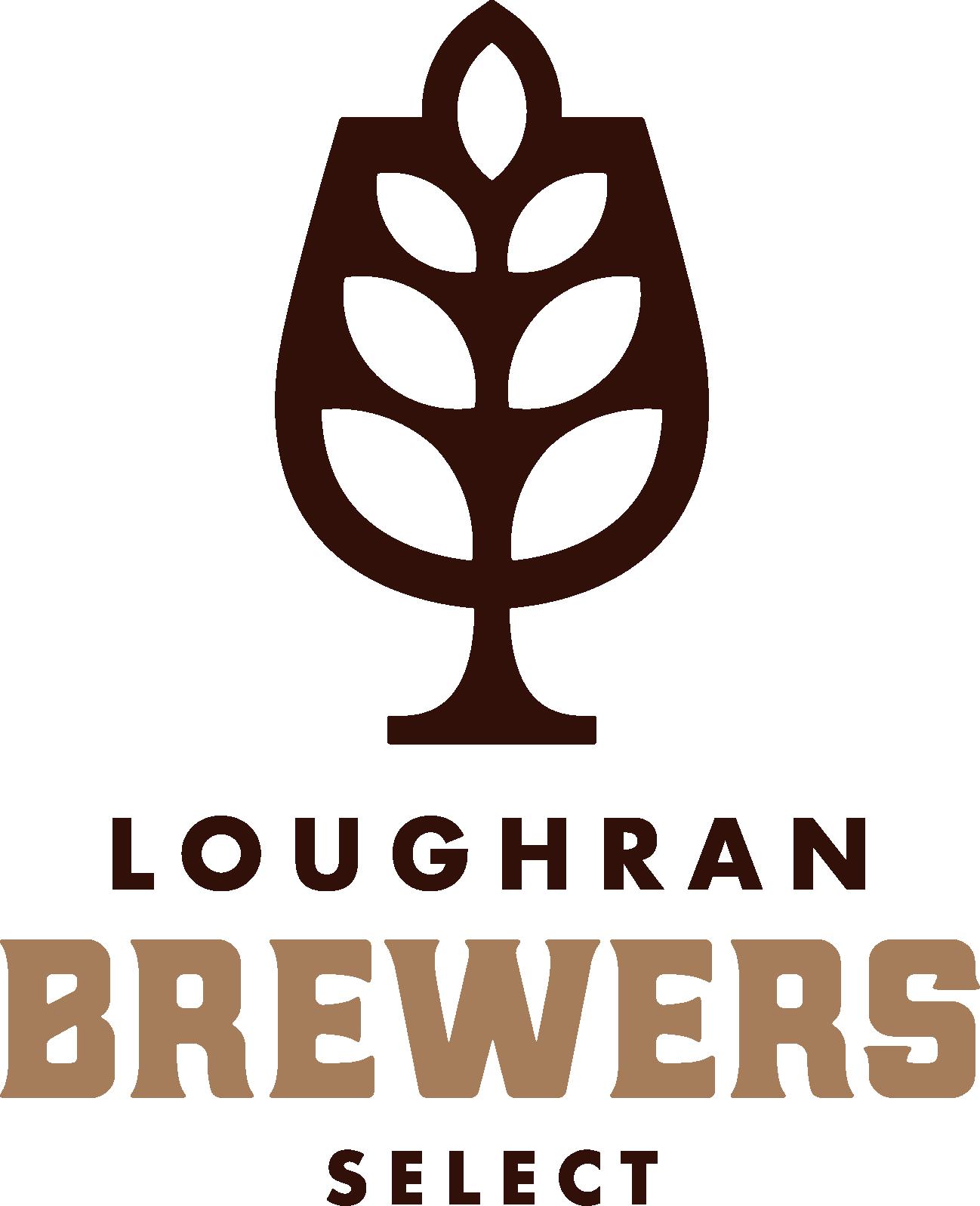
 Gold members
Gold members
from the world’s best producers.





 Gold members
Gold members
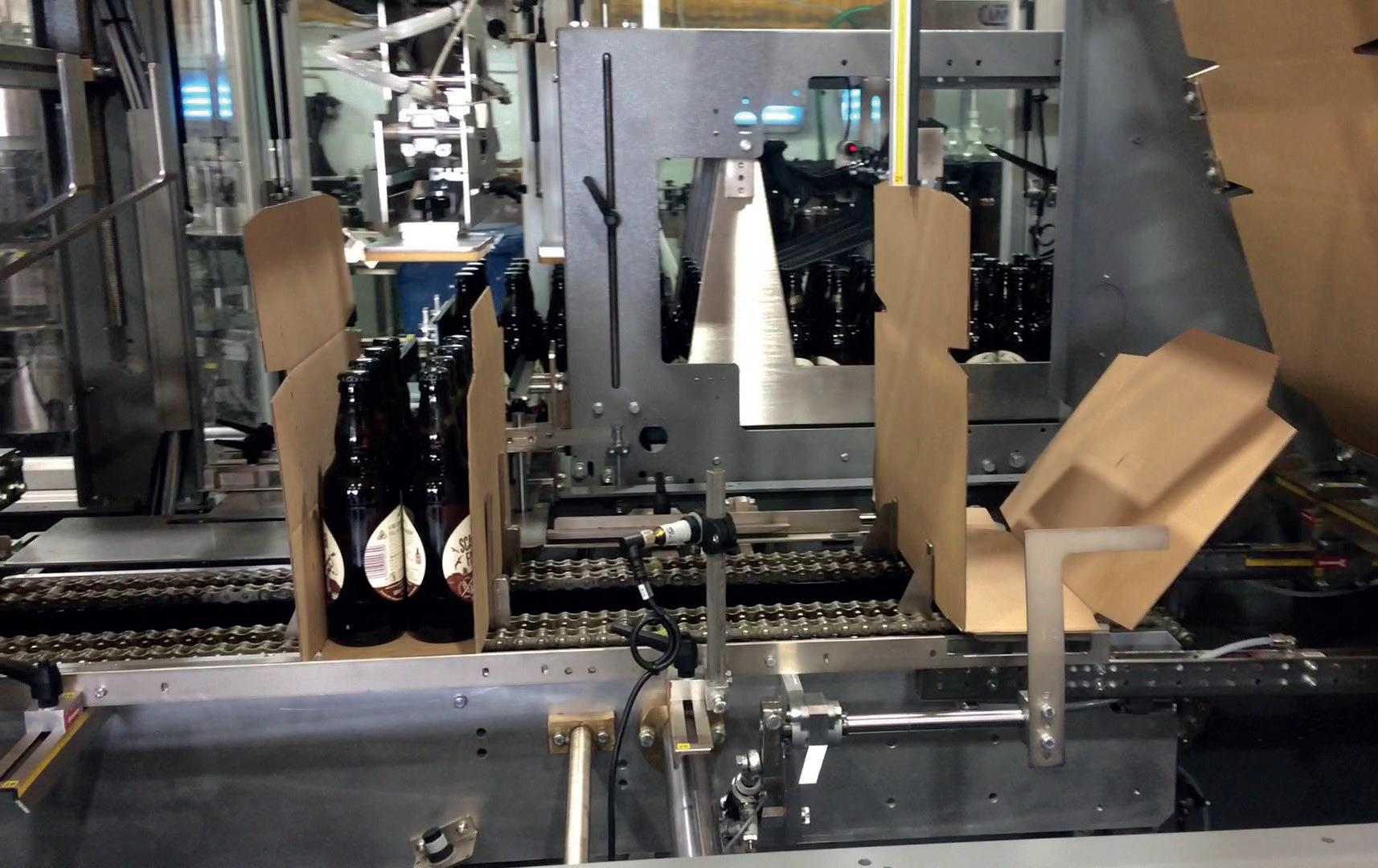
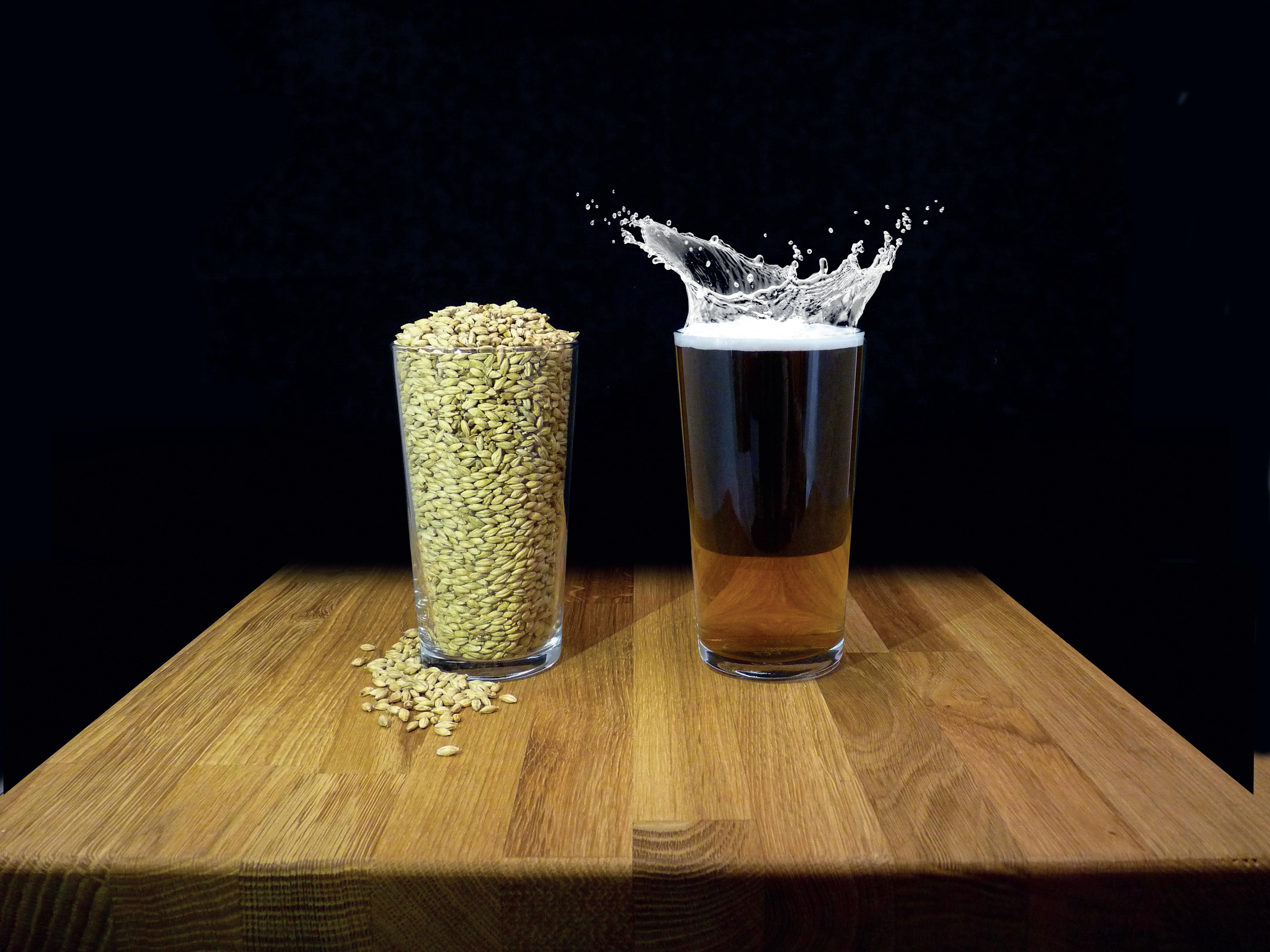





80 Winter 2022 | SIBA Independent Brewer | www.siba.co.uk Full wrap around case Shelf ready case Fridge pack Multi-pack Tray & shrink film Low to high speed AUTOMATIC PACKING & WRAPPING SOLUTIONS FOR THE BREWING INDUSTRY SOLUTION BENEFITS Proven technology –already installed in UK Breweries Improve efficiency –increase output & redirect labour Environmental –option to switch to carton board Bespoke solutions –to meet individual objectives Modification –improve existing process Support –UK based Atlanta engineers atlantapackaging.co.uk WARMINSTER MALTINGS LTD Traditional Maltsters www.warminster-malt.co.uk | robin.appel@warminster-malt.co.uk 39 Pound Street, Warminster, Wiltshire. BA12 8NN | Tel: 01985 212014 ® ®
Long Man Brewery claims six awards at the World Beer Awards 2022
Long Man Brewery, based in Litlington, East Sussex, has won six major honours at this year’s World Beer Awards, including the ‘World’s Best Beer’ for its Old Man premium bitter for the second time.
Three beers from the Long Man range have won a combined six awards in the Taste category, which featured over 500 of the finest beers and ales from across the globe.
The Old Man premium bitter (4.3% ABV) won World’s Best Dark Mild Beer 2022, and was Gold Winner (UK) and Country Winner (UK), Dark Beer. The Long Blonde ale (4.1% - 3.8% ABV) won was a Gold Winner (UK) and Country Winner (UK), English Style Pale Ale.
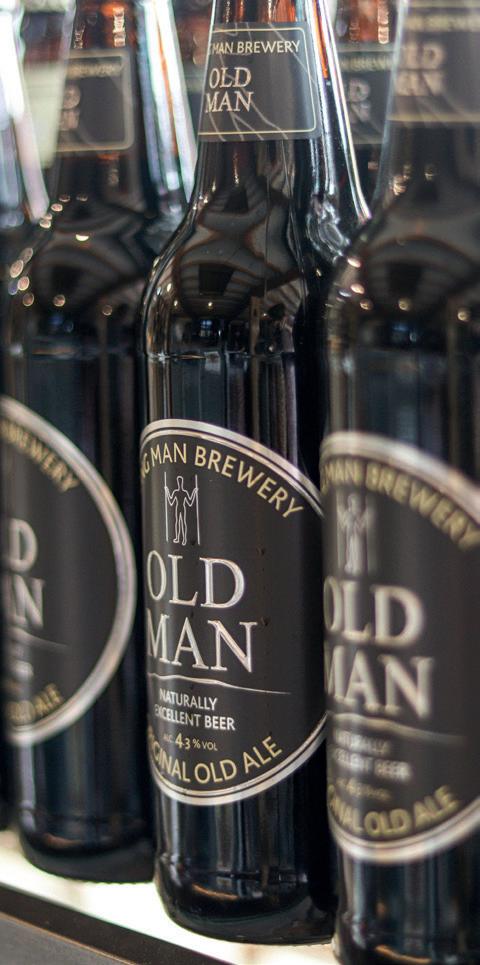
While the Long Man Helles Lager (4.6% ABV) was a Bronze Winner (UK), Lager Helles/Münchner.
The World Beer Awards, which returned this year following a two-year pause due to the pandemic, was judged by a leading panel of industry experts. There were several stages of blind tasting before the judges crowned the winning beers.
Duncan Ellis, Co-Founder of Long Man Brewery, said: “I’m absolutely thrilled that our Old Man premium bitter has been crowned the World’s Best Beer for a second time. Achieving six awards at this year’s World Beer Awards is an incredible feat, and I’m immensely proud. These accolades are the well-earned recognition our brewers deserve for all the hard work and attention to detail they put into crafting our naturally excellent beer.”
Adrian Tierney-Jones, Chair of the World Beer Awards, said, “Once again, the winners in the World Beer Awards show an exciting snapshot of some of the best beers being brewed across the globe today. Naturally, I would like to congratulate the winners, but I would also like to thank the many judges who have applied themselves to their tasks with diligence and great professionalism.”
This latest batch of awards takes Long Man Brewery’s total to almost 50 since it started brewing from its converted flint barn in the heart of the South Downs National Park in 2012.
To find out more visit www.longmanbrewery.com
Salcombe Brewery Co launches new chocolate stout
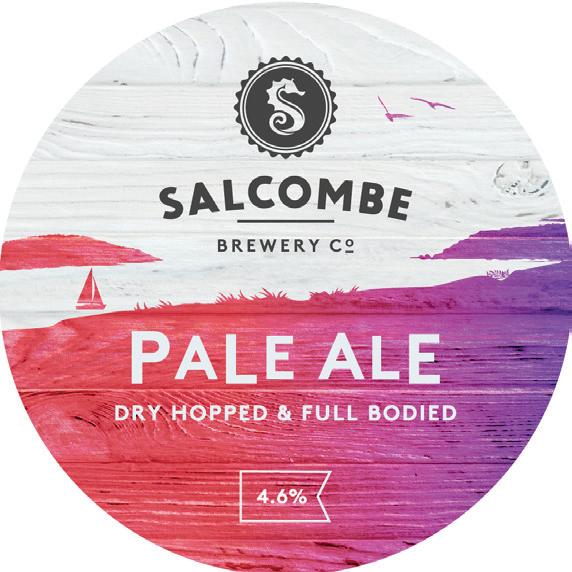
Salcombe Brewery has launched Maya (4.5% ABV), a brand new chocolate stout.
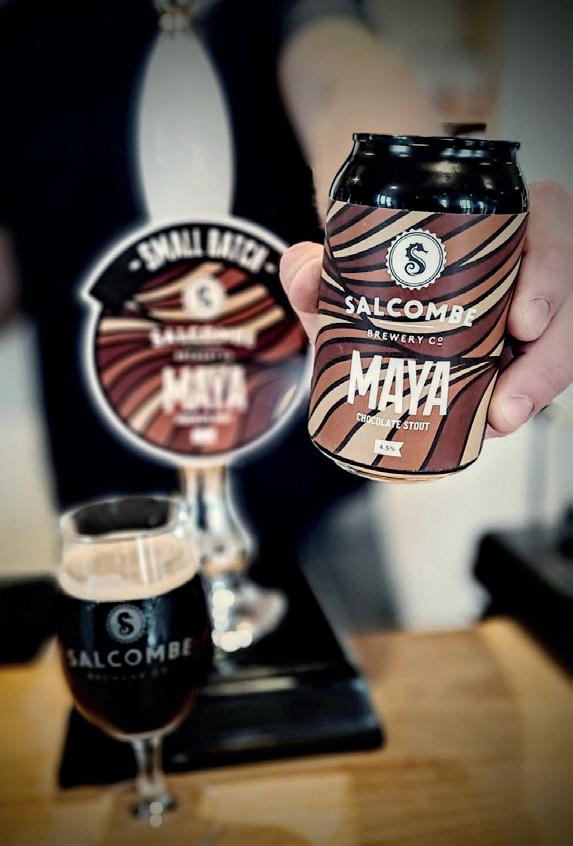
The stout is available both on tap in pubs and in 330ml cans from retail outlets including the brewery shop and website.
Head Brewer Sam Beaman said: “We are very excited about this latest addition to our small batch range. For the ancient Maya people, the cacao bean was sacred. They were obsessed with its rich, chocolate taste and believed it was a gift from the gods. This was our inspiration for our new stout which we have infused with organic cacao nibs to
add depth and complexity.”
Maya was created by adding cacao nibs during the brewing process. The caramel and coffee notes from the malt blend perfectly with the rich chocolate flavour from the cacao nibs, resulting in a smooth chocolate stout. It is a dark, warming beer ideal for these colder autumn nights. It pairs well with braised or spiced meats and rich autumnal stews, but is equally enjoyable on its own. Find out more at www.salcombebrewery.com
Salcombe Brewery Co announces new listings with St Austell and Heavitree
Salcombe Brewery is delighted to announce that its kegged Pale Ale has been listed with the Heavitree Brewery estate and St Austell Brewery’s freetrade accounts. In addition, it has secured regional slots for its cask range with St Austell.
Jordan Mace, Salcombe Brewery’s Managing Director, said: “This year we have seen fantastic growth with another huge summer season. Securing these new listings is the icing on the cake, giving us the chance to work with big names in the industry and increase our presence in pubs across the South West. We have worked hard as a team to deliver award-winning, high quality products that appeal to pub-goers and these new listings are testament to that hard work.”
Joe Dixon, Key Account Manager for Salcombe Brewery Co, added: “We have a very close relationship with Heavitree Brewery, who have been stocking our cask ale since 2015. It is fantastic that our work with them has now led to our first keg listing in their estate and with St Austell Brewery’s freetrade accounts.”
81 www.siba.co.uk | SIBA Independent Brewer | Winter 2022 Brewery news


82 Winter 2022 | SIBA Independent Brewer | www.siba.co.uk www.atlaspackaging.co.uk sales@atlaspackaging.co.uk 01271 344055 We produce a whole range of printed or plain, brewery essentials; Bottle Packs, Shelf Ready Packaging, Outer Cases with Dividers, Bag in Box Packaging, bespoke Gift Packs and Plastic Free Alternatives! Atlas Packaging Ltd. is one of the UK’s leading innovative cardboard packaging companies, manufacturing recyclable packaging perfect for brewers! Est. 198 3 Cardboard Packaging perfect for Breweries RELIABLE CLOSURES THAT HELP SEAL, PROTECT AND ADD VALUE TO BRANDS Quality Stoppers and Closures Since 1774 +44 (0)1844 203100 sales@rankincork.co.uk rankincork.co.uk CLIP CORKS KEYSTONES SHIVES TAPS SPILES
Hepworth's opens new taproom at Pulborough brewery
Hepworth & Company has opened a new taproom at its state-of-the-art brewery in Pulborough for visitors to enjoy its full range of award-winning beers alongside street food and regular live entertainment.
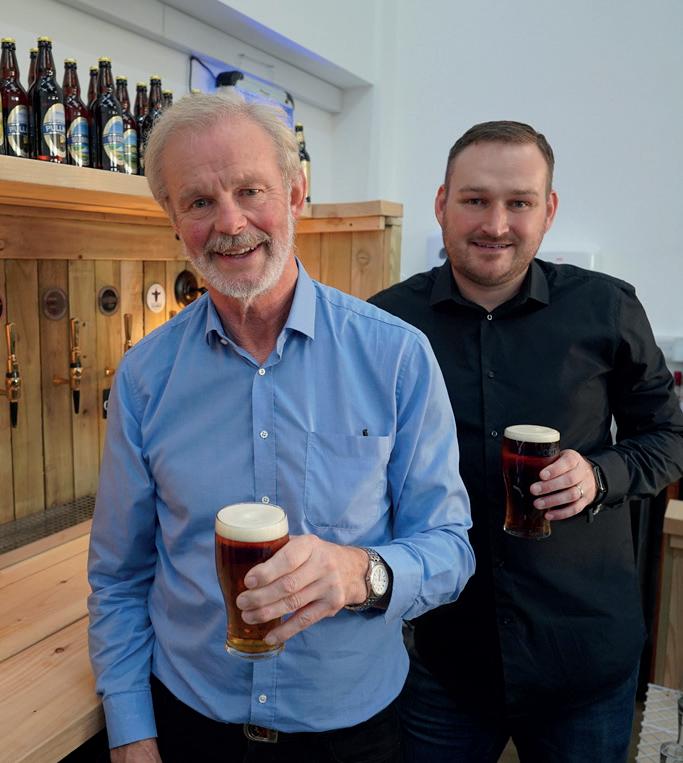
The taproom will be open Monday to Wednesday 10.00am-5.30pm and Thursday to Saturday 10.00am-8.00pm serving snacks, coffees and Hepworth’s award-winning beers including low alcohol brews. Hot food will be provided Thursday and Friday nights by a roster of ‘pop ups' with a focus on quality, and local ingredients, such as Rudgwick-based Italy on Wheels.
Bands are being lined up to play on Friday nights, with a focus on local performers.
Brewery founder and chairman Andy Hepworth said: "We're delighted to have a taproom where we can serve a pint and a bite to our guests. We expect it to evolve into a versatile space: a café bar serving coffees - or one of our alcoholfree beers - to morning visitors, through to a buzzing live music venue on Friday evenings.”
At the same time, Hepworth's has also launched
a competition for students from the Chichester College Group challenging them to create a ‘next generation' taproom and brewery shop, to open within the next 12 months.
Andy Hepworth added: "We're also excited about the design plans, which will take the taproom and shop up to the next level. It's great to be working with the Chichester College Group and helping to nurture creativity and design in young people at the start of their career. We can't wait to see their ideas and work with the winner on turning them into a reality."
The launch of the taproom is the latest in an ongoing programme of investment by Hepworth's at the purpose-built brewery, which they opened in 2016. Earlier this summer they installed a new canning line, which is now operational and producing 3,000 cans per hour, currently Hepworth's Charger and Crazy Horse beers, though they will also be providing canning for other brewers.
Hepworth's is continuously working on new environmental measures, with a CO2 reclaim project set to be installed this winter. Already one of the most sustainable breweries in the
UK, Hepworth's aims to reach 85% carbon neutral by 2025.
Find out more at www.hepworthbrewery.co.uk
Rooster’s cock-a-hoop after launching IPA in Swedish stores
Harrogate-based brewery, Rooster’s Brewing Co, has secured a contract with Sweden’s Systembolaget which has seen the launch of Strength In Numbers, the brewery’s West Coast IPA, into the government-owned chain of stores.

Strength In Numbers successfully passed various stages of selection, including a final round of blind tasting to secure a limited release of the beer. Working closely with Great Brands, Rooster’s import and distribution partner in Sweden, 32,000 440ml cans of the 7% IPA was shipped to Stockholm ahead of its launch on September 23rd.
The beer was also pouring alongside a number of Rooster’s other beers in partnership with Great Brands at the 2022 Stockholm Beer &
Whisky Festival in September. A Rooster’s tap takeover took place following the opening session of the festival at The Oliver Twist, one of Stockholm’s leading craft beer bars.
Tom Fozard, Rooster’s Commercial Director, said: “I’m delighted that we’ve been able to secure a listing with Systembolaget for Strength In Numbers and doubly so that we’ve been able to achieve it by forming the working relationship we have with Great Brands over the past couple of years. I’d also like to give a shout out to Andreas, Rooster’s Export Consultant, who’s come in and helped Rooster’s to achieve a long-held ambition for the business. Cheers!” Find out more at www.roosters.co.uk
Bluestone Brewing Company releases Masta Blasta
Bluestone Brewing Company has released the next beer in its 2022 can range. Masta Blasta is a heavily-hopped, soft and juicy Double IPA with a label inspired by Stevie Wonder and Keith Haring.

Emily Hutchinson, Bluestone’s Marketing Manager, said: "Our designer, Nathan, is a creative guru! He's always coming up with new ideas and interesting concepts for new beer releases. There is a backstory to each and every beer that we've made so far."
Nathan explains: "The idea is taking the Celtic word for strong flavour, ‘Blasta’, and sticking Masta in front of it, because it made me think of Stevie Wonder’s Masterblaster - which got me thinking of New York and ghetto blasters…and then onto Keith Haring whose style is not dissimilar to our patterns. I’ve had his style in mind for a while and this seemed the perfect beer to do it on."
Find out more at www.bluestonebrewing.co.uk
83
| SIBA Independent Brewer | Winter 2022 Brewery news
www.siba.co.uk
Andy Hepworth, founder and Chairman of Hepworth & Company with Tap Room & Events Manager Matt Tobin
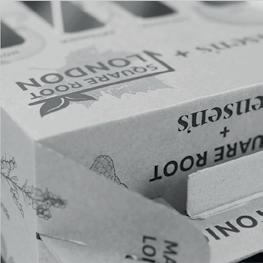
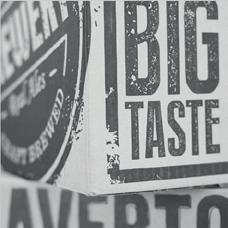

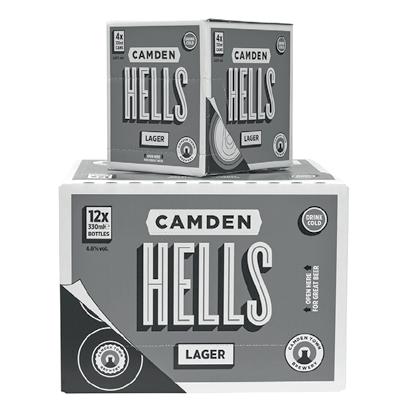
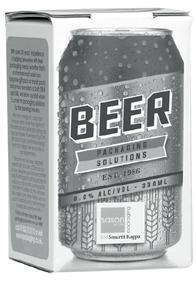





























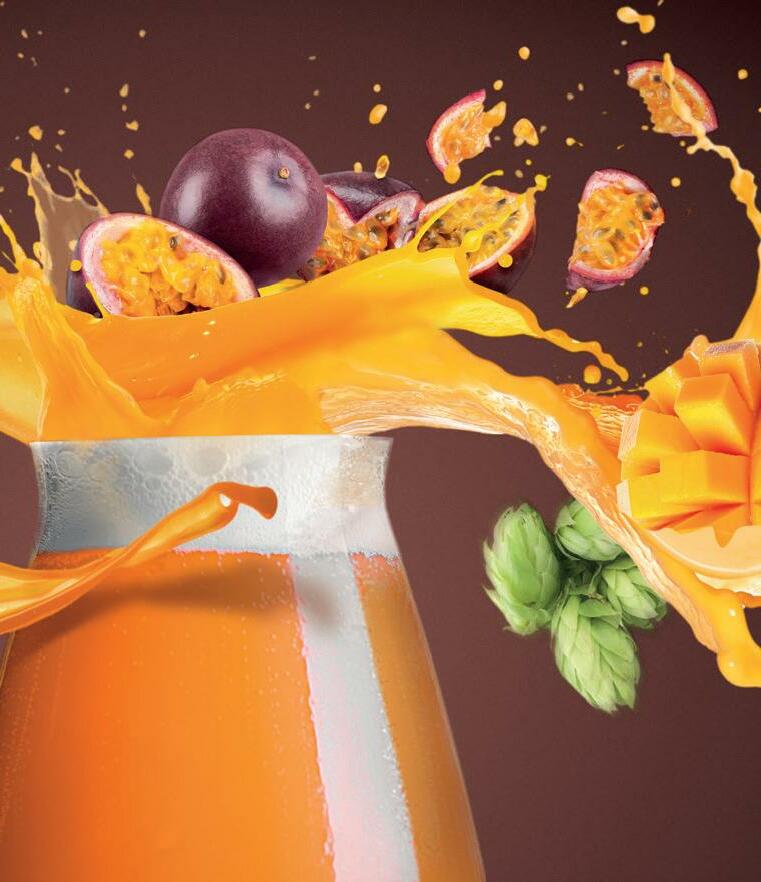
Winter 2022 | SIBA Independent Brewer | www.siba.co.uk Promote your brand & reach your customers with our range of small pack packaging eCommerce Packaging Transit Packaging Retail Packaging Shelf Ready Packaging from all of us at Saxon Packaging MERRY Christmas saxonpackaging.co.uk 01502 513112
Yorkshire Wolds farmer and entrepreneur wins Yorkshire Food Hero award
The team at a Yorkshire Wolds brewery and Yorkshire's first whisky distillery are celebrating after their founder won a local food and drink award.
Tom Mellor, who co-founded Wold Top Brewery with his late wife Gill, and launched Spirit of Yorkshire Distillery with friend David Thompson, was named the Yorkshire Food Hero 2022 at the 18th Deliciously Yorkshire Taste Awards in November.
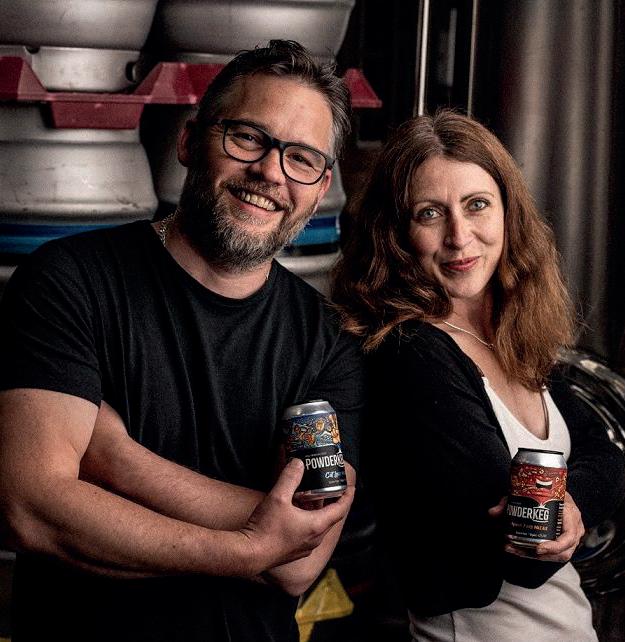
Sponsored by Mason's Gin, the inaugural Judy Bell Yorkshire Food Hero award was presented to Mr Mellor by Mrs Bell's daughters at an awards ceremony that was held at the Pavilions in Harrogate.
Nominated by their peers and decided on by the panel of Taste Award judges, the Food Hero award has been renamed in honour of the late Judy Bell MBE, the original Yorkshire Food Hero, and seeks to shine a light on someone who has championed the Yorkshire food and drink industry far and wide.
The judges said: "This year's recipient is a stalwart of the industry in the county, founding
Powderkeg adopts Forest Film labels as part of sustainability drive
and running not one, but two multi-awardwinning businesses and producing products enjoyed throughout the country and indeed around the world.
"Inspiring, innovative, and forward-thinking, Tom Mellor and his team have diversified and expanded, keeping up with trends and indeed setting new ones for many years from their base in East Yorkshire.
"Tom is a popular winner, building successful businesses alongside being a great ambassador of Yorkshire food and drink. A true Yorkshire Food Hero and a very worthy winner of this year's award."

Tom Mellor said: "It's a real honour to be presented with this award. Judy did an amazing job of championing Yorkshire food and drink and was always a great support to me, Gill and our family as we grew our businesses."
Wold Top was founded in 2003 and is located on the Mellor family farm at Hunmanby Grange near Filey.
Find out more at www.woldtopbrewery.co.uk
As part of a drive to become a more sustainable business, Powderkeg brewery has switched all of its can labels to Forest Film, a bio-plastic developed in Northern Europe. Made from cellulose from trees, the film is a by-product of the paper industry. As well as being made from renewable resources, its production uses much less energy and water than standard polypropylene can labels.
Using paper on chilled canned products is not feasible due to condensation, which causes labels to wrinkle and tear, so before Forest Film appeared as an option there was no choice but to use fossil fuelbased plastic when labelling drinks.
Powderkeg’s co-owner Jess Magill said: “We’re delighted to have made the switch to Forest Film. The print quality is great, so there’s no compromise on performance. It is more expensive, but I think as a responsible business you have to make decisions based on more factors than just profit. Hopefully as these fossil fuel plastic alternatives get more popular, the price will come down.
“Sustainability is a journey and this is another step in the right direction. We have minimised our plastic use, use recyclable and biodegradable packaging for our mail order service, and clean and re-use supposedly ‘single-use’ items like keg caps. We also repurpose cardboard boxes that we receive for our own deliveries and have switched to a paper-free office.”
The brewery also believes that supporting local is a big part of sustainability, and endeavours to source as many goods and services as possible from Devon or the South West.
“The more local businesses can support each other, the better our local economy gets,” said co-owner John Magill. “Where possible, stop putting money in the pockets of multinational corporations, and look at the quality and value available on your doorstep. Customers respond well to it, you usually get much better service and develop good business relationships. It’s a win-win.” Find out more at www.powderkegbeer.co.uk
85
| SIBA Independent Brewer | Winter 2022 Brewery news
www.siba.co.uk
S USTAI N ABILIT Y IN BR E WING
















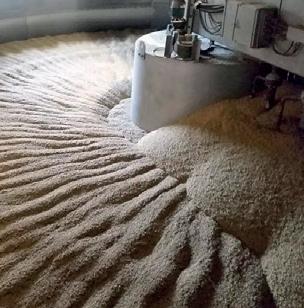


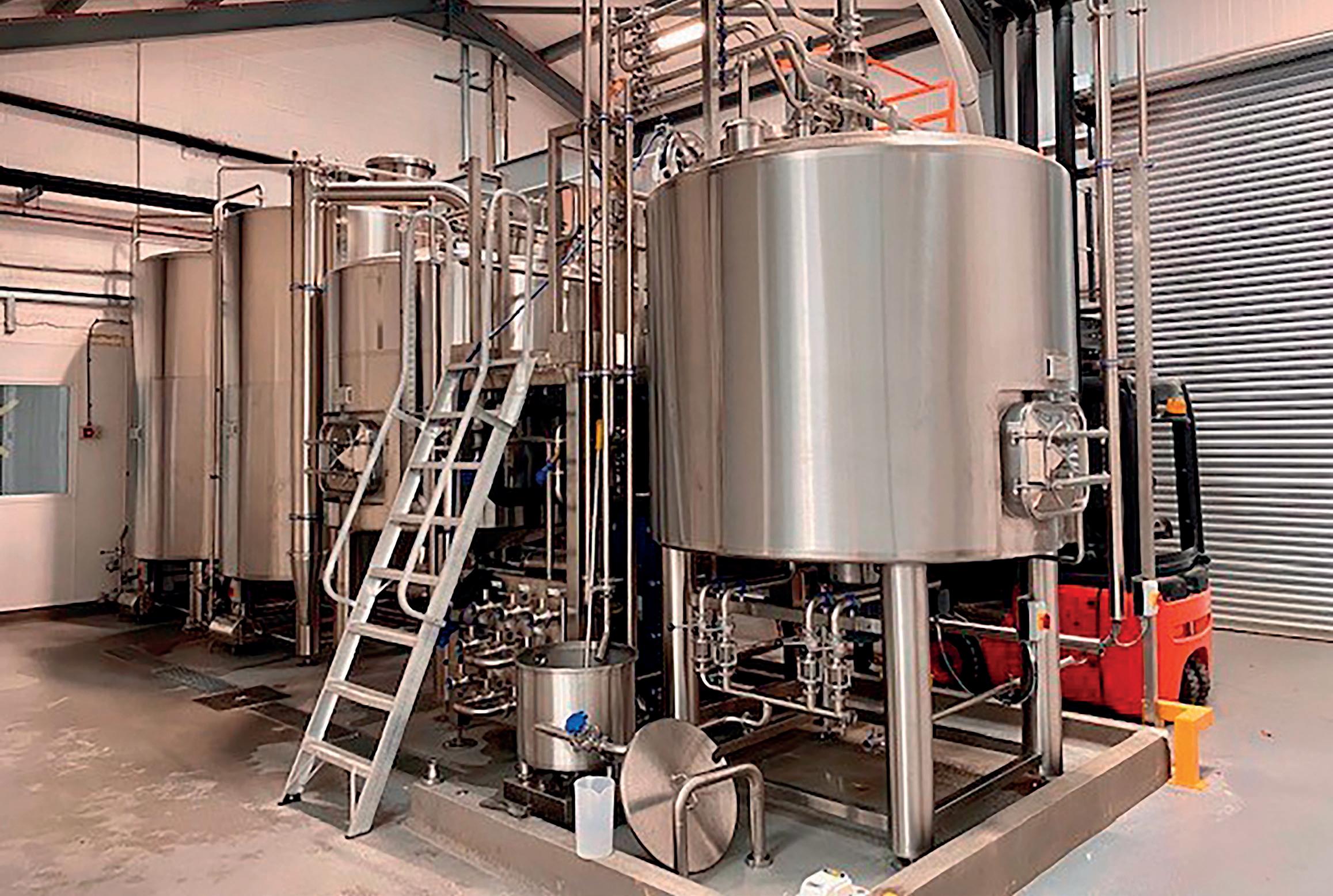

86 Winter 2022 | SIBA Independent Brewer | www.siba.co.uk FOR FLAVOUR - THINK FAWCETTS INDEPENDENT FAMILY MALTSTERS SINCE 1809 • Manufacturing Quality Malts for Over 200 Years • 30 Different Malts • Roasted & Floor Made Malts +44 (0)1977 552490 www.fawcett-maltsters.co.uk sales@fawcett-maltsters.co.uk Eastfield Lane, Castleford, West Yorkshire, WF10 4LE, United Kingdom Gravity Systems was formed to meet the growing demand in the craft beer market for a single source for all brewhouse, fermentation, services generation and distribution. It is our aim to be the most complete partner in the brewery industry by building long term partnerships with our customers. +44 (0) 1733 834264 | www.gravity-systems.co.uk
Hogs Back Hop Harvest celebrated by 3,000 people
On Sunday, live music continued to play from bands including popular Bloomfield Avenue, while the Kids Zone offered child-friendly amusement including farm animals, bouncy castle, face painting, Fred the Shed magic show and dray rides round the hop garden. Children and adults took part in a hat decorating competition, using freshly cut hop bines to create eye-catching headwear.
Rupert Thompson, Hogs Back MD, said: "Our Hop Harvest parties have always involved the local community and we were delighted that so many people joined us to celebrate this year's harvest. And as we're the only regional brewer in the UK to have our own hop garden, it is a uniquely Hogs Back celebration.
"Hop farming is an important part of Farnham's history and we're happy to have brought it back to the area with our hop garden. We know it's meant a lot to local people who were involved in hop farming in their youth or remember stories about it. We're grateful for their support, particularly the 50 Hogs Back Hopper volunteers who helped us bring in the harvest. It's hard physical work over a few weeks and they certainly earned themselves a few pints!"
Hogs Back Brewery in Tongham, near Farnham, staged its annual Hop Harvest celebrations on the last weekend in September, with a music festival-style event on the Saturday and a more family-friendly TEA Party on the Sunday. This year a record 3,000 people attended over the two days.

The brewery opened its gates from Saturday afternoon, welcoming guests to enjoy a range of Hogs Back beers, including Green TEA - a variation of the brewer's flagship Tongham TEA, brewed with fresh or ‘green' hops straight from their hop garden. Bands entertained the crowds all afternoon and evening from a stage in the brewery courtyard, culminating in a storming performance from Queen tribute Majesty.
Derby Brewing Company opens new site, The Pointing Dogs
The Pointing Dogs, a fresh new drinking establishment for all in the centre of Matlock, has become the latest addition to the pub estate of Derby Brewing Company. The food menu at the site features contemporary pub food with a modern twist, perfect for relaxed dining. New Head Chef Nicolas Porter heads up the team at The Pointing Dogs, bringing with him over 30 years’ experience in the hospitality industry.
Drinks wise, as you would expect from a Derby Brewing Company venue, there are a range of craft beers, premium ales, artisan spirits, cocktails, world wines and ciders.
Opening day in October saw the turning on of the original Smiths clock in the venue, which hadn’t worked for over years 20 years.

Derby Brewing was founded in 2004 by Trevor Harris and brews a wide range of beers with many regional and national awards to its name. The brewery also owns six other sites, Derby Brewing Tap House, The Clubhouse Premium Sports Bar and The Greyhound, all in Derby, The hole in the wall in Mickleover, The Middle Bell in Barton-Under-Needwood and The Pig in Lichfield. For more got to www.derbybrewing.co.uk
He added: "We're delighted with the quality of the hops this year, which will add wonderful, distinctive flavour to many of our beers. The size of this harvest was half that of last year's bumper crop: hops need water to thrive, so this summer's drought had an impact. However, we're still delighted to be growing hops just yards from the brewery, helping to reduce our food miles and achieve our goal of being an ever more sustainable brewer: on average the hops we harvest here provide more than 50% of our brewing needs for the year."
Hogs Back harvested three hop varieties this year: Fuggles, used in Tongham TEA; English Cascade, used in its Hogstar lager and Surrey Nirvana Session IPA; and Farnham White Bine, a traditional local variety that the brewer saved from near-extinction by planting in its hop garden in 2014.
Find out more at www.hogsback.co.uk
87 www.siba.co.uk | SIBA Independent Brewer | Winter 2022 Brewery news


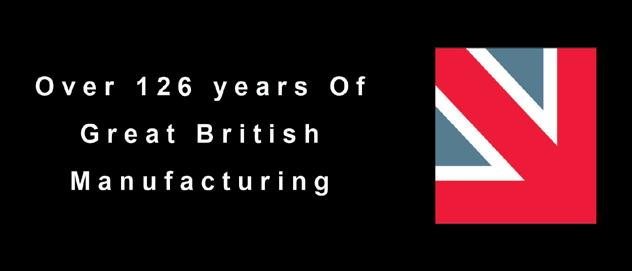
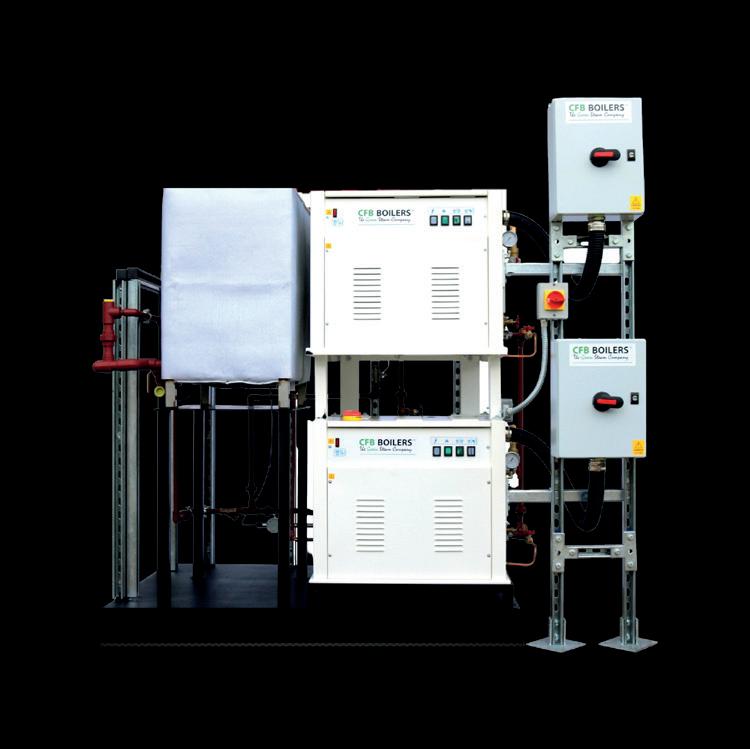

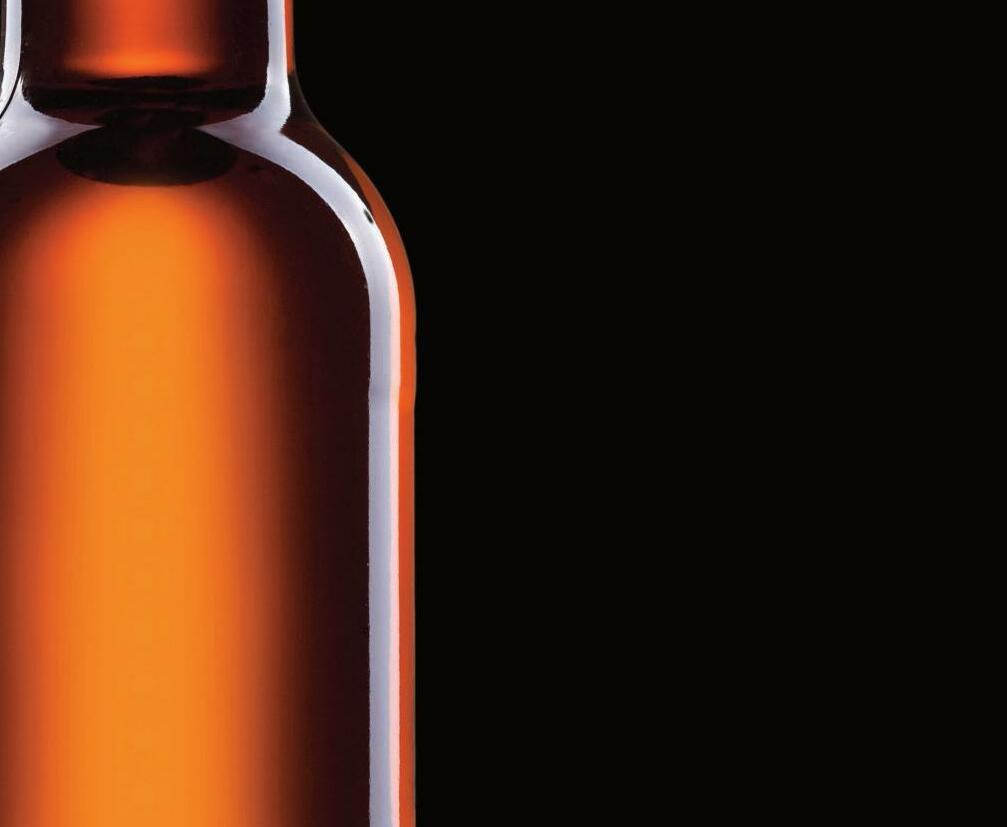

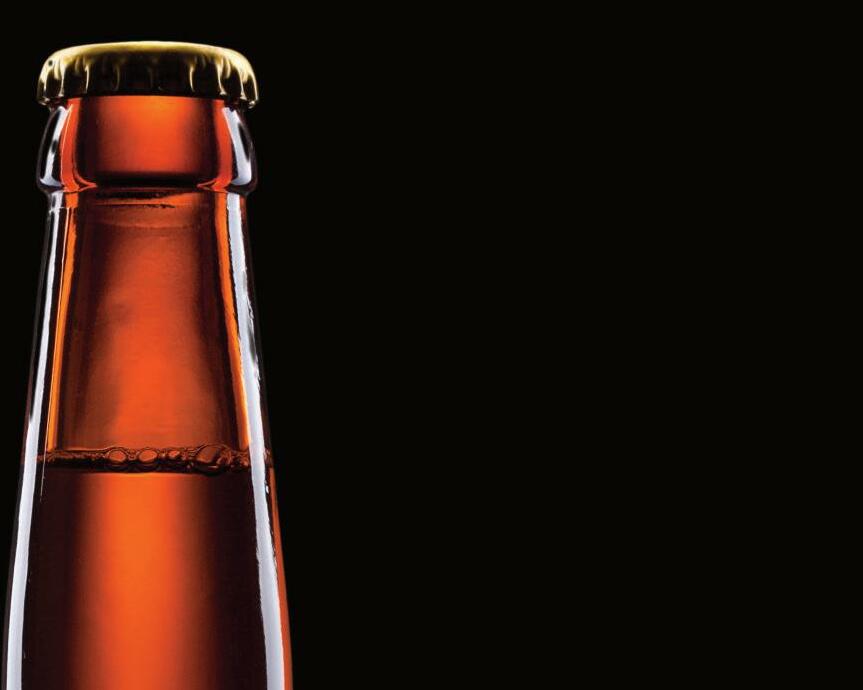


88 Winter 2022 | SIBA Independent Brewer | www.siba.co.uk T: 01255 224500 E: sales@steamboilers.co.uk www.steamboilers.co.uk MANUFACTURERS & DISTRIBUTORS OF INDUSTRY-LEADING DESIGN STEAM, ELECTRIC & HOT WATER BOILERS & ANCILLARY EQUIPMENT High performance equipment Excellent ROI Superior customer service Durable, low maintenance designs Proven energy, carbon and cost saving credentials 182x128 CFB Advert.indd 1 02/12/2016 17:01 CFB BOILERS The Green Steam Company BOILERS RANGE FROM 156- 55,000 KG/HR ELECTRIC STEAM BOILERS RANGE FROM 20 kW - 800 kW FULLY PACKAGED PLANT ROOMS TURN KEY PACKAGES INSTALLATION WE ALSO OFFER MAINTENANCE & SERVICE CONTRACTS AND ENERGY SAVING OPTIONS COMPLETE STEAM SOLUTIONS
Renegade Brewery: new beginnings for local brewery
West Berkshire Brewery has revealed its rebrand as Renegade Brewery.
The launch of Renegade comes with more than just a name-change for the formerly known WBB. Creator of local favourite 'Good Old Boy', Renegade Brewery delves into the craft beer market with a fresh new range, whilst still honouring its 'good old' classics.
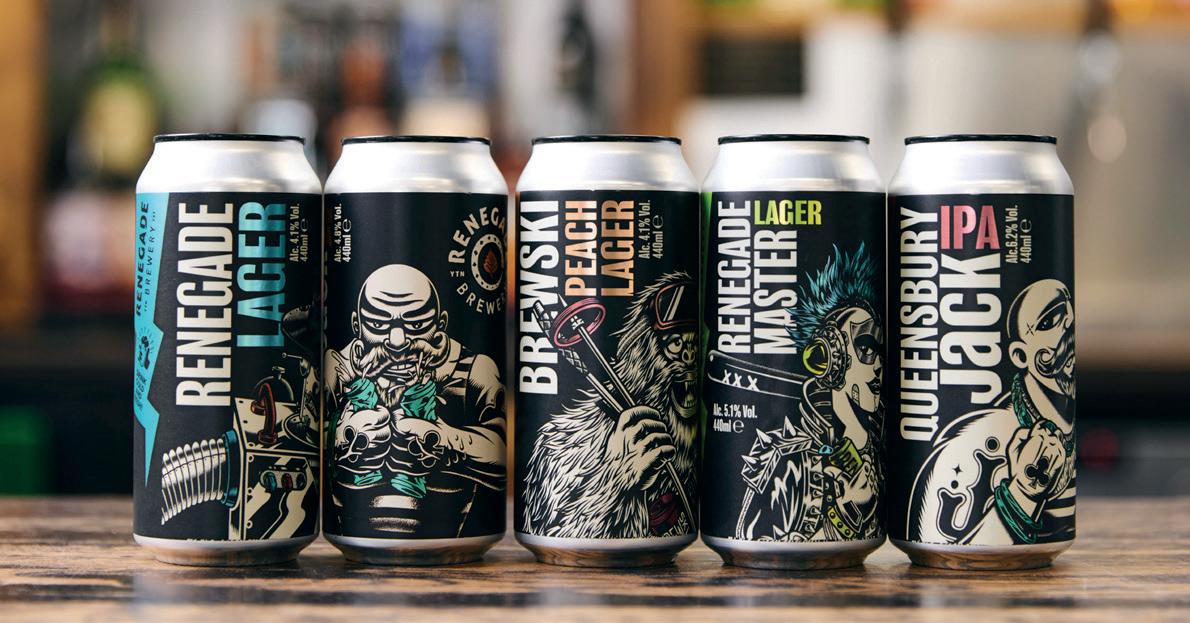
The rebrand comes after Yattendon Group acquired the brewery in December 2021, appointing Ian Rogers, founder of Wychwood Brewery and the iconic Hobgoblin brand, as its new Managing Director.
Ian said: “Renegade Brewery represented by our new ouroboros serpent logo is the embodiment of eternal cyclic renewal and rebirth and represents the perfect metaphor for my connection and appointment to the company. The old West Berkshire Brewery was great at producing exceptional cask ale and premium bottled ales. Beer today is at the vanguard of popular culture and is now more popular than ever with all its amazing complex styles. Renegade will celebrate its roots in traditional ale but will also be at the forefront of Craft beer and over the next 12 months will introduce new beers that burst with aroma and flavour.”
Four new beers are being added to the Renegade line-up:
• Queensbury Jack, IPA 6.2%
• Queensbury Jack, Session IPA 4.8% ABV
• Renegade Master, Lager 5.1% ABV
• Brewski, Peach Lager 4.1% ABV
These new beers will join classics such as Good Old Boy and Renegade Lager as well as a new calendar of limited-edition, one-off brews. Find out more at www.renegadebrewery.co.uk
Unity Brewing Co reopens Cloud Wine
Southampton’s Unity Brewing Co has relaunched the Cloud Wine off licence as Unity Bottleshop & Tasting Room.

The move brings to life the Unity team’s vision for a bottle shop and tasting room where everyone is welcome to buy and try some of the best craft beer, artisan spirits, natural wines and no/low-alcohol drinks from the UK and beyond.
“We’ve kept on all the Cloud Wine team and aim to build an even stronger craft beer offering in and around Bedford Place and the Cultural Quarter,” says Unity’s founder Jimmy Hatherley. “As costs for businesses and households alike just keep going up, we’re incredibly lucky to have so much support from the Unity community. We’re confident that demand for our awesome product line up - and intimate tasting room experience - will provide an appealing and exciting new place to buy interesting drinks for the people of Southampton, alongside our popular brewery taproom in Northam.”
This year also marks an important anniversary for the Cloud Wine site, which sees it celebrate 100 years of being an off licence, first opened in 1912 by local resident Miss White for the ‘retail of beer’ specifically. Jimmy even spent a couple of years working at Cloud Wine himself in the mid ‘00’s. Find out more at www.unitybrewingco.com
Steve Grimes from 90’s band The Farm launches Groovy Grain
Steve Grimes, a member of the 90’s band The Farm, and brewing partner Chris Hughes have turned their homebrewing passion into a new nano brewery enterprise with the launch of Groovy Grain.
Steve said: “We had been brewing beer for ourselves since lockdown. We very much enjoy craft beer and decided to find out how to make it. We loved doing it so much we thought we must have a name for our nano brewery. One of our hit records was called Groovy Train so we came up with Groovy Grain - perfect!”
Following the brewery’s launch, Groovy Grain pale ale was a big hit with famous 80’s acts at the ‘Let’s Rock Liverpool’ festival. The band, whose hits Groovy Train and All Together Now were top 10 smashes in 1990, were invited to play at the festival at Wavertree Playing Fields in Liverpool, their home town. Groovy Grain made the beer specially for the gig and called it ‘Festival Ale’.
The Let’s Rock production team very kindly let them place their beer at the entrance to the artists area where it refreshed classic acts including Chesney Hawkes, Scritti Politti and Nick Hayward of Haircut 100.

89 www.siba.co.uk | SIBA Independent Brewer | Winter 2022 Brewery news





90 Winter 2022 | SIBA Independent Brewer | www.siba.co.uk premiersystems.com sales@premiersystems.com 023 8081 1100 every two hours. Find Out More... WWW.CHRISTEYNS.COM DESCALING CLEANING & DISINFECTION CLEANING ADDITIVES CONVEYOR LUBRICATION BIOFILM PREVENTION T: 01925 234696 E: uk-foodinfo@christeyns com 2 Cameron Court Winwick Quay Warrington, Cheshire WA2 8RE
Abbeydale Brewery invests in largest brewkit update since 2009
Sheffield based Abbeydale Brewery has recently invested in the commissioning and installation of a new brew kettle, working closely with suppliers SSV to complete the project. The move is the brewery’s largest upgrade since 2009, and the new kettle has doubled the site’s wort boiling capacity to 6000l. It features an external wort boiler and wort chiller, a built-in whirlpool and a much more in-depth display and control panel. As well as providing the brewery with greater flexibility in terms of beer flavour and
production for the brew team to experiment with, the upgrade also forms part of Abbeydale’s commitment to working towards ever more environmentally friendly processes. A vapour condensing unit recovers energy, enabling it to capture the heat from the steam used for boiling and recycle water at 95 degrees back to the hot liquor tank, ready for use in the next brew. Water used to chill wort is also able to be reused. Finally, it is anticipated that the new kettle will lead to improved yields and efficiencies throughout the brewing process.
Titanic Brewery celebrates serving 10 million pints of its flagship beer
Staffordshire brewery Titanic was full of cheer as it celebrated having brewed and served over 10 million pints of its flagship beer, Plum Porter (4.9% ABV).

First brewed by the team at Titanic in 2011, the original intention had been to create the rich and fruity beer as a one-off seasonal special, but its popularity quickly took hold and it wasn’t long before Plum Porter became part of Titanic’s core range, where it has remained ever since.
Head Brewer Will Bott puts the success of the beer down to its easy-drinking nature. “We regularly hear from customers who love our Plum Porter, but don’t ordinarily like dark beers. We wanted to create something that really delivers on rich and fruity plum notes, but is also well-rounded and easy to enjoy all year
round,” he said.
A firm favourite at beer festivals across the country, Titanic Plum Porter has picked up a number of awards over the years, including gold in the Speciality Beer category at CAMRA’s 2015 Champion Beer of Britain awards.
“We really didn’t expect Plum Porter to be as successful as it is, we’re often brewing it twice a week to keep up with demand,” Will continued.
“It’s not often that you come across a brewery which has a stout or porter as its most popular product, but we really are delighted that beer drinkers enjoy it so much!”
The milestone celebrations also coincided with the annual release of Titanic’s now-traditional winter beer. Plum Porter Grand Reserve (6.5% ABV) is a richer and stronger version of the
Abbeydale Brewery’s Sales Director Dan Baxter said: “After a challenging few years, we’re really excited to be in a position to make this substantial investment in our kit and commitment to the future of the brewery. The extra capacity will enable us to continue producing our long-standing range of traditional ales to the highest quality, as well as further expanding our capabilities for experimentation and innovation. We can’t wait to put the new kettle through its paces!”
Find out more at www.abbeydalebrewery.co.uk
original
“Despite originally being a seasonal beer, we can’t imagine our core range without Plum Porter,” said Will. “As well as the Grand Reserve, it’s gone on to inspire other beers in our range including our Cherry Porter.”
Find out more at www.titanicbrewery.co.uk
Powder Monkey brews Mary Rose beer for 40th anniversary of raising the ship

Powder Monkey Brewery, based in a historic gun powder store in Gosport, Hampshire, has brewed a special beer for the Mary Rose.
The beer has been launched in the year of the 40th Anniversary of the raising of this historic warship and is available at the Mary Rose Museum, throughout the Historic Dockyard and online via the Powder Monkey shop.
Powder Monkey supported the divers’ celebration dinner to mark the anniversary and the team was privileged to be invited on a unique boat trip to the site of the wreck where roses were scattered in honour of those that died.
Mary Rose beer was available for tasting on the trip and even enjoyed by Henry V111 himself!
Andy Burdon, Powder Monkey CEO, said: “It has been a pleasure developing the Mary Rose Beer in celebration of the 40th anniversary of the raising. It has been a great opportunity
for our Head Brewer Mark Hamblin to turn inspiration into innovation, creating a pale ale symbolic of life on board the Mary Rose during the 16th century and supporting the important conservation project that the Mary Rose Trust continues to deliver.”
Mary Rose (4.2% ABV) was inspired by visits to the Mary Rose Museum, and is a light and sessionable pale ale that acts as a modern interpretation of the lighter beers that would have been drunk on board the ship – but packed with plenty more flavour (although we can’t recommend drinking a gallon a day!). A blend of hops lend an intriguing aroma profile with a hit of cracked black pepper combining with fresh citrus fruit and some herbal notes. A clean malt profile with a prominent but rounded bitterness make for a truly refreshing and drinkable beer. Find out more at www.powdermonkeybrewing.com
91 www.siba.co.uk | SIBA Independent Brewer | Winter 2022 Brewery news
that’s matured for 21 days. Available in bottles, cask and keg, it has quickly become a firm favourite by the fireside.
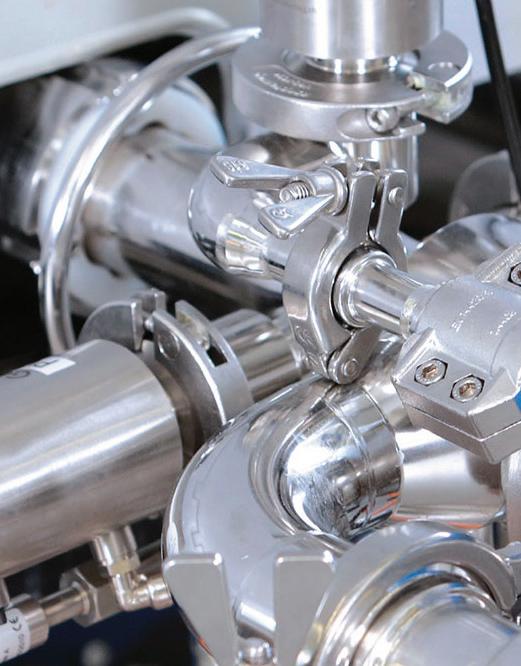

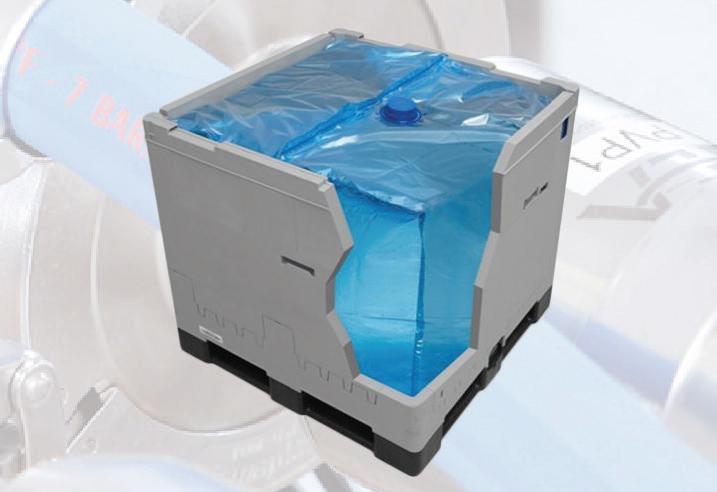
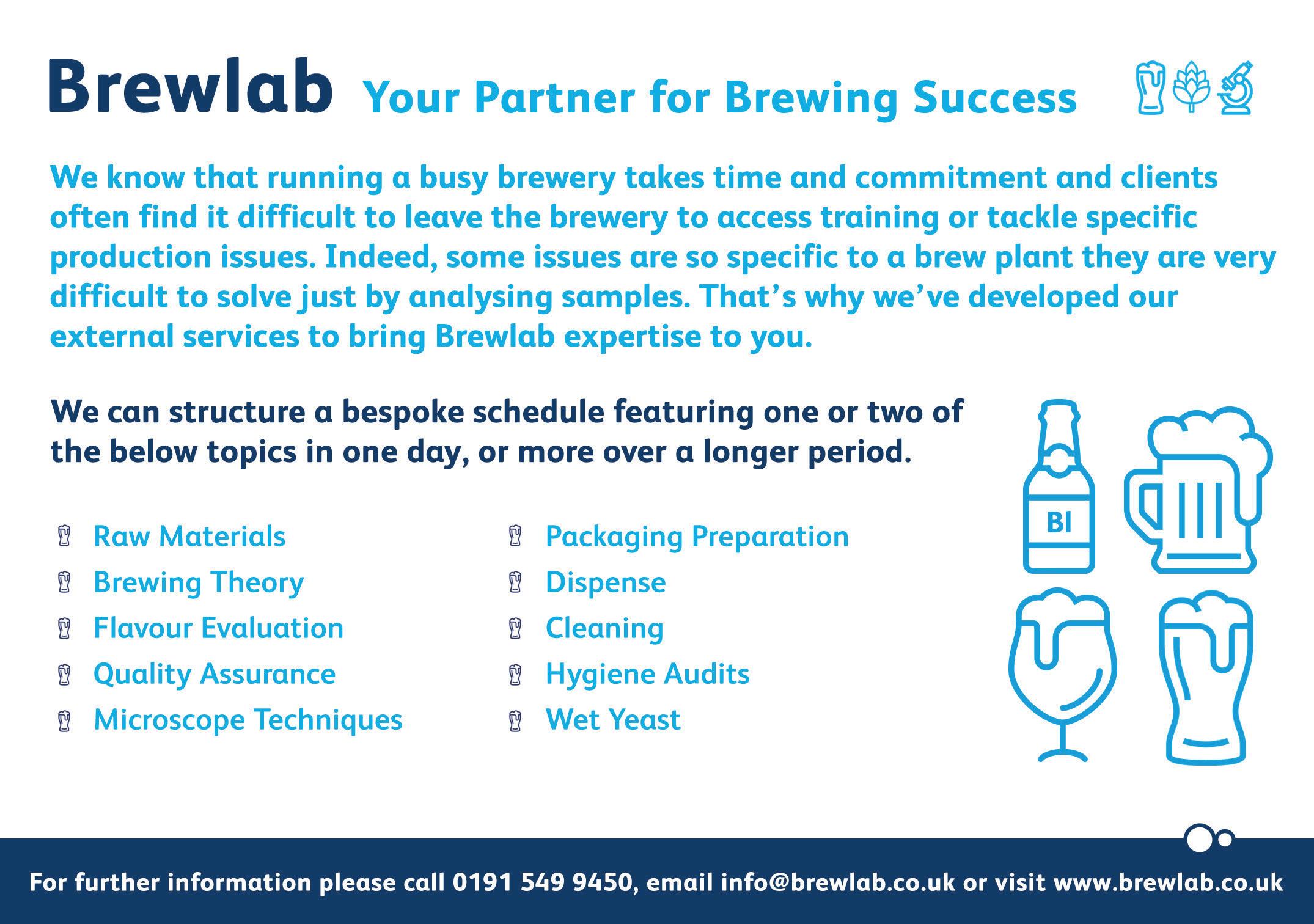
92 Winter 2022 | SIBA Independent Brewer | www.siba.co.uk Unrivalled hygiene Approved for use with such products as pharmaceuticals and drinking water, you can be sure the Arlington bag in box system can also deliver the highest levels of hygiene for your product in a low cost, chemical and energy efficient way. At Arlington we back all our products with award winning support and technical service. Call us for more information. See us at www.beercarriers.co.uk, www.arlingtonpackaging.com or for more information call us on: 01672 563723 Arlington Packaging Ltd., SN9 5PZ
What to look out for when taking out a new insurance policy for your brewery
The team from bespoke insurance brokerage Russell Scanlan takes a look at what type of insurance a small brewery in the UK market needs, how much it costs, and how best to go about ensuring you have the cover you need…
The brewing industry has found itself battered and bruised after being caught up in what can only be described as a living business hell. From Covid closures to supply chain issues, the industry has faced its fair share of setbacks. However, with the recent announcement from the British government that decisions have been made to scrap the planned freeze on alcohol duty, adding yet another U-turn into the mix, it seems the industry just can’t catch a break.
The unwelcome declaration comes at a time when more and more businesses are struggling to stay afloat amid the cost-ofliving crisis, yet there is one commercial necessity that is often overlooked, insurance.
There are just over 2,400 breweries in the UK alone, according to the latest figures from Statista. A number which has risen by more than 60% in the past four years. But like any other fully functioning business, breweries need to be properly insured to protect themselves from potential liabilities. The question that is often on every business owner’s lips? What kind of insurance does a brewery actually need? And how much does it cost?
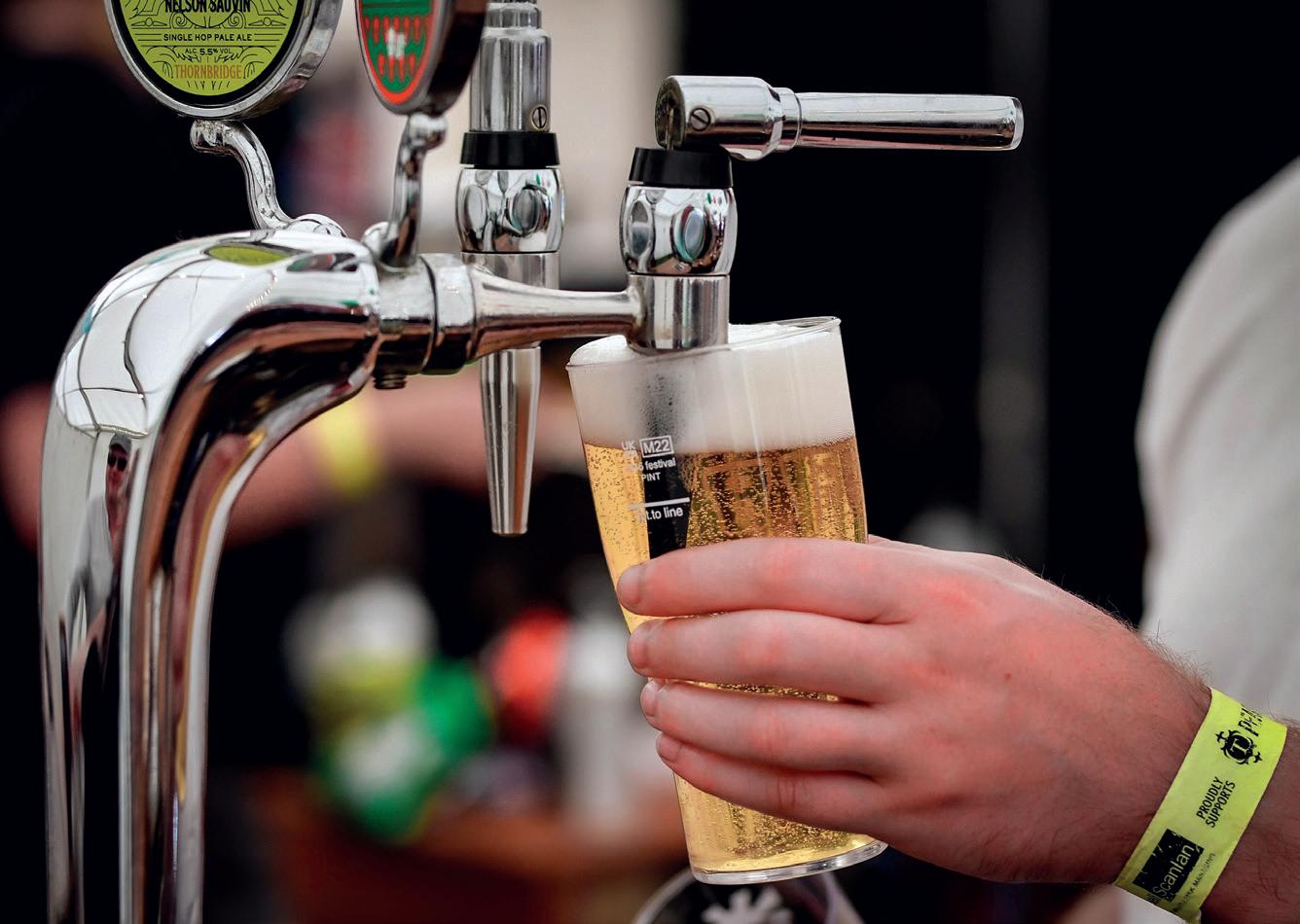
Russell Scanlan, the leading independent insurance broker for more than 140 years, offers expert insight on the ins and outs of specialist policy packages, as well as detailing what to look for when deciding on the best insurance policy for you and your brewery.
Specialist brokers and dedicated teams hold the key to effective insurance cover
Finding a specialist broker that can fully submerge themselves into the day-to-day operations of the business is key to ensuring that your business needs and cover is met. Whilst online brewery insurance solutions are available and do offer some form of protection, using such platforms increases the risk of you and your business running into insurance difficulties, should you need to claim later down the line.
Choosing a dedicated team that has access to a panel of insurers ensures that you are offered the right support and guidance for you specialist cover. Brokers and teams that take the time to work closely with you to understand your business, will help you to tailor a package with all the right ingredients, developing a policy that gives you peace of mind.
The one size fits all approach rarely works
It’s important to remember that a one size fits all approach will never provide you with the comprehensive cover that you and your business need. Breweries are often involved in so many different activities, whether it be attending trade fairs, brewery tours or shipping goods overseas, that tailoring a package and speaking to an expert helps to ensure your business is fully protected against any future issues.
Understanding what your business goals are for the upcoming year will allow you to forecast what type of additional premiums you may need for your insurance policy. Having an overview of your plans and ambitions will ensure that you are fully covered for upcoming business ventures.
Never a glass half empty when you work with specialists
When shopping around for insurance, choosing a broker that offers a full suite of insurance products, from stock and IT to events and property, eliminates the likelihood of loopholes that can often be found when multiple insurance providers are used to cover different aspects of a business.
Taking out multiple insurance policies under one trading business has the potential to complicate the insurance recovery proceedings immensely, and possibly even undermine certain terms. The relation of "other insurance" clauses, allocation schemes, and the practical impacts of interacting with multiple insurers can often leave breweries with some difficult questions.
This is why it is always advisable to work with a specialist team who understands the insurance industry. While the term “specialist” is often associated with increased expense, it doesn’t always have to mean this. Working with specialists helps to provide a more targeted and no-waste approach within the policy itself.
Ultimately, there should be no substitute for tailored brewery insurance policies as businesses as complex and individual as these require a unique strategy. Proper planning and proactive discussions with insurers can help to mitigate future issues, whether they be industry or nationwide so that you can continue to operate to your potential.
If you’d like to arrange a chat with one of our specialist team then please visit www.russellscanlan.com or call 0115 947 0032.
93 www.siba.co.uk | SIBA Independent Brewer | Winter 2022 Supplier Viewpoint: Russell Scanlan
Viewpoint
Supplier




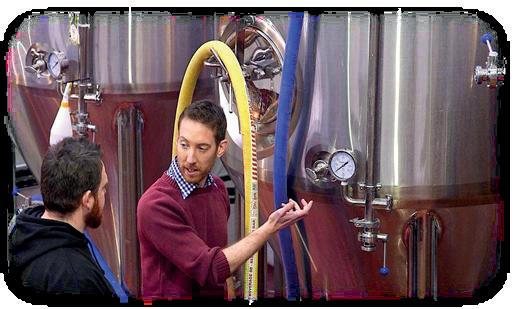
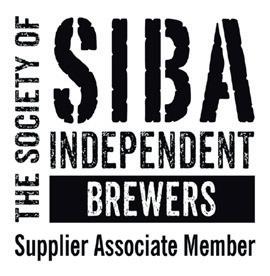
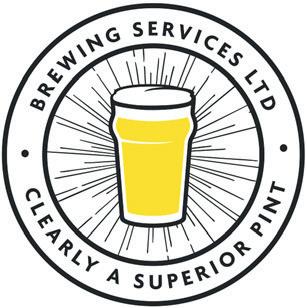
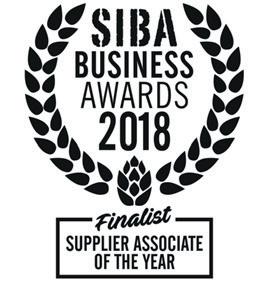



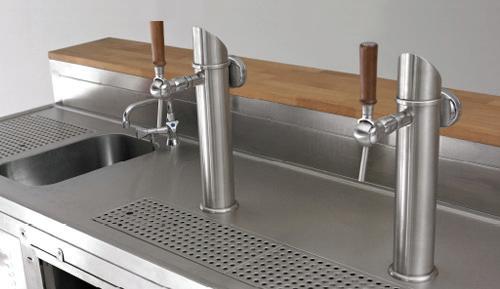
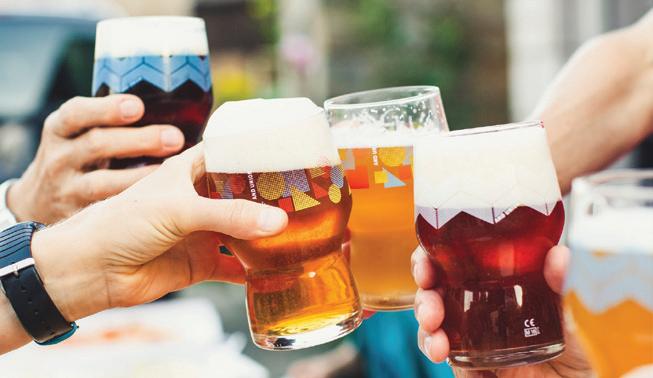
94 Winter 2022 | SIBA Independent Brewer | www.siba.co.uk BREWERY START-UPS & EXPANSIONS, ON-SITE OR REMOTE Q.A. SURVEYS, TECHNICAL SUPPORT & TROUBLESHOOTING ON-SITE TRAINING, RESIDENTIAL & VIRTUAL TRAINING COURSES NEXT COURSE: 26 29 MARCH 2023 Rob Smith, Hayley Young & David Smith Rob: 07966 693097 / Hayley: 07855 326144 enquiries@brewingservices.co.uk www.brewingservices.co.uk info@celligroup.com | tandjinstallations.com CELLI Service is the new name for T&J Installations Call 0121 783 8925 The support you need for the drinks you serve We procure, supply and install: • Cask, keg and tank dispense • Cellar cooling and refrigeration • Soft drinks and filtered water • Mobile and temporary bars • FastPour • Cocktail machines Mobile bars for all events With our support services for outdoor events and our range of mobile and temporary bars, we can help you serve drinks at high quality in testing environments. Enjoy perfect drinks dispense with CELLI Service We are a leading service provider to the UK drinks industry CELLI Service delivers great ROI and peace of mind to the nation’s independent and major brand owners. We ensure your products are always served at the highest quality – whether in a pub or a stadium. We can even provide complete supply chain management.
Track Brewing invests in QCL’s VeriFlow PCR system
The summer of 2021 saw a move to a new location for Manchester’s Track Brewing, a new production facility and taproom all under one roof where customers can enjoy a wide range of beers in the shadow of the brewery tanks.
Wanting to enhance quality control and product security the brewery purchased the VeriFlow PCR system from QCL with the specific aims of checking yeast prior to pitching and testing beer for Diastaticus before packing.
The speed of results from VeriFlow allows for positive release of product, without slowing the process down and reducing capacity, which is not possible with traditional methods or outsourced testing.
Veriflow is a PCR based rapid microbiology system that allows brewers to check the microbial status of beer at various stages of the brewing process. The system detects beer spoilage bacteria (Pediococcus. Lactobacillus, Megasphaera and Pectinatus) and wild yeasts (Saccharomyces Diastaticus, Brettanomyces Bruxellensis and Dekkera/Brettanomyces).
Sample preparation and operation is simple and results are available in less than 4 hours, a much faster time to result when compared with outsourced or traditional microbiology, meaning final products can be released in a timely manner and with greater confidence.

Using Veriflow at critical control points can prevent wastage of ingredients, energy and time, and avoid product loss or recall, protecting brand reputation.
Find out more at www.qclscientific.com
Boost your brand with WBC’s beer bags and carriers
WBC has been printing an increasing number of beer bags for retail customers and breweries alike. With a host of street markets and speciality food and beer festivals throughout the year, there’s no time like the present to capitalise on the nation’s beer drinking with a beer bag or carrier specially designed to showcase your brand and products.
Here’s WBC’s seriously simple 3 Point Beer Plan:
1) Pick 6 of your best craft beers
2) Offer them in any of our 6-bottle re-usable beer bags
3) Buy them plain, or with a pre-printed design, or WBC can print your logo in just 7 to 10 working days with its personalisation service.
You can charge for the bag or give it away as a freebie when people visit your store.
How much does a beer bag cost?
That depends on whether you’re buying your bags plain from stock, with a pre-printed design or personalising them with your own design.
To purchase your own beer bag with your company logo is remarkably affordable with prices starting from just £3.21 a bag based on 1 colour, 1 side (Ex VAT). For up to date pricing visit the WBC website.

Find out more at www.wbc.co.uk/drinks-packaging/ beer-carriers/
Lallemand Brewing, in partnership with Renaissance Yeast, develops new yeast for lager styles
LalBrew NovaLagerTM is a new premium yeast selection for modern lager beer styles.

The yeast is a true bottom fermenting Saccharomyces pastorianus hybrid from a novel lineage that has been selected to produce clean lager beers with distinct flavor characteristics and superior fermentation performance. It is a robust lager yeast strain with ideal brewing properties, including fast fermentations, high attenuation, and high flocculation. The distinct flavor profile is very clean, slight esters over a wide temperature range.
LalBrew NovaLagerTM is the result of the research and development work of Renaissance Yeast (Vancouver BC, Canada) in partnership with Lallemand Brewing. It was selected using classical and non-GMO breeding methods to obtain a
novel Saccharomyces cerevisiae x Saccharomyces eubayanus hybrid strain that defines a novel Group III (Renaissance) lager lineage, different from any other traditional Saccharomyces pastorianus strains. This strain is a low VDK/diacetyl producer and utilizes patented technology from the University of California Davis (USA) to ensure no hydrogen sulfide (H2S) is produced, therefore reducing the maturation time associated with lager beer production. It is available in 500g packs, with 11g sachets coming soon. LalBrew NovaLagerTM has a recommended pitch rate of 50-100g per hL of wort. Find out more at www.lallemandbrewing.com
95 www.siba.co.uk | SIBA Independent Brewer | Winter 2022 Supplier news

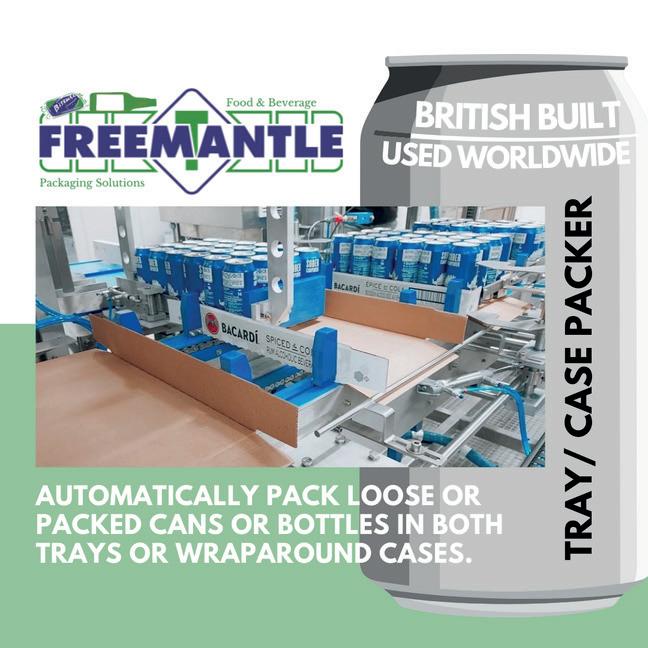

96 Winter 2022 | SIBA Independent Brewer | www.siba.co.uk
Anton Paar devices measure CO2 without the influence of other dissolved gases
Are you thinking of switching from CO2 to N2 to save money? Did you know that conventional pressure/ temperature CO2 measurement does not work if there is nitrogen present?
Anton Paar has the solution with the CarboQC and CBoxQC.
CarboQC and CBoxQQC measure the true dissolved carbon dioxide content in beverages without the influence of other dissolved gases such as nitrogen.
The amount of CO2 gas in a beverage is a critical quality parameter in production. Many different test methods have been developed over the years including both chemical and physical test methods. Over time the physical methods of measurement have become the preferred methods for beverage testing. In their basic form these rely on the measurement of the temperature and pressure of gas in the headspace of the can/ bottle, and use the ideal gas laws to convert this into a CO2 content. That is fine when the only gas present is CO2, but when other gases such as air, or nitrogen are present then these methods will give false readings. The total pressure reading obtained is a sum of the partial pressures of each different dissolved gas, but these simple instruments treat the total pressure as if it all comes from CO2, leading to erroneously high results, and potentially to out of specification product.
Anton Paar has the answer to this problem. Uniquely amongst producers of dissolved gas test instrumentation, our instruments use a patented multi-volume expansion technique. This allows the CarboQC, CBoxQC or CarboQC ME models to test the true CO2 content in a beverage container without any influence from other dissolved gases –including Nitrogen purge gas. In addition to a true CO2 content, the CBoxQC will also measure the Oxygen content in the container. All three models will measure the gas content directly from the can or bottle when used in combination with our PFD piercing device or PBA beverage analysis systems.
Special Offer: During the rest of 2022 Anton Paar will offer a 15% trade-in discount for every old dissolved gas measuring unit replaced by a CarboQC or CBoxQC. Find out more at www.anton-paar.com/uk-en/
Konvoy set to transport UK and European keg management to 21st Century
The leading keg rental firm in Australia and New Zealand is about to shake up the brewing and hospitality industries by launching operations across the UK and Europe.
Konvoy, which will enter the UK and Europe market in early 2023, is the world’s only stainless-steel keg pooling provider that is promising a fully cutting-edge smart keg management solution.
The new business will lead with its sharable keg rental offering at its core, with long-term rentals, also referred to as leasing, and its proprietary IoT tracking technology. Even if brewers choose to remain keg owners, Konvoy can help them track their assets and become a better business as a result.
The technology captures encrypted data that can pinpoint each keg’s precise location, enabling things like better rotation, fresher deliveries, faster collections, and greater reusability. In addition, the device logs other important data, such as temperature, to create a fleet of smart kegs that can keep getting smarter to meet the future demands of the drinks supply chain.
It also removes the need for manual tracking, scanning and administration while helping to minimise theft and losses, which is a global keg problem estimated to cost between $300m-$500m per year, according to a 2020 article published by ‘IT In The Supply Chain’. Konvoy is providing an ecosystem of assets, hardware, software, firmware, and connectivity that can also be fitted retrospectively to existing keg fleets to achieve the same results.
In advance of this expansion with short- and
long-term keg rental and technology solutions, Konvoy has announced a series of strategic, high-level appointments to scale the business forward and disrupt the market.
Christian Barden will head up the new UK and Europe business as CEO. Chris Beardow has been appointed Operations Director. Richard Atkinson and Tom Meakin have both been appointed Business Development Director for the UK & Ireland. Heiko Wiebel has been appointed Business Development Director for Europe where he has made considerable progress over recent months.
Adam Trippe-Smith, managing director and founder of Konvoy, said: “I am incredibly proud to announce this series of appointments, which runs along considerable growth plans for the Konvoy business.
“We are excited to launch officially in the UK and Europe in early 2023 as we continue to disrupt the global keg industry one keg at a time.
“Europe, particularly, has been a hard nut to crack in terms of convincing brewers of the huge potential cost reductions, improved margins and reduced carbon footprint involved in leasing and renting kegs rather than buying your own. We are setting out to change all that and help bring the beverage industry into the 21st Century.”
The firm’s innovative keg pooling and tracking business model vastly increases environmental sustainability as Konvoy customers effectively share the ‘pool’ of kegs that they rent on demand across cities, regions and between countries for export.
Christian Barden, former CEO of Kegstar and
global beer industry veteran, who previously worked alongside Adam when they launched Kegstar into Europe in 2016, said: “It will be incredible to get working with such a great team and technology platform and evolve the world of keg management with Adam Trippe-Smith again.
“Drinks and hospitality have always been so innovative, and we’re excited to be ‘here for your beer’, wherever we can help customer supply chain experiences. We have a great team full of beer industry expertise, a ton of keg know-how and a pool of smart kegs available to help customers become more efficient, more effective and more sustainable.”
He added: “The automatic collection of data through IoT systems like ours helps make monitoring and tracking frictionless, helps to improve the demand and supply process of draught drinks whilst eliminating human error. The connection of vehicles, equipment and devices enables all parties to see a complete, end-to-end supply chain picture from brewery to bar.”
Following continued customer wins in the ANZ market since its launch in 2019, Konvoy is growing its fleet there with new keg investment of around A$10m.
The move comes hot on the heels of the appointment in August of new CFO Michael Campbell, formerly CFO of the Rockpool Dining Group.
Michael said: “Konvoy has achieved impressive market share in Australia and New Zealand since launch and its technology will be a key differentiator for expansion into new markets.” Find out more at www.konvoykegs.com
97 www.siba.co.uk | SIBA Independent Brewer | Winter 2022 Supplier news


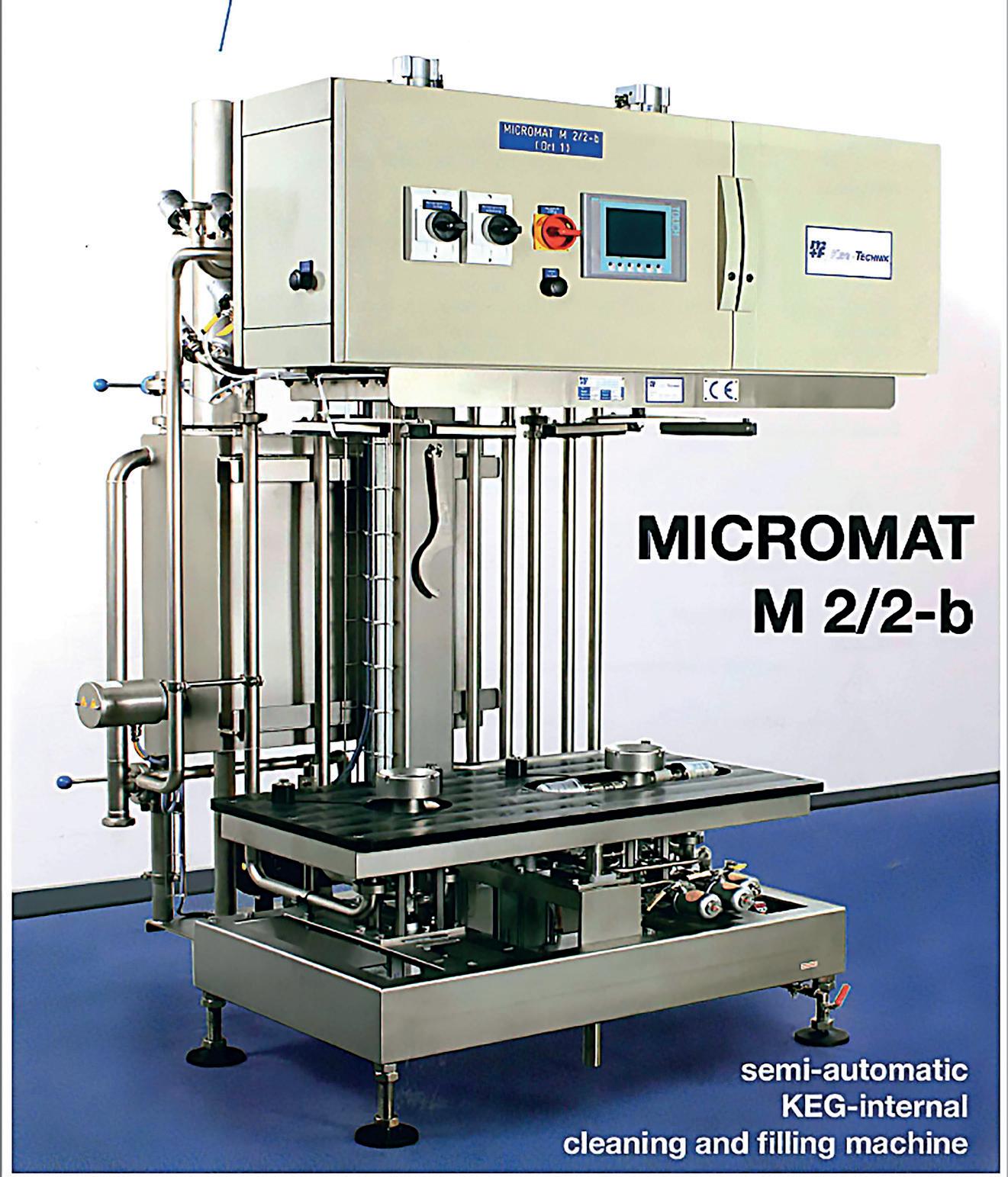
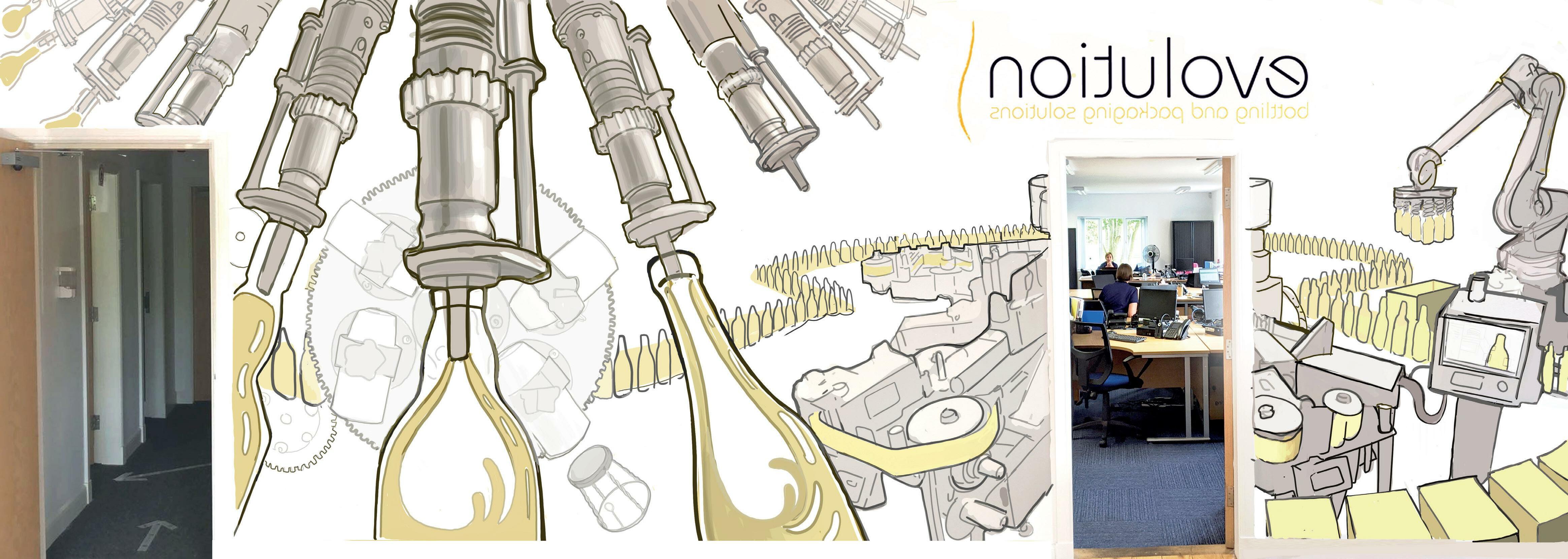
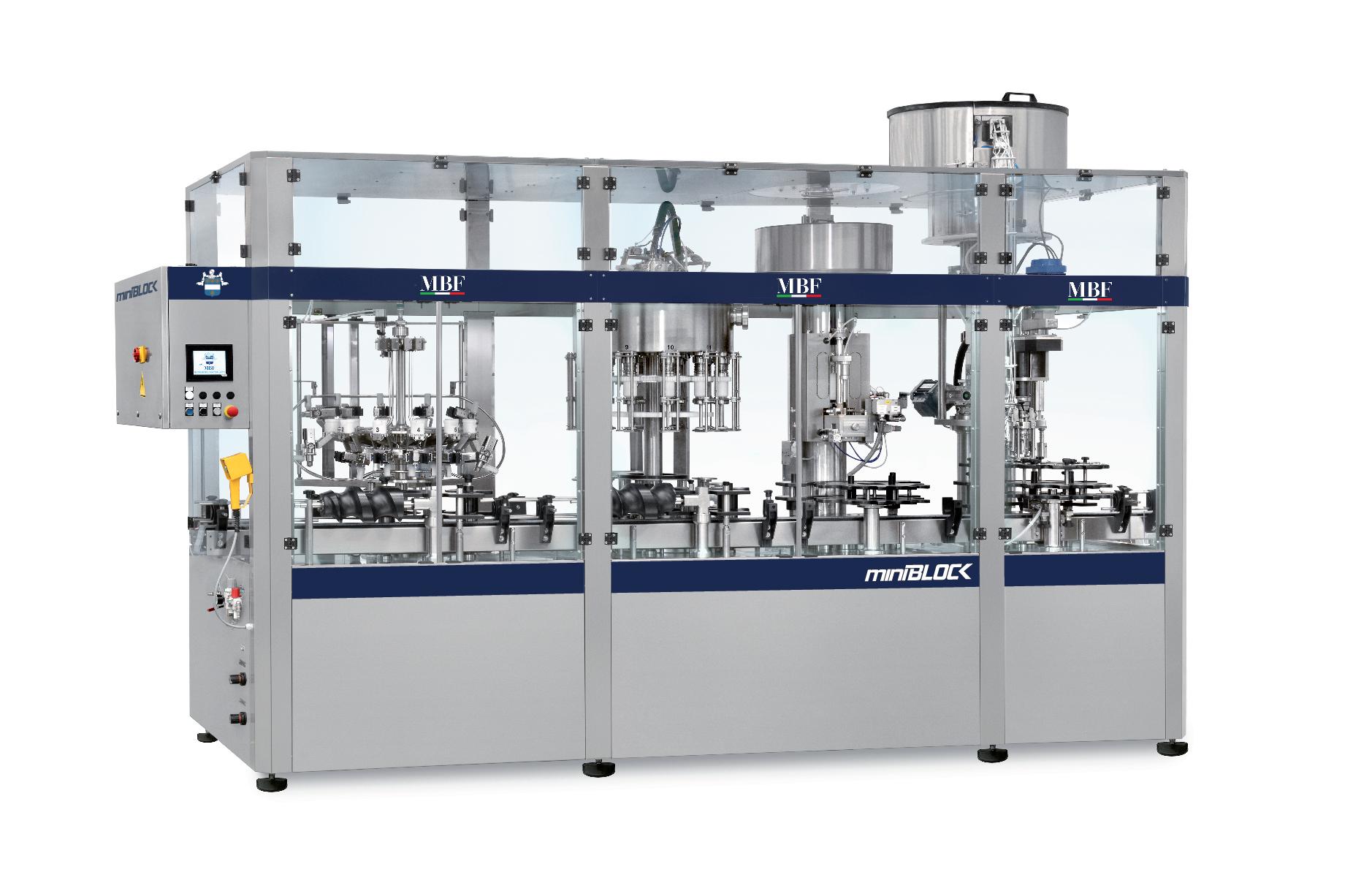
Unit 8, Fairway Business Park Castle Road, Eurolink Sittingbourne Kent ME10 3FB Tel +44(0) 1795 439222 Fax: +44(0) 1795 439444 Email: info@poly-tek.co.uk 30 day accounts available upon request THE BEER ENGINEERS • KEG WASHER • KEG FILLER • KEG WASHER • KEG FILLER • KEG WASHER • KEG FILLER • KEG WASHER • KEG FILLER • KEG WASHER • KEG FILLER • KEG WASHER • KEG FILLER • KEG WASHER • KEG FILLER • K• KEG WASHER • KEG FILLER • KEG WASHER • KEG FILLER • KEG WASHER • KEG FILLER • KEG WASHER • KEG FILLER • KEG WASHER • KEG FILLER • KEG WASHER • KEG FILLER • KEG WASHER • KEG FILLER • KEG WASHER • KEG FILLER • KEG KEG WASHER • KEG FILLER • KEG FILLER • KEG WASHER • KEG FILLER • KEG WASHER • KEG FILLER • KEG WASHER • KEG FILLER • KEG High Quality Keg Washing & Keg Filling Equipment Contact us for details USED MACHINES passion excellence f or Bottling and Packaging Solutions for the beer industry
Beer Box Shop enters new phase of development with new premises
It’s been a busy year for Beer Box Shop as the team prepare for the next exciting stage of their business development. Beer Box Shop, part of Drinks Packaging Ltd (DPL) moved into their new purpose built 18,000sqft warehouse in June and is quickly making use of the additional space.
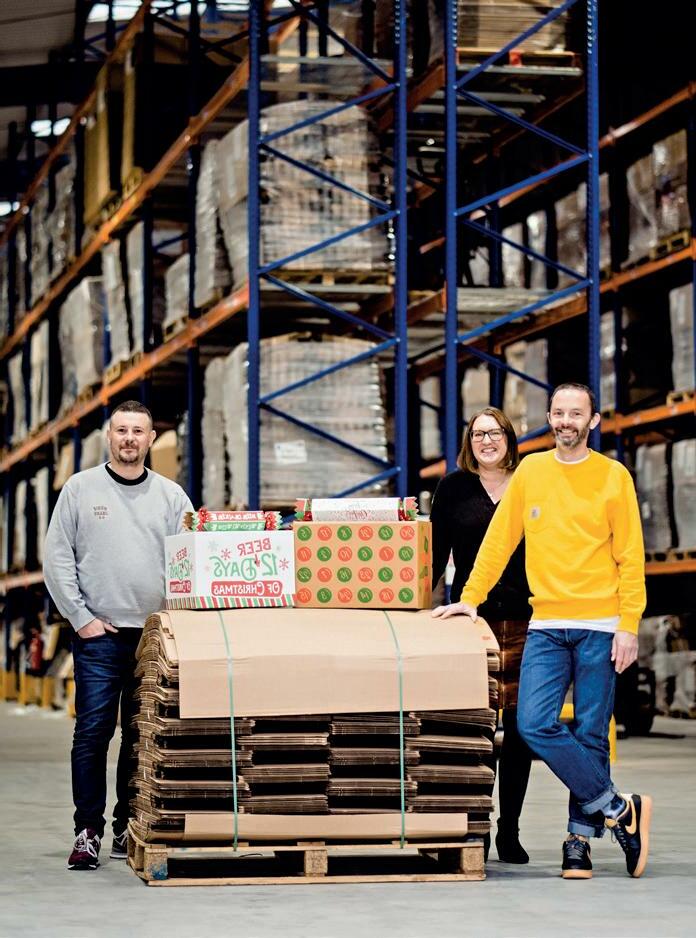
Simon Hulse, DPL Director, said: “There have been an unprecedented number of raw material price increases over the last few years which kicked-off during the pandemic due to the surge in demand for home delivery packaging. Although raw material costs now seem to be stabilising, we’re not expecting to see any reductions soon due to factors including the increasing utility costs that our suppliers are now facing.”

The additional warehouse capacity allows DPL to combat higher costs by manufacturing in much larger volumes, with all products then being held in-stock, and available to order for next day delivery through the Beer Box Shop website.
The increased capacity also means that DPL can offer storage space for its customer’s bulk packaging orders allowing them to benefit from the production efficiencies and lower costs.
Simon said: “‘From meeting our customers and visiting the breweries we understand that storage space for bulky items such as packaging, glass and cans can be a big issue. DPL can now offer a free storage facility for our customers so they can then call-off their packaging as needed.”
Beer Box Shop is continually developing new products to expand their already extensive in-stock range; this includes the launch of bagin-box, free standing pouches, and exciting and innovative retail and gift packaging.
And to support its small-medium sized customers Beer Box Shop has reduced MOQs across its range. Simon said: “We want to make our range accessible to all businesses and encourage our customers to trial new products.”
In addition to in-stock supply, the creation of bespoke artwork and packaging has
always been a key part of the Beer Box Shop proposition, and its designers have never been busier, working closely with customers to create unique and eye-catching packaging concepts. Find out more at www.beerboxshop.co.uk
Beer craft –cask x keg
Myles Pinfold from WPA Pinfold argues that cask needn’t be keg beer’s unfashionable cousin, if it would just get its branding and positioning right…
“Craft beer drinkers seem to have an insatiable appetite for new flavours and styles. The repertoire of beers on offer appears to be inexorable and yet the traditionalist cask brewers largely ignore this and stick to the same formula of ales, as if they haven’t been invited to the party. Which is ironic if you bear in mind that craft’s most popular beer style, India Pale Ale, was first brewed almost two centuries ago.
The lament of those traditionalists tends to be about the woes of cask and how craft keg reigns supreme. This differentiation is a misconception, the reality is that any brewer can play in the craft sector, it’s all about positioning – forget the ‘grandma dancing’ scenario.
The current dilemma is exemplified on visits to the GBBF and LCBF (London Craft Beer Festival). GBBF, with an age profile upwards of 45 and the champion of all things cask, was happily serving ‘live craft keg’ beers this year.
For LCBF, with an age profile largely under 45, keg dominated but cask was also available.
In both cases, for the large part, no one seemed to notice or differentiate between the two dispense formats. In fact, the reality is that the majority of drinkers, especially the younger generations, do not appreciate the difference between keg and cask – neither do they care – they are just there for the beer.
Cask has as much potential relevance to future craft drinkers as it does for the old-school traditionalists; brewers such as Verdant, Deya and Cloudwater (to name but a few) are proof that cask, in the right style and presentation, can appeal to a contemporary audience. Even the American craft brewers (who ‘invented’ craft beer) would love to brew cask, if only the bars over there were set up to serve it…
From a brand strategy perspective it is all about market segmentation and targeting, which ultimately is about the type of venue where the beer is available and the profile of the consumers it attracts – the more traditional versus the contemporary. In the world of FMCG (Fast Moving Consumer Goods) we talk about category cues and semiotics – for the on-trade, craft beer and traditional ales form their own separate categories and each have their individual language of communication and market appeal. If you saw Timothy Taylor and Dark Star on the same bar, you would have a reasonable idea of what to expect from each beer. It’s all about being fit for market and for traditional brewers there is every reason for them to brew contemporary cask beers too, as long as they are on market.
Cask needs to lay claim to its rightful place in the world of craft beer, it already has a foothold, the opportunity is there. So embrace the moment, grab those hops and other flavour ingredients and brew some shout-out cask IPAs (there are over 20 different styles of IPA out there, and counting) or whatever else takes your fancy. Just make sure you get the branding right.”
Myles Pinfold is founder and strategic director of WPA Pinfold, experts in branding for the drinks sector. Find out more at www.wpa-drinks.co.uk
www.siba.co.uk
99
| SIBA Independent Brewer | Winter 2022 Supplier news
Supplier Viewpoint
Gold members Silver members
Loughran Brewers
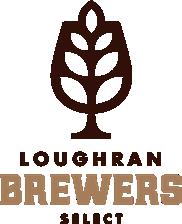
Select Ltd
Will Avery sales@brewersselect.co.uk

Charles Faram & Co Ltd
Any of the Team sales@charlesfaram.co.uk
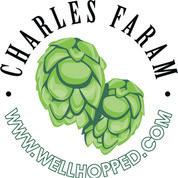
Close Brothers Brewery Rentals
Reem Mohsen Reem.Mohsen@closebrothers.com
Croxsons
Tim Croxson Tim.croxson@croxsons.com

Murphy & Son Ltd
Frances Maud frances.maud@murphyandson.co.uk
Premier Systems Ltd

Sam Williams Sam@premiersystems.ltd.uk
Thomas Fawcett & Sons Ltd
James Fawcett james@fawcett-maltsters.co.uk
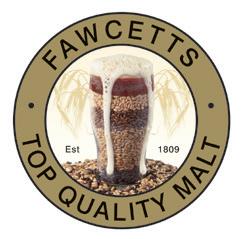
Vigo ltd

Sales Team sales@vigoltd.com
Alfa Laval
Rebecca Halpin rebecca.halpin@alfalaval.com
Anton Paar Ltd

Tertia Rimell tertia.rimell@anton-paar.com
Beatson Clark
Lynn Sidebottom Lynn.sidebottom@beatsonclark.co.uk
Beer
Box Shop
Simon Hulse sales@beerboxshop.co.uk

Breww Ltd
Max Andrew max@breww.co.uk
Crisp Malting Group

Rob Moody rob.moody@crispmalt.com
Festival Glass
Kelsey Cheesbrough sales@festivalglass.co.uk
Framax UK Limited

Elizabeth Smith esmith@framax.co.uk
IGC Engineering Ltd

Chris Hamlett chrishamlettigc@onetel.com
Kegstar
Oliver Baldwin oliver@kegstar.com
Konvoy UK
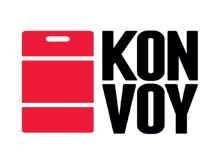
Christian Barden christian@konvoykegs.com
Lemon Top Creative
Andy Mogg hello@lemontopcreative.com

Muntons Plc


Vanessa Makings vanessa.makings@muntons.com
Napthens

James Allison James.Allison@napthens.co.uk
Pentair Food & Beverage Solutions

Debbie Larkin debbie.larkin@pentair.com
Rankin
Brothers & Sons
Jim Rankin sales@rankincork.co.uk

Saxon Packaging Ltd
Mike Impson mike.impson@smurfitkappa.co.uk
Vale
Labels Ltd
John Riches john@valelabels.co.uk
Willis Publicity
Carl Andrews carl@willispublicity.co.uk

100 Winter 2022 | SIBA Independent Brewer | www.siba.co.uk
Gold & Silver members
Quality, Consistency & Support
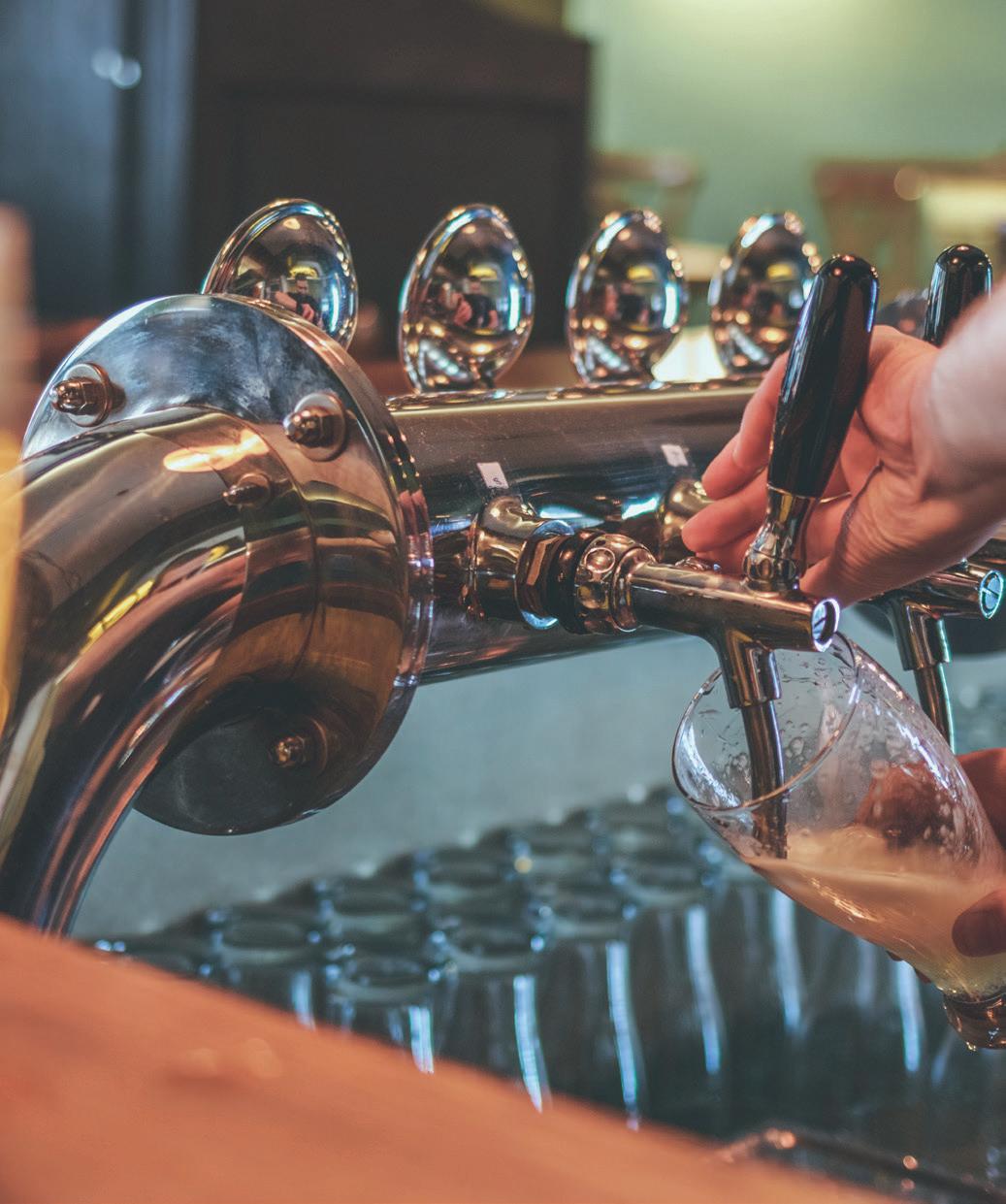


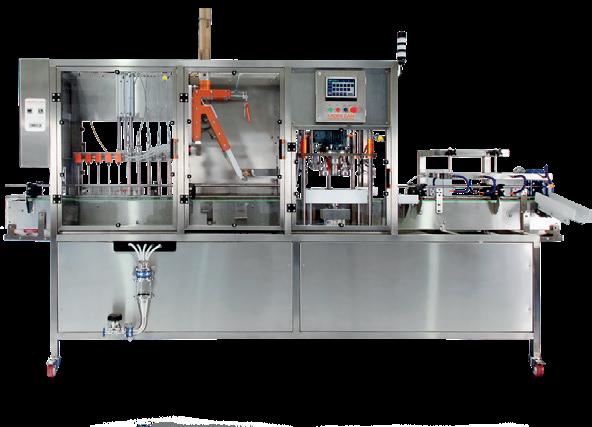
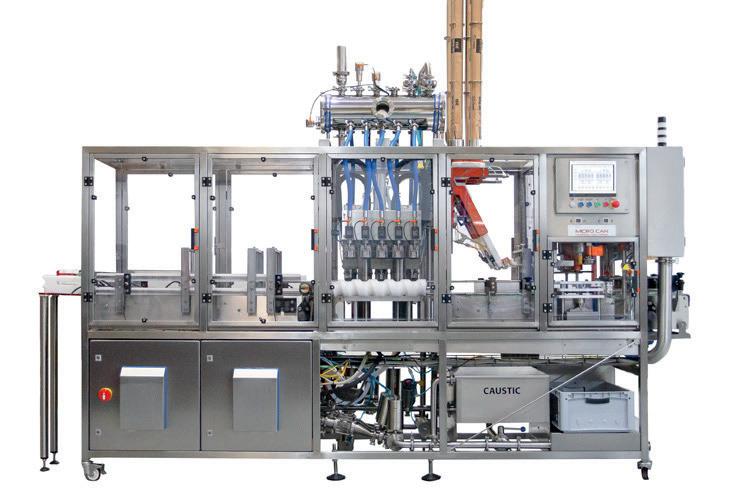

101 www.siba.co.uk | SIBA Independent Brewer | Winter 2022 SPECIALIST MASTERBREW & DISTILLERY INSURANCE Pioneering insurance packages built around the dynamic needs of the brewery industry Lower premiums Wider cover Tailored additional benefits www.russellscanlan.com masterbrew@russellscanlan com 0115 947 0032 RUSSELL SCANLAN Insurance Cover Brewed to Perfection MICROCAN SIBA HP VERT 87x 260 V1.indd 1 08/11/2022 16:14
PO BOX 136, Ripon, North Yorkshire, HG4 5WW
SIBA Head Office: 01765 640441
SIBA Team
Andy Slee
Chief Executive andy.slee@siba.co.uk
Sara Knox Company Secretary sara.knox@siba.co.uk
Rachel Harriott
Head of Membership Services rachel.harriott@siba.co.uk
Neil Walker
Head of Comms & Marketing neil.walker@siba.co.uk
Barry Watts
Head of Public Affairs & Policy barry.watts@siba.co.uk
Will Lockwood
Public Affairs & Policy Officer will.lockwood@siba.co.uk




Jenna Barningham
Membership Services Administrator jenna.barningham@siba.co.uk
Louise Henley
Membership Services Administrator louise.henley@siba.co.uk
Elle Spencer-Blanchard
Membership Services Assistant elle.spencerblanchard@siba.co.uk
Charlie Docherty
Business Development Officer charlie.docherty@siba.co.uk
All General Enquiries contact office@siba.co.uk
Board of Elected Directors
Existing members wishing to contact your regional representatives can use the relevant regional e-mail addresses listed below. For individuals, just type firstname.lastname@siba.co.uk
Acting Chairman of SIBA Richard Naisby East east@siba.co.uk
Chair Richard Naisby Milton Brewery (Acting Chair of the Board) Ian Rydings Leigh on Sea Brewery Marcus Beecher Elgood & Sons Ltd
Midlands midlands@siba.co.uk
Chair Anneli Baxter Loose Cannon Brewing Co Ltd Anthony Hughes Lincoln Green Brewing Co Ltd Tom Fownes Fownes Brewing Co
North East northeast@siba.co.uk
Chair Ian Fozard Rooster’s Brewery Ltd
Joe Joyce Harrogate Brewing Alex Balchin Wold Top Brewery
North West northwest@siba.co.uk
Chair William Mayne Bullhouse Brewing Co Paul Jones Cloudwater Brew Co Haydn Williams Crankshaft Brewery Ltd
Scotland scotland@siba.co.uk
Chair Christie Slater Consolidated Craft Brewers Jamie Delap Fyne Ales
Fiona MacEachern Loch Lomond Brewery
South East southeast@siba.co.uk
Chair Andy Hayward Thames Side Brewery William Harris Wild Card Brewery
South West southwest@siba.co.uk

Chair Paul Arrowsmith Isca Ales Ltd
Darren Batten Palmers Brewery Alan Collyer The Exeter Brewery
Wales & West west@siba.co.uk
Chair Buster Grant Cold Black Label Ltd Rob Lilford Tomos & Lilford Brewery Glenn White Brew Monster
102 Winter 2022 | SIBA Independent Brewer | www.siba.co.uk


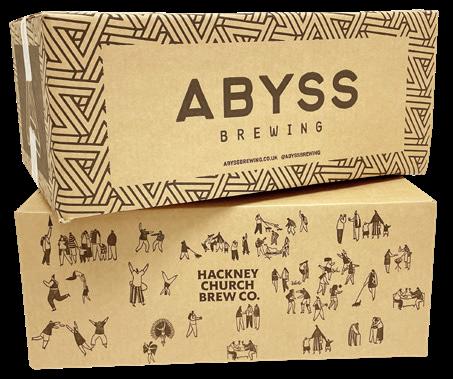
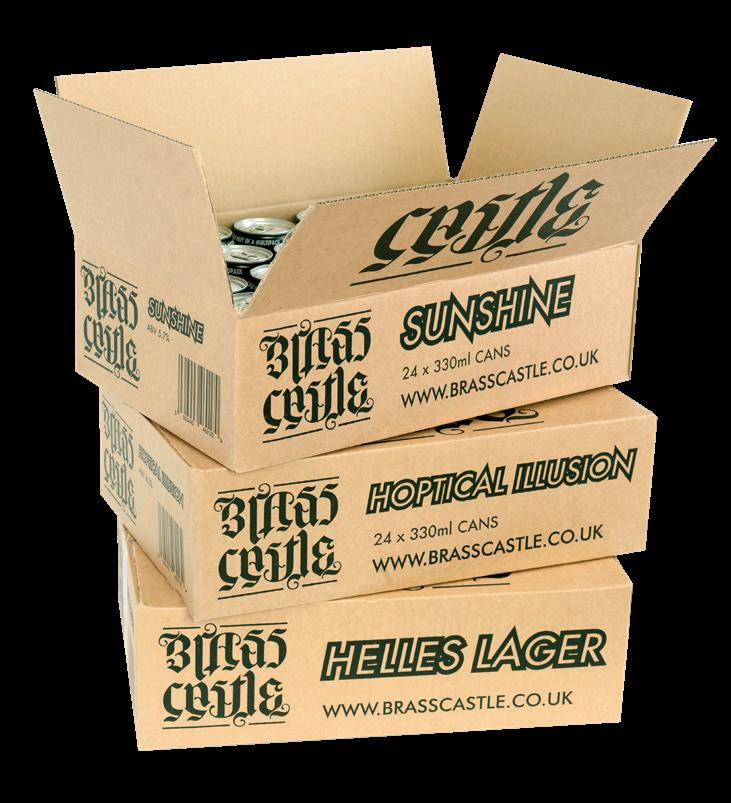




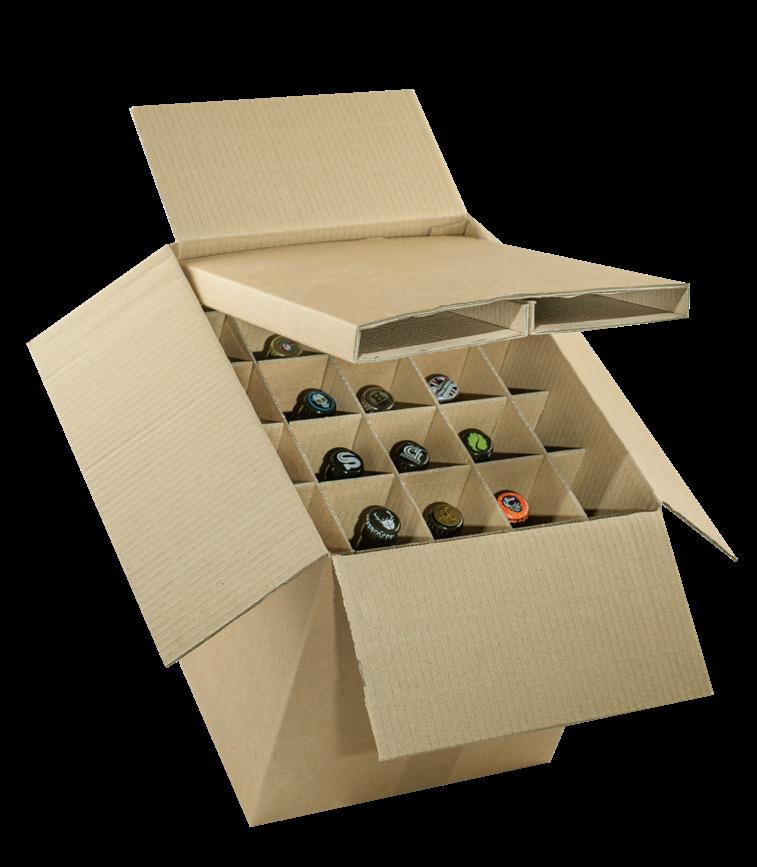
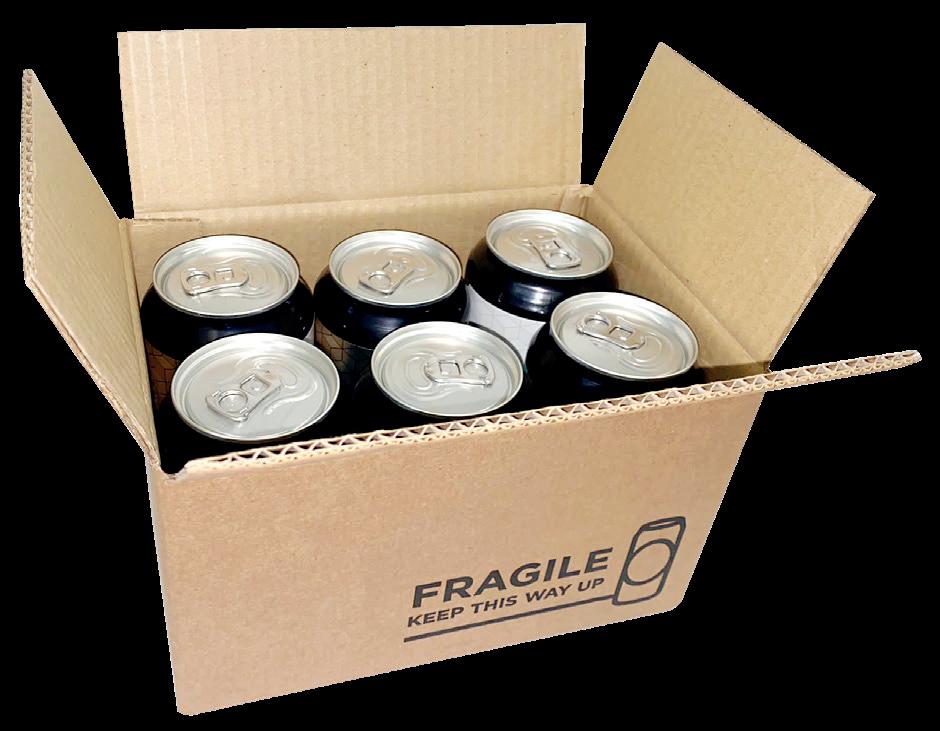

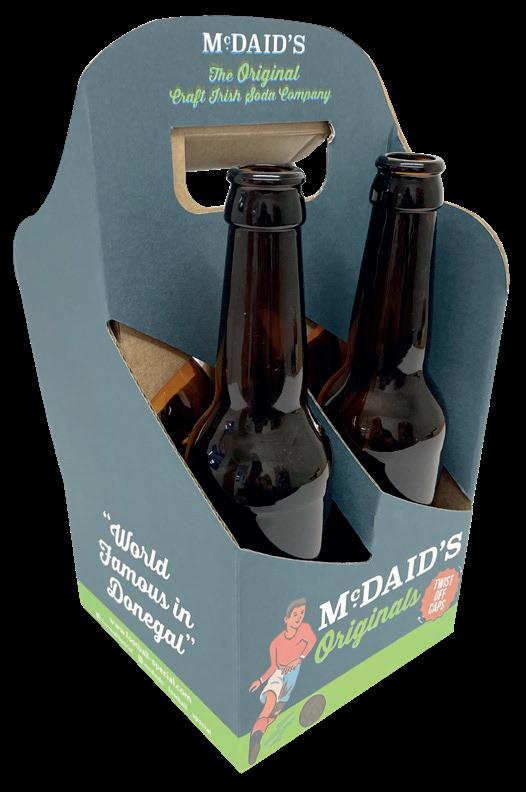



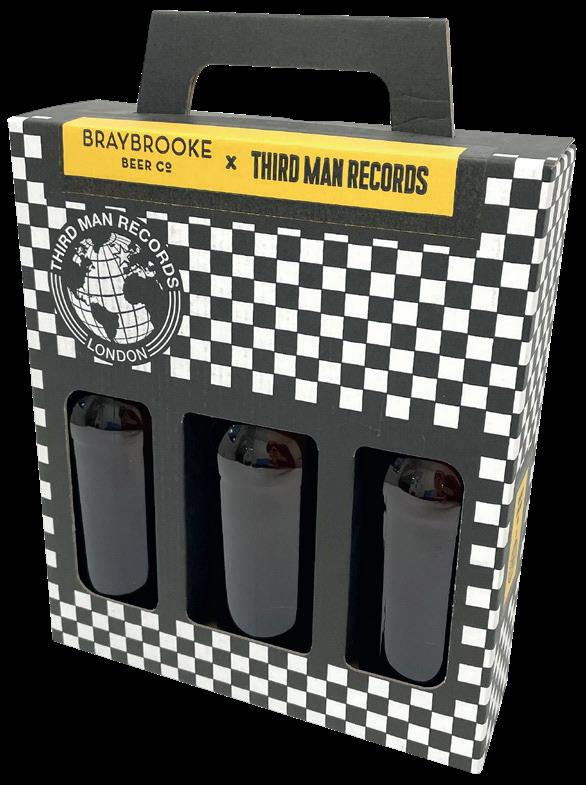



















































































































































































































































































































































































































































































































































 Gold members
Gold members


































































































































































































